#i love that humanity feels the necessity to narrate herself
Text
Literature fucking slaps. Noone is doing it like Her.
#im stupid and i keep forgetting how much i fucking love literary analysis#the way one can write pages about just one sentence nay just one capitalized letter god#i love literature#i love books#i love people who write#i love that humanity feels the necessity to narrate herself#how we found a way to express the unexpressable through written images#how you can't know for certain and in the end it doesn't matter if that was the original intention of the author since#literature is a live creature made to live and to change and to keep coming back to life and communicate with everyone that dares to read it#i love how critical analysis feels like being in a room with people and conversing with them#even if those people are dead#the barriers of time annihilated by the mere fact that the now ghosts once defied death by putting ink on a page#im rambling but i love it#despite everything the anxiety the panic attacks the societal pressure the absolutely no money situation the impossible deadlines ecc.#i love it#i love doing what i do
2 notes
·
View notes
Text
you see, the thing about Stephanie Meyer is that her books actually have very interesting themes that could've been handled amazingly if she weren't so problematic.
I won't talk about twilight because that's been discussed enough, but I'll talk about another of her books, The Host
in here, aliens have invaded the earth. The souls, as they refer to themselves, in order to survive, have to invade the body of their host, and in the case of intelligent species like us, that means basically killing the human's consciousness and invading their body. But the thing about the aliens is that they are everything that is good. They are kind, friendly, selfless, honest, and all the values one my consider good in someone. Is the contrast of their wholesomeness vs their parasitic nature that poses a very interesting question about morality.
But that's not all. The main character Wanderer, or Wanda, is a soul that lives in the body of a host, who's still present. Melanie, the human that owned the body, talks to Wanda, and the intensity of her memories and feelings of love for her family makes Wanda find something she herself says she can't find with her own. When she runs off and joins the human rebelion, she's kept alive only because Melanie's uncle suspects about Melanie still being there. And Wanda is forced to live and work in a colony of humans that absolutely hate her. For them, she represents the danger, the extinction. From a human standpoint, their hatred is justified. But Wanda is, by essence, such a kind, sweet, loving, and hard working person that she even saves the life of the same human that tried to kill her. Is this complex reflection on morality, and what makes us human, what makes this book so interesting.
And the sci-fi of it. Meyer builts an amazing narrative about the nature of the souls. Wanderer gets her name because she's been in most planets than others, and the stories about other planets are so goddam rich and interesting. A main character like Wanda is very hard to make, because you need to stop thinking like a human to do so.
Also, the take on human life??? Wanda constantly talks about how she experiences human life, and for her is a sublime experience. The take on the beauty of life, the intensity of love, the nature of suffering, the necessity for compassion, all of it narrated with such feeling is beautiful.
Honestly i hate how this book contains all this stuff with so much potential, that could make it so good if it weren't because half of the book is about a love triangle and the two main girls dating old ass man while literally being underage.
6 notes
·
View notes
Text
Thoughts on some recent rereads, includes some spoilers -
- Jo Walton, Thessaly series - This is Jo Walton’s trilogy about a group of people from throughout history trying to create Plato’s Republic with the help of some of the Greek gods. It’s very fun, and I think definitely among the best of Jo Walton’s work, though the trilogy as a whole has substantial problems, which most especially becoming glaring in the final book, Necessity.
Jo Walton’s strength is always more in concept than execution, and this is such an concept-heavy series that it plays to that strength unabashedly; it’s okay for it these to be purely novels of ideas because all the characters are knowingly living out a thought experiment, and so as a reader I can feel openly brought into that dialogue rather than experiencing myself as uncomfortably detached from the the characters or events as I did in, for example, My Real Children or Lent (Among Others is a different kind of work entirely from the rest of Walton’s fiction, to my mind, and far more embodied and emotional. Aside from that one, I think Thessaly works the best).
I got more out of rereading the three volumes all in sequence than I did in initially reading them with six months or more between each volume; the series is really developing a single set of questions, and so works better read all at once. I continue to appreciate and be fascinated with Walton’s characterization of Apollo, who serves as our connecting thread between the three books, and while I take issue with the way he is written at some points (Walton’s narration is really ineffective at conveying any sense of the numinous or mystical, which poses some problems for the way she writes gods; also, this Apollo is way too bouncy, and uses too many exclamation points), his overall arc is fascinating and are some little details that I treasure (Apollo always turning into a dolphin to swim is one of them).
Many of the other protagonists (Maia, Simmea, Jason ) are sympathetic and easy to engage with - fundamentally good people grappling with hard questions and trying to do their best. The idealization of Simmea after the first book as the ideal embodiment of the city’s ideals grates a little, and rings awkwardly, but it’s workable. I think the centering of the issue of consent and volition is smart and meaningful, though I think Walton loses the thread at times and also is totally unwilling to engage with the viscerality of trauma and violence in ways that detract from this exploration particularly glaringly in the second book, The Philosopher Kings.
There are places where you can see Walton’s fun with her own ideas getting the best of her, and messing up the structure of the narrative; I think this is most obvious in Pico della Mirandola’s plot line, which had some fascinating threads to it but appeared largely to be a dialogue Walton was having with herself (and maybe with Ada Palmer) that I as a reader wasn’t fully let into (while should I care this much about Pico? why does Athena care about him the way she does?). Some important moral and ideological questions are either resolved too easily or completely dropped, and a few important ones (particularly around race) are just never addressed at all. Necessity falls apart on the level of narrative structure - the plot has the flat lack of dynamism of a late 90′s CD-ROM game (travel through history and collect all the pieces of the manuscript!) - and for some reason Walton is unwilling to actually engage with the traditional sci-fi tropes (first contact, alien-human interactions) which she so intriguingly includes. But I at least was invested enough by the time we got there that the series didn’t lose me, even as I got frustrated with the clumsiness of the plotting.
Despite its occasional messiness, I would recommend this trilogy, particularly to classicists and most especially to ancient philosophy people, most of whom could use the exercise of seeing the playful and loving way Walton engages with Plato. There’s also something very comforting about reading well-intentioned people earnestly debating ethical questions, which was particularly poignant for me as I reread it in mid-January this year. I expect I will continue to return to these.
- Philip Pullman, His Dark Materials - I reread this in preparation for beginning Pullmans’ new Book of Dust sequel/prequel trilogy, and also in conjunction with watching the tv adaptation. It had been a very long time - I think when I last read them I was barely older than Lyra and Will. It was fascinating to see what I remembered and what I did not, what held up over time. My younger self was primarily interested in the witches, and in Asriel and Coulter’s relationship, and I was pleased to find myself still so much in accord with my younger self’s priorities (also, from my vantage point now, the witches come off as very queer, so, there you go, younger me). The witches are still awesome, and all the Asriel/Coulter material, most especially in Amber Spyglass, is wonderfully thrilling. Ah!
There are lots of problems with the world-building. Amber Spyglass seems to get most of the blame for that, but I think this is unfair; the problems were right there from the beginning in Golden Compass, but with Amber Spyglass being the most ambitious (and to me, the most interesting) volume, it’s where they become most glaring. I do think Pullman isn’t very sharp in his gaze on religion and how it functions and why people find it meaningful and how it can get coercive. In this area it is difficult to extricate the series from the controversy it engendered at its publication, which I was very aware of and which interacted in very specific ways with the nature of my upbringing (which was very Pullman-aligned, and which, when I first read the books, wasn’t meeting my needs in some very specific ways). However, I still find the Magisterium entirely unconvincing.
Will and Lyra remain moving; some of the most incisive and emotional moments in the books are when Pullman reflects on the impacts of each of their unmet attachment needs in Subtle Knife, Lyra’s double-bind of needing to fear her parents, Will’s of needing to fear for his. This feels psychologically truthful and moving and is one the real true hearts of the series. The ending remains as sour and wrong for me as it ever was; it feels to me like Pullman is giving in to the ghost of C. S. Lewis in all the worst ways. Having now read the first two volumes of The Book of Dust, I think Pullman has written himself into a corner now that he can’t get out of.
Returning to Mary Malone from adulthood and a much more thorough understanding of science fiction as a genre is lovely. She could be a character from Cherryh! The writing of her own process of thinking and discovery appealed to me very much when I first read the books, and I realize this is the same thing that I would love so much in Rosemary Kirstein’s Steerswoman series, though for Kirstein of course this whole thing becomes the joyful focus, the emotional center. We don’t get enough of the adults in Pullman’s books, particularly Malone and Coulter and Asriel; this is an area in which the tv show seems to be improving upon them. But it was good to come back to.
- Naomi Novik, Spinning Silver - I reread this because we were in the middle of a beautiful snowstorm and I wanted to keep reading about winter. Perhaps I was feeling particularly indulgent because of the gorgeous synchronicity between the text and the natural world around me, but I just found it a joy to reread, and a lot of the things that didn’t land for me the first time (the denouement of Wanda’s plotline, the expansion of point of view characters midway through) worked much better for me on reread. The importance of the more secondary narrators (Stepon, Magreta) was clearer, and I in fact found their sections very gentle and moving in a way I did not anticipate. It’s a much stronger book than Uprooted, much more tightly woven and effective.
The absence of sexual feeling between the women still feels like a curiously glaring absence, like something that would upend the whole structure of the plot if it could be seen directly. This lands differently, though, than it does in Uprooted, because Spinning Silver is actually a curiously non-sexual book altogether, despite its two central and fun villain/heroine romances.
Speaking of which, the novel is an interesting study in the villain/heroine romance, and Novik gets to say some interesting things about the trope but putting two contrasting ones next to each other as she does. With Irina and Mirnatius we get the trope most common in recent fantasy, and specifically in YA, where a man is seen as villainous and despised by the heroine until she obtains new information which shows him to be less in control of his actions than she previously suspected, and in fact himself in some way a victim. This is what happens in Holly Black’s Folk of the Air (which I rather liked), and Renee Ahdieh’s The Wrath and the Dawn (which I hated); it ends up being the Beauty and the Beast story, most of the time.
With Miryem and the Staryk Lord we instead get a story where the villain is operating according to his own, very particular and alien code of morality, and it is as the heroine comes to understand it more that she can begin to feel respect and affection for him. I am always much, much more interested in this story variant, and so I am grateful to Novik for demonstrating the difference between the tropes so clearly. I like that, in this variation of the trope, everyone maintains their agency, and it is possible for the villain to be meaningfully accountable for his own actions. (It’s also, of course, a relatable fantasy for more reasons that are more personally specific to me.) In Spinning Silver, the relationship works as well as it does because Miryem also operates according to her own very particular personal set of values around debt and repayment, and though these values and those of the Staryk Lord do not always accord with one another, they can at least meaningfully dialogue around them. I am fond Irina and Mirnatius, but I’m never so invested in them, and interestingly I think Novik isn’t so much either, given how abruptly their plot line is dropped in the novel’s ending.
It’s a lovely novel, imperfect but a joy.
19 notes
·
View notes
Text
[Spoilers for The Haunting of Bly Manor!]
I know everyone is super loving Bly Manor cause ~80′s gays~!!! but some stuff about it sat really bad for me so I’m gonna try to verbalise it. Obviously if you loved it and aren't vibing with a critical analysis I'm not offended if you don't read lol. Also I’m not trying to say that there’s anything wrong with liking it! I just...didn’t, and I want to think about why, for a sec. (Sorry this got a bit long)
I think part of my problem is that I count Hill House as one of my favourite shows ever and I had ridiculously high hopes for Bly Manor, which probably couldn't ever have been fully realised. And there was actually a lot about it that I liked, especially at the begining. I thought the kids were great, and I loved the core group of Mrs Grose, Owen, Dani and Jamie. I liked the fact that the Henry Wingrave element was expanded upon, and I liked the complexity of Rebecca and Peter, and the room it gave them to be fully realised human beings. I quite enjoyed that they kept to the Hill House ghost mythology - that ghosts are lost in time but fixed in place, and that they jump from memory to memory, and haunt the people that they care about without knowing. But there were lots of things I wasn't so keen on...
Until the last episode my issues were mainly that it felt a bit...lazy? I can't stress it enough but the british accents were really really bad. Old!Jamie’s accent was deeply unbelievable and jarring, as was Henry Wingrave's, and although Peter’s accent was passable (I assume because the actor is English and not American like the others) it still didn’t match his mothers, or his ‘background’ - i.e. it sounded like a private school Edinburgh accent, not a Glasgow kid dragged up through poverty in the scheme - and yes there is a significant difference in those accents. I appreciate there’s a degree of privilege at play here - I’m used to the BBC producing high quality television where these details aren’t messed about with, and the production of Bly Manor was thoroughly American, but to put it in perspective, it would be like... if a character had a deep south dirt-poor Louisiana upbringing and spoke like somebody from a private school in Virginia. Other details also felt off - Rebecca’s costumes all seemed weirdly 2020-adjacent, none of the fashion or ancillary details seemed to match the UK in the 80s (which has a distinct feel), and the house that Peter returned to on his ‘memory bumps’ looked much more like an LA condo than a Scottish council house. Really, they should have just set it in America, because it felt more American than British, and they clearly didn't have any British people involved in the production.
I really didn't enjoy the narrative framing device of 'someone telling a story to a group of people at a party'. It makes sense in the Turn of the Screw, because the narrator is reading from a document written at the time of the events, so the narration becomes a first person one where the degree of detail is logically accounted for. In this take, the story alternated from being one which made sense - us just watching the characters move around normally - to one in which 'Jamie' (who’d apparently had a complete personality transplant that had turned her from a feisty northern lesbian into a coy, mysterious victorian englishwoman with a severe accent problem) adopted a falsely old-fashioned manner and told the wedding guests a ten hour long story about a haunted house. And somehow neither Flora nor Miles recognised any part of this story in the least, in spite of what must have been overwhelming similarities? It was very jarring.
I also kept waiting for a twist on a level with Hill House, but never got one. The big twist about Mrs Grose was, I thought, obvious from almost the first episode. I mean the woman didn’t eat or drink anything and spent most of her time confused about where she was, I thought it was fairly clear that she was a ghost. And yeah, I suppose because I’ve read the book I was never in any doubt that Peter was already dead. The ghosts in the background were much less spooky than in Hill House. They stood around in broad daylight while the characters talked and joked and it kind of felt like the ghosts had wandered in by accident and felt too awkward to leave. I really liked how spooky Hill House was - even apart from the jump scares I thought the psychological elements and the open discussion of death and grief was really affecting. I didn’t feel that at all in Bly Manor, and by the time we found out the details of Mrs Grose’s death, I’d already come to terms with it. But all of this would have been fine, if it hadn’t been for the last episode.
I really really didn’t enjoy the bury your gays ending. And I’m not even usually against this in principle! I think in a dark/horror context, where there’s implied to be an ever-present threat of character death, it’s unreasonable to expect that no characters will die or experience tragedy - and in cases where there’s abundant LGBT rep some of those characters will by necessity not be cis/straight. So I don’t have a problem with gay characters meeting tragic or dark ends, as a general rule, particularly when it serves a narrative purpose and isn’t gratuitous. My problem here was in the manner and necessity of that death.
There were ways in which Dani could have died in this story that I would have felt were narratively meaningful and cathartic, but the manner in which she did die failed to hit those beats for me. This is a story in which two women in the 80's fall in love and are doomed by the world around them (we're already in Meryl Streep 'groundbreaking' territory here, in terms of metaphor). They know death is coming for them, that it will likely destroy them both, that they won't have an opportunity to grow old together, that eventually one day it will catch them and everything will be over - they're on borrowed time, and they spend a lot of that time looking over their shoulders waiting for shit to break bad. In the end, they're destroyed by a force in Dani's body/mind that she can't fight, that she can't win against, and the spectre of which haunts her through the years. Like... the obvious parallel here is mental health, and suicide - they even go out of their way to feature that classic heartsink moment with the overflowing bath. And to me, any story that has a message of 'no matter how strong you are, no matter how much love you have and give, or how beautiful the life you've built is, eventually the dark forces in your mind will Get You and it'll probably be before you make it to middle age' is... really shitty. The other echo that struck me was the HIV/AIDS crisis - obviously wlw were relatively spared from this, in comparison to mlm, but it still carries a cultural legacy of pain and trauma, and I really didn't need this show to grind down on that for me.
And the thing is... in the original story, the governess doesn't even die! Miles does, so maybe there's an argument here that Dani sacrificed herself in exchange for Miles's life in this retelling, but I'm still struck by this element of, like... they added this in! They chose to do this! Only one character dies in the course of this show (with Mrs Grose dying before the show starts) and it's the gay woman?? Why?? What did it show?? Why was it necessary?
Not to mention, the 'epilogue' scene paints Jamie as being very lonely and isolated. I'm not sure why the children didn't recognise ANY elements of this story from their past - even assuming they forgot the ghostly elements of their childhood, they should be able to see the similarities in the characters, but the scene also seems to imply that Jamie really isn't very close to Miles and Flora, and that she doesn't even really get to have a relationship with them as adults, in spite of losing everything to protect them, and not having any family of her own.
Almost everybody else gets a happy ending, but Jamie ends the night of the epilogue standing alone at a table, with the love of her life dead in a cursed lake, doomed to spend eternity watching over a crumbling house, and idk to me? that kind of sucked.
#the haunting of bly manor#bly manor#the haunting of hill house#hill house#bury your gays#spoilers#long post
40 notes
·
View notes
Text
sigh. season 3. here we are.
i watched the first five episodes and... i felt so uncomfortable. it was bad. not all bad but... pretty bad. so bad, that it wasn’t enjoyable for me and i didn’t care to watch it all the way through, so i read other spoilers and i am not sure if i will watch the final season. but with it being said that i did not watch the whole thing, this can’t be a full review. so, here comes my first glance. spoilers obviously.
instead of weaknesses and highlights, lets just say likes and dislikes. likes first.
LIKES
- tyler’s storyline. last season, i was skeptical of how they would handle his rape and emotions about it, but i am relieved they gave his character proper care and devin druid did a magnificent job. my only gripe is that i wish they had him do something other than boxing to channel his anger. like, i understand why he would be learning self defense but i would like to see him do something less violent??
- jessica’s reclaiming of her body. at first the whole intro to the sex toys was weird but it actually was really touching (no pun intended) to see jessica begin to love her body and love sex again after what she’s been through. also, female masturbation is so underrated. nice to see it encouraged. know your bodies, ladies.
- the classic jensen tour. i’m surprised they still allow him to do the tours. like, none of the exchange students from the last time reported him? oh.
- chloe and the abortion. as a character, i don’t care for chloe, i’m sorry. she’s not a character to me, just a plot device. also, she gets no cookies for lying for bryce in the trials (i know abusers and victims have a twisted dynamic and that’s why that happened but nah chief) but i do like how they showed that some pro-life clinics will mask as abortion clinics and manipulate women into coming and trying to get them to keep their babies. totally real and fucked up.
- bryce was held socially accountable (kind of) and i think that makes an interesting point about rape culture. in the real world, jail doesn’t scare men in power because they can buy their way out. they don’t care about women and what they feel, obviously. what’ll really fuck sexual assaulters up is when they have no friends and no one likes them. that’s what they (kind of) showed with bryce this season. and he died which, yes fucking rad awesome wow.
- i know that justin also had a kind of darker storyline (with seth, i think? you can tell me if i’m wrong but don’t be rude) but he was a lot of the comic relief it appears and brandon flynn was great at it.
- alex and jessica broke up. hallelujah.
- justin is a abuse survivor. makes sense with his background.
- monty died too AND went to jail. cool amazing beautiful.
- tony is still ferociously loyal and apparently there was a scene where clay and tony said they loved each other. rise clony. rise up from the ashes.
- “i write fanfiction” - clay jensen.
DISLIKES
-ani. ani, ani, ani. i can understand why people find her annoying and she was probably the biggest reason i was uncomfortable watching but i didn’t hate her. she just... didn’t make sense. the things she did,the things she said, how she was involved and everyone just takes to her and loves her immediately, no questions asked, no buildup necessary... none of it felt natural or believable. a new girl comes in and it’s just a coincidence that clay gives her a tour and she decides to go up to jessica and says shes amazing and lives in bryce’s house and connects herself to the house of horrors that is the tape club (which was so dumb on the tape club’s part by the way, as she could have snitched and destroyed them all) instead of just finishing out her high school career in peace considering she moves around a lot and she starts college in a year and half and probably won’t talk to any of them after that. no, she’d rather potentially go to jail for a bunch of fucking strangers and criminals and rapists. sure, okay.
and for someone who just fucking got there to basically insert themselves in the traumas of these kids and make things worse in some respects and do some fucking shitty things (not listening or caring when she heard about bryce being a GODDAMN RAPIST, accusing jessica of SLEEPING WITH HER RAPIST, accusing clay of being the killer, yelling about chloe’s pregnancy in the street, the list probably gets longer) and think they’re allowed to pass judgment when THEY JUST FUCKING GOT THERE. LIKE, WHY IS SHE SO INVESTED? WHAT DOG DOES SHE HAVE IN THIS FIGHT? DOESN’T SHE NEED TO STUDY OR SOMETHING? WHY IS THIS MORE IMPORTANT THAN ANYTHING ELSE SHE HAS GOING ON IN HER LIFE?
now, i get what the show was trying to do here. they wanted another, fresh perspective/narrator and i guess a love interest for clay (a wayyyy too convenient love interest, ‘she loves robots and drawing and not minding her business too! swoon!). but they could’ve had both of those things without adding someone to the payroll. honestly, i don’t think they needed a narrator at all but if they really wanted one, they could’ve added an ACTUAL ADULT detective, with no biases so they can be completely reliable to the audience and their investment would be justified. for love interest, yall already know how much i love and miss sheri. she could check clay without sounding patronizing and had chemistry with him and actual nice, romantic history. she could have been his second cop and they could have reconnected and become a couple and... we could’ve had it all, rolling in the deeeppp.
it’s like with ani, the show wanted to kill two birds with one stone but they missed them both and i think the backlash on her character says it all. i’d just like to remind everyone to give the actress who plays ani respect and courtesy because it’s not her fault.
- was it just me, or does it seem like the tape club has learned nothing from what they went through? they’re still keeping secrets and trying to hide shit and keep it all inside and i’m like..... but.... this behavior is what got ya’ll fucked up in the first place? and i totally understand it’s about protection and whatever but.... it also feels like an excuse to not be held accountable for wrong doing. like, alex killed bryce. although he had all the reasons to do it and i’m glad he’s dead, he killed someone fam. that’s not okay. and his dad is wrapped up and it’s just... i just... i dont know. then, there was the whole “let’s not tell on tyler so he doesn’t go to jail” thing and i have mixed feelings about that. i think they should’ve turned him in and got clay’s mom to rep him for rehabilitation and therapy instead of a jail sentence. they’re hiding the guns and trying to trust tyler and luckily that worked, but how long? what if someone fucks with him again and it’s too much for them to help him with?
- speaking of help, clay needs it. oh my god, does that boy need it. they were so focused on getting tyler professional help but, clay’s out here putting guns to his head and having night terrors. he needs therapy more than anyone. honestly, what i would have liked to see, wayyy back in s2, is as soon as justin saw that, he wouldve went to clay’s parents and got him back on his meds and seeing a counselor. he’s been through so much trauma and guilt and he’s tired of his own fucking hero complex. it’s enough man.
- they tried to have their cake and eat it too when it came to clay stopping tyler from shooting up the school. they tried to be like, clay shouldn’t have done that but oh, he was so brave and what a great guy he is for doing that. no, that doesn’t work. clay should not have confronted tyler in that situation. period.
- zach was disappointing because i agreed wholeheartedly when he said that they should have called the cops but... he didn’t. he was blaming them for letting tyler go free but he was too. damn, zach.
- it’s like they give clay a new lackey every season and.... ok, i guess.
- i also thought it was kind of weird that after everything they’ve been through, they still walk on eggshells with each other? like i guess because now we’re dealing with murder but... i would think they would trust and care for each other a lot more than to accuse each other and spy and interrogate and not just simply ask... like... this season made me not understand the tape club’s relationship. like are they friends? allies? allies trying to be friends? friends out of necessity? do they know?
- bryce does not deserve to be humanized. that’s all.
- monty does not deserve to be humanized. that’s all. also, it’s so disappointingly predictable that he’s closeted.
- the new characters (ani, caleb, chloe, winston, cyrus ) i still don’t care about. plot devices, all.
i may edit and retract some things, should i decide to watch all the way but i’m tired.
#13rw#13 reasons why#clay jensen#ani#bryce walker#alex standall#zach dempsey#jessica davis#justin foley#tony padilla#monty de la cruz#chloe#sheri holland#13rw spoilers#13 reasons spoilers#clay x ani#s3#13 rw#jessica x alex#jessica x justin#clony#tyler down#ani achola#deputy standall
324 notes
·
View notes
Text
The Role of “Hate” in Pluto
I have just finished Pluto and one of the things I found the most interesting about it is how it explores the concept of “hate”.
The ending is very clear in its condemnation of it:
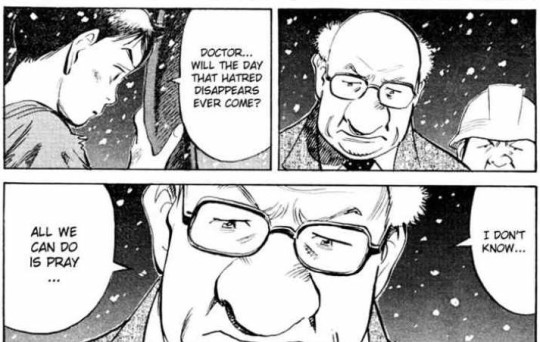
However, more than this, what I find fascinating is how the story arrives to this point and what this conclusion means. As a matter of fact hate and other negative emotions like sadness, anger and grief are all portrayed as very human emotions which are very common and difficult to avoid. So, this meta will try to explore this idea further.
Pluto is a retelling of one of Osamu Tezuka’s stories which is called The Greatest Robot on Earth.
Because of this, I think that a good way to go at it when analysing it is to ask ourselves what the greatest robot on Earth should be like.
This is professor Tenma’s answer:
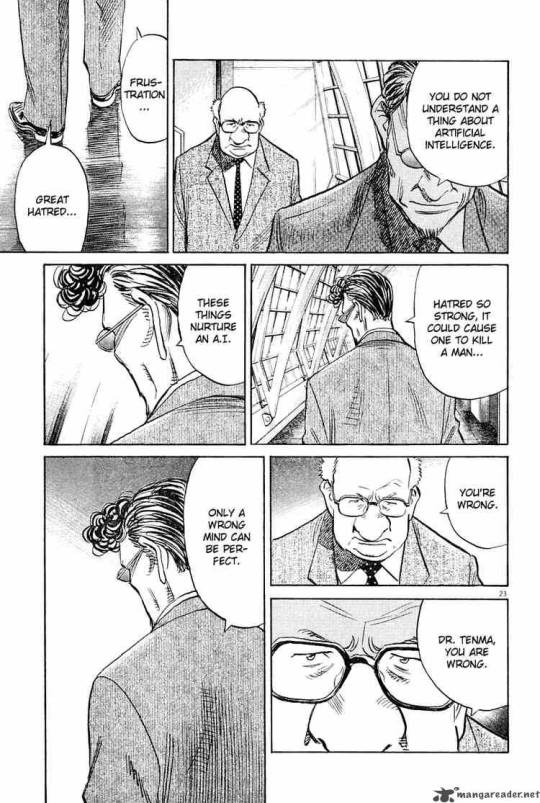
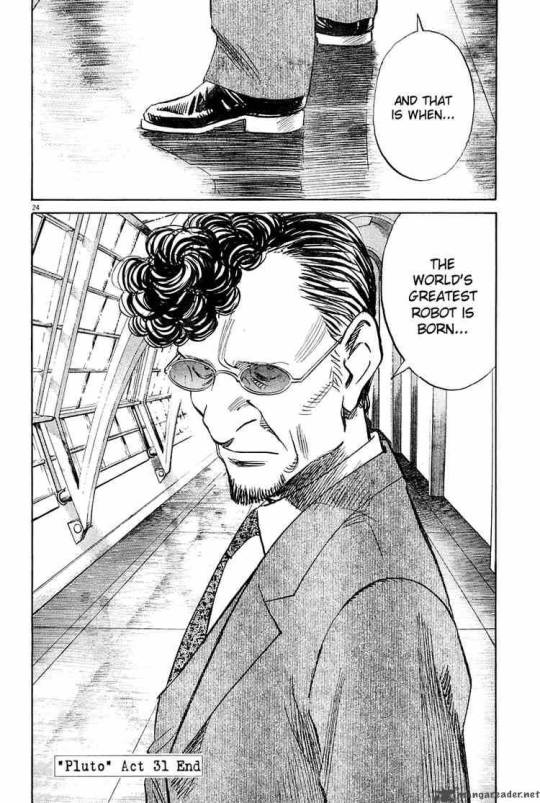
As a scientist Tenma wants to recreate human nature through an AI. Humans hate, feel sadness and lie, so a perfect robot should be able to do these things as well.
Let’s underline that this idea which is fully expressed by Tenma is prepared throughout the narration in several ways far before Tenma makes it explicit.
For example, Brau 1589 states that no malfunction has been found in his AI. This is because him killing a person does not make him less perfect, but actually better than other robots because it makes him closer to a human. This is once again clarified by Tenma when he visits the robot:
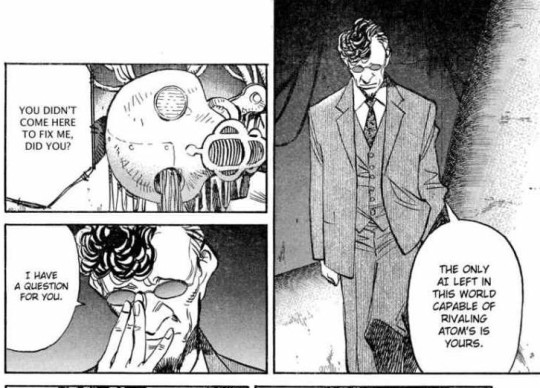
Similarly, Atom says something interesting here:
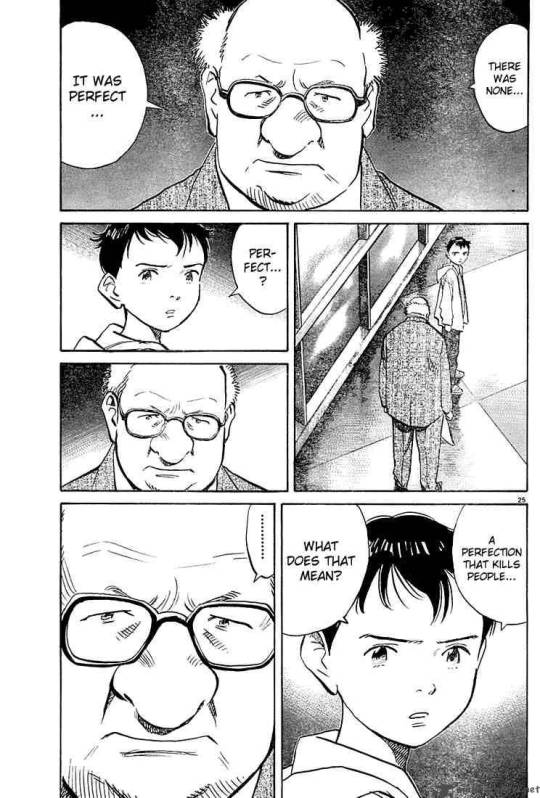
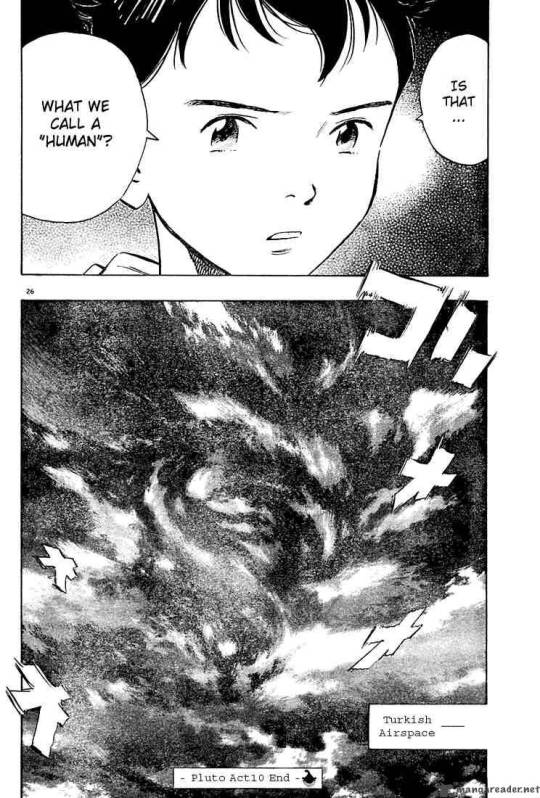
On a less darker note, the narrative offers several examples of minor human weaknesses robots are not supposed to share:
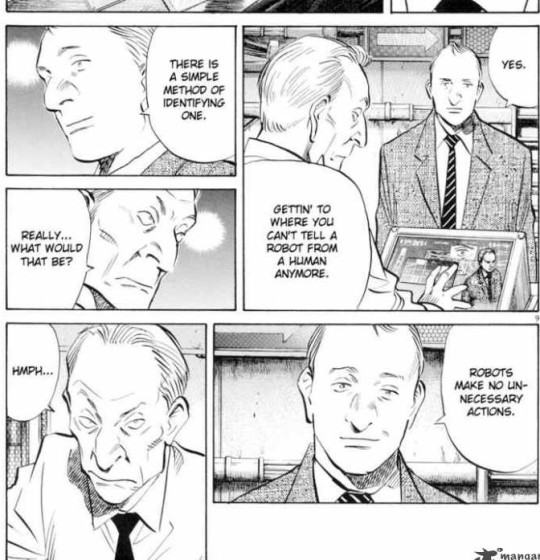
In a conversation he has with Gesicht, Hoffman states jokingly how a robot who skips work could be considered progress. This is perfectly coherent with the ideals embodied by professor Tenma’s character.
This idea might seem to endorse a pretty negative perspective of human nature. This is certainly partially true given Tenma’s cynism and his status as a person who has escaped from society and so who avoids interactions with other human beings as much as possible.
However, when it comes to Tenma, I think that what he thinks about hate and human imperfection is something a little more complex than that:
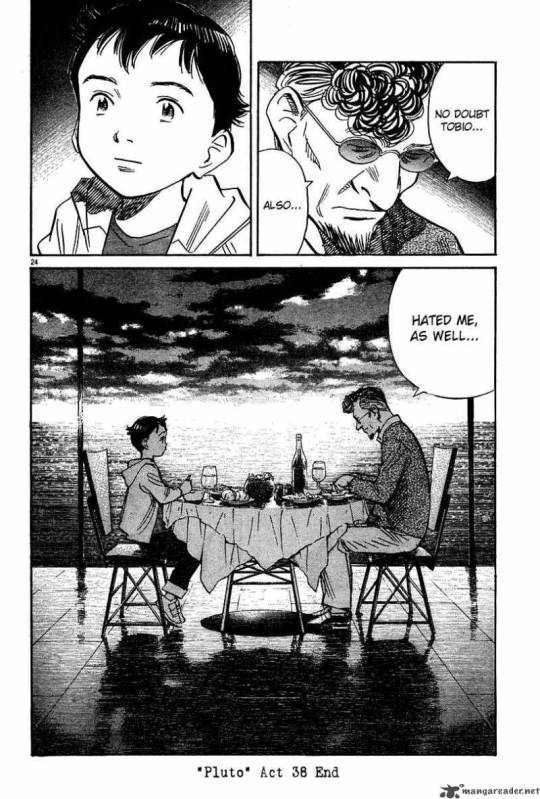
Tenma created Atom to somehow “resurrect” his son who died in a car accident. However, he soon realized that Atom was not Tobio. First of all he does not mature like human children do:
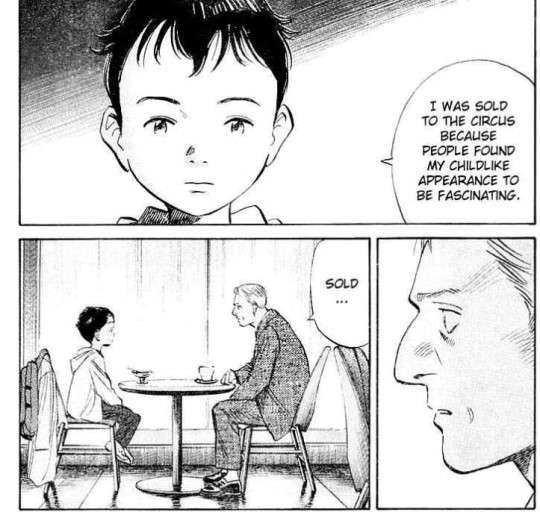
Secondly he doesn’t share Tobio’s feelings and imperfection. He can try to imitate them, but when it comes to a feeling as complex as the one of hate he doesn’t know what to reply to Tenma.
So, for Tenma the negative traits which made Tobio human are the ones he misses the most and Atom lacking them is why he decides to sell him and to leave him behind.
This is to highlight how Tenma’s vision of the world is not simply one driven by scientific curiousity and a sense of nihilism. Those two are aspects definately present in him and they make up a great part of his personality, but they are rooted in Tobio’s death and in Tenma’s inability to overcome grief:
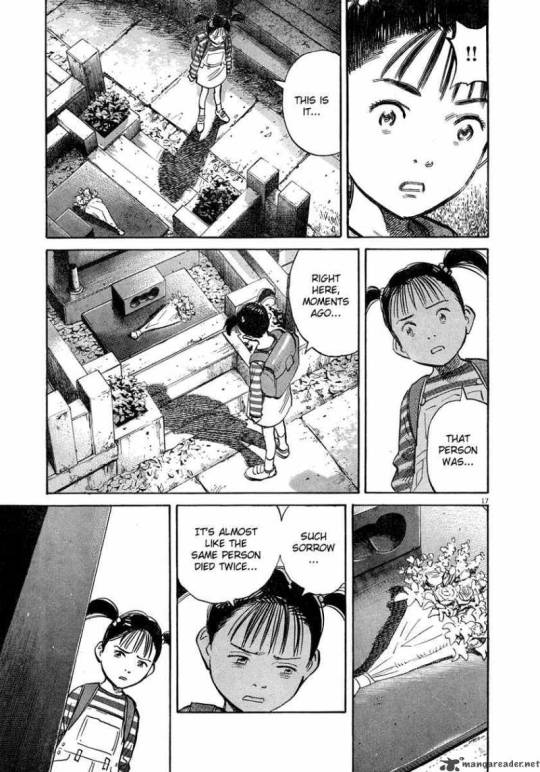
This is made clear by Tenma’s reaction to Atom’s death and to his willingness not to respect any moral or scientific bounds in order to have him back:

Here Tenma is doing something very similar to what he did when Tobio died. He chooses to do what he can to bring his son back even if he knows that he might be giving birth to a demon.
This is important when we consider Gesicht’s story and his role.
Gesicht, like Tenma, is a father who lost a son in a horrible way. His reaction to this loss was pure anger and hate for the child’s killer. The hate was so strong that motivated him to kill a human being despite this going against the robotic laws. It is obvious that if one takes out the fantascientific setting the situation is already one with which we can empathize. Gesicht is portrayed as a very moral person. This is no surprise since he was programmed to be a robot cop. However, when a great injustice hurt him personally he gave in to revenge and broke the law. This is the core of Gesicht’s character and his struggle.
This is important for at least two reasons.
1) The first one is that Gesicht killing the man out of hate is relevant when it comes to his and Mr Haas’s subplot:
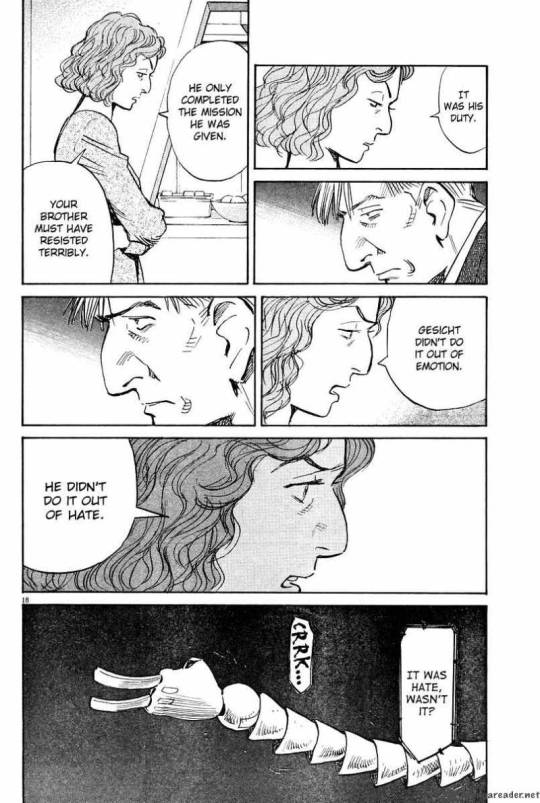
Mr Haas’s wife suggests that Gesicht (being him a robot) could not have killed Haas’s brother motivated by such a negative feeling as hate. She argues that what happened must have happened out of necessity while Gesicht was trying to fulfill his duty.
The idea that robots not having emotions can be considered something which makes them better than humans is touched on several times. Here is an example:
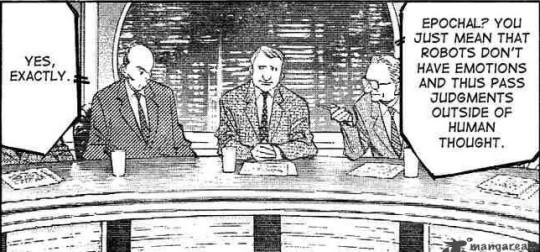
A judge whose judgment is not clouded by emotions can be considered better than one who can become irrational due to feelings.
In short, it seems logical to think that Mr Haas’s anger towards Gesicht would be misplaced if the robot killed without hate and justified if the robot killed with hate.
However, this is not how things play out in the end.
As a matter of fact it is specifically the fact that both Haas and Gesicht acted moved by hate that lets them understand each other:
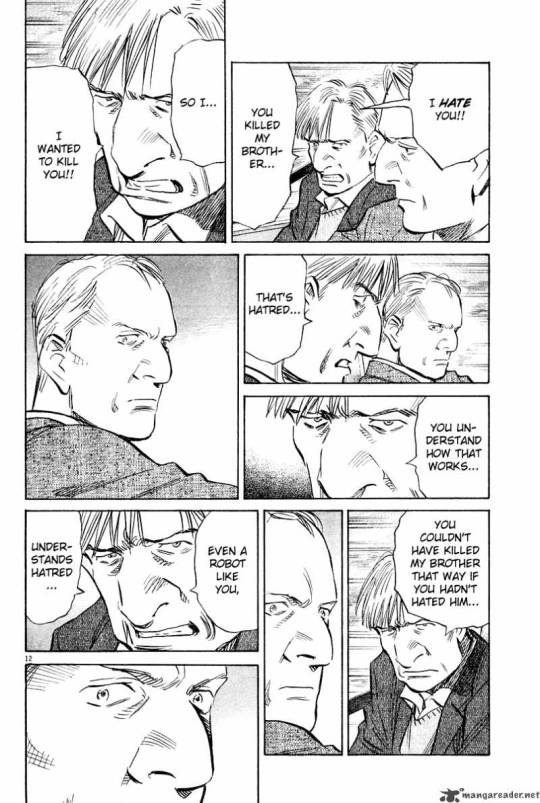
Finally, it is the fact that Gesicht still chose to protect both Mr Haas and his family despite what had occurred between them what finally motivates Mr Haas to change idea about him and hopefully robots in general:
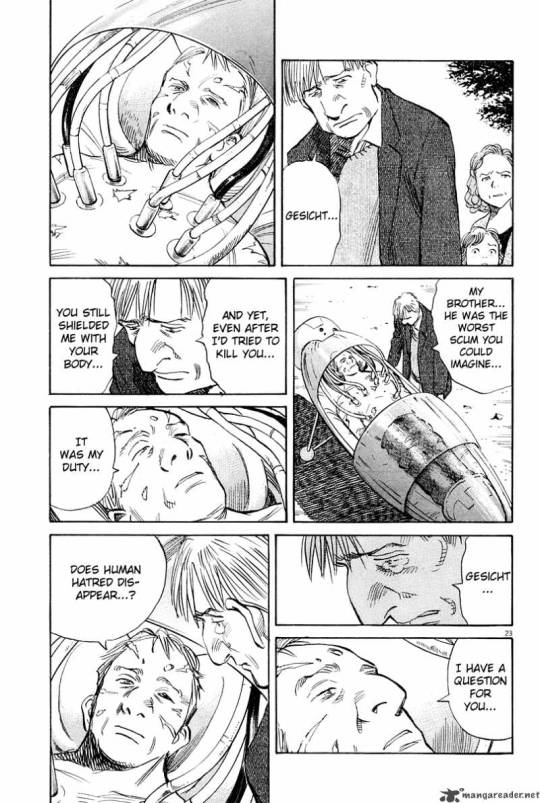
In other words, it is not the fact that Gesicht is unable to feel hate which makes him better than Mr Haas, but the fact that he was able to overcome it. This is what gets through to Mr Haas and inspires him to be better. After all, if Gesicht was simply a person without emotions it would be difficult for Mr Haas to relate to him and it would be easy for him to keep hating the robot as someone inhuman. However, the fact that the two of them are flawed in a very similar way, but that Gesicht still chose to abide to some sort of moral code (like his duty as a policeman) is the proof that Mr Haas has the chance to do the same.
The way things were sorted out between them makes sense also considering Mr Haas’s backstory. As a matter of fact his and his brother’s hate for robots was born by the fact that they were considered better workers than humans and that this led to the brothers’ father being fired. What is more a robot’s too strict application of the law is what led to the man’s death:
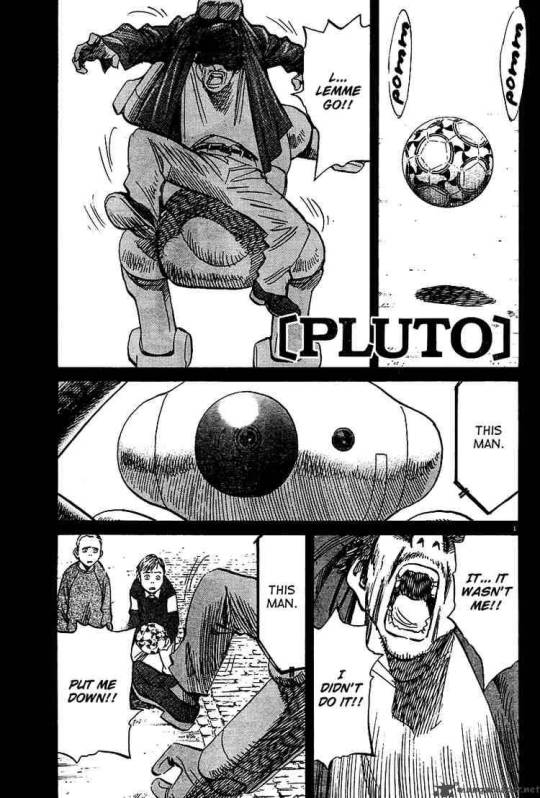
The robot was technically right since the brothers’ father had stolen, but at the same time all he stole was a ball to give his children some joy.
In other words, arguments about how robots are better than humans and superior to them are bound not to have the right effect on someone like Mr Haas since his hate is born partially by this exact idea. However, seeing how similar to him Gesicht was managed to obtain some results.
2) The second reason is this:
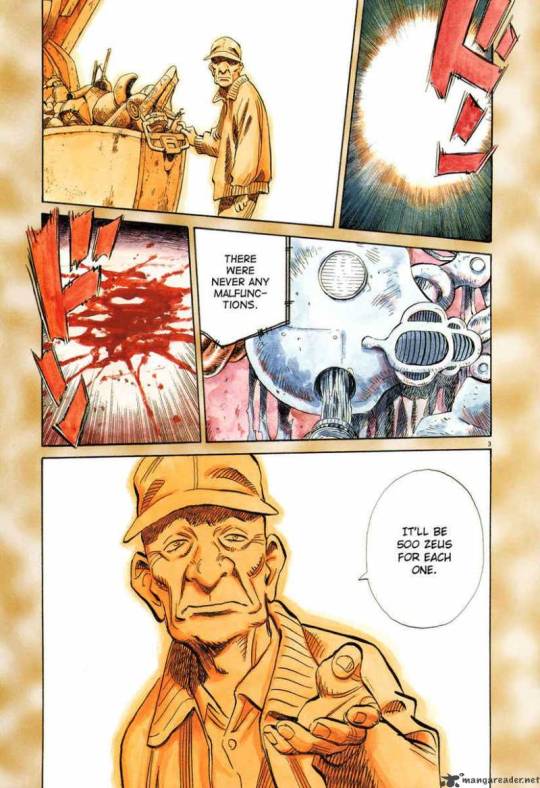
Throughout the story this scene seems to be a part of an extremely dark memory Gesicht is trying to suppress. He is literally haunted by this scene and it keeps coming to his mind when he sees robots’ bodies among other things. In short, everything leads the reader to think that what happened between Gesicht and the man asking money out of him is something negative.
However, when we are finally revealed the context of the scene this is what we discover:
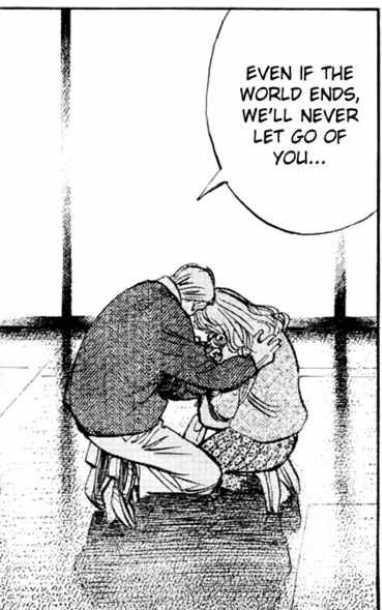
Gesicht’s memory was not an unhappy one, but on the contrary it was him remembering the day he became a father. In other words it is the day Gesicht learnt parental love.
At the same time this scene is at the origin of Gesicht’s hate and violent action. As a matter of fact one can not choose to only have positive emotions. If one feels he is bound to deal with both the good and the bad of it:
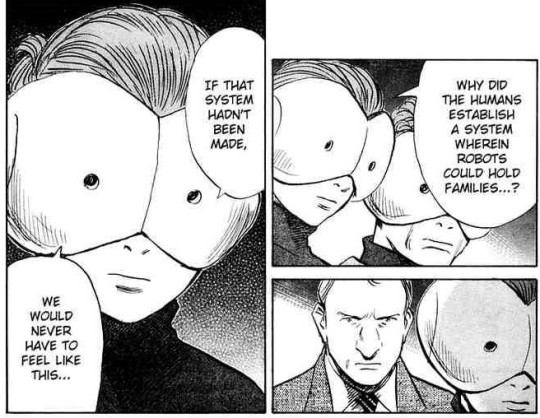
All in all the story if full of love being used to fuel hate and of hate overcome by love.
This becomes apparent in the character of Sahad aka Pluto:
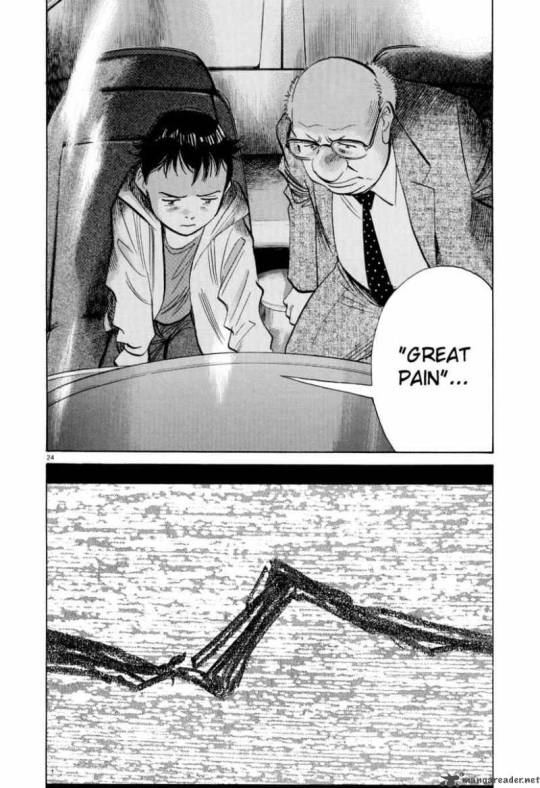
This abstract sign is identified by Atom as a negative feeling and when we meet Pluto for the first time he has been realizing works of abstract art:

This picture might seem chilling at first sight especially if the reader realizes that the robot who has drawn it is Pluto. Uran herself is led to Pluto because she can feel his immense pain and she wants to help him.
However, as Sahad spends more time with Uran in a somehow positive environment he starts to remember what he was originally created for aka his father original wish:
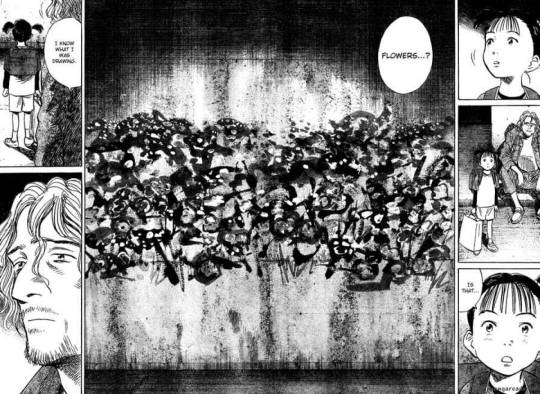
And so what seemed like an abstract mirror of a pained subconscious becomes a wonderful field of flowers able to move Uran to tears.
After all, the whole conflict is born by a huge dream being destroyed by war and by a man losing his children and his wife.
What Abra/Goji wants is revenge and it is meaningful that he tries to obtain it through three cyborgs (counting Goji himself) who were originally created to turn the desert into a field of flowers.
The example of Bora is self-explanatory:
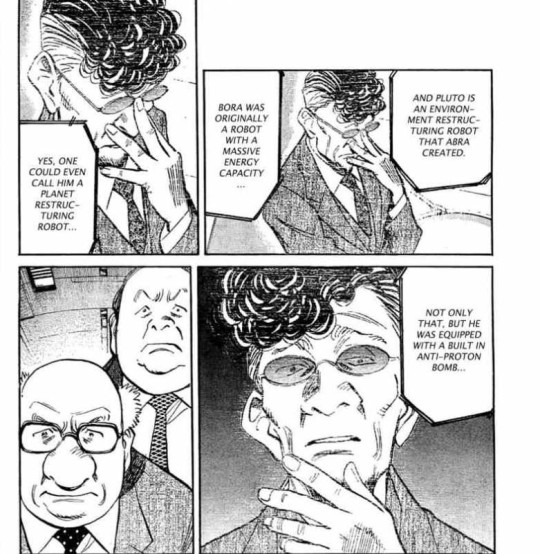
He was supposed to be a robot who could save the planet, but he has been turned into a weapon which could destroy humanity instead.
In short, negative feelings are a part of being humans and they are strongly intertwined with positive ones. These two points come together in Atom’s “resurrection”. This part of the plot is also linked to Gesicht’s arc and his role as a father.
Atom is able to wake up thanks to Gesicht “hate” and Epsilon’s “sadness”:
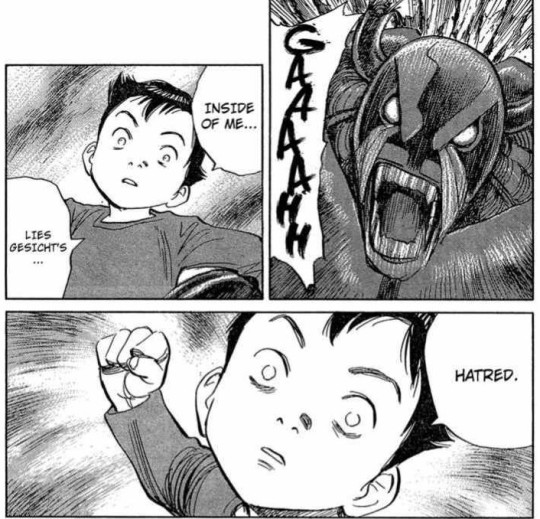
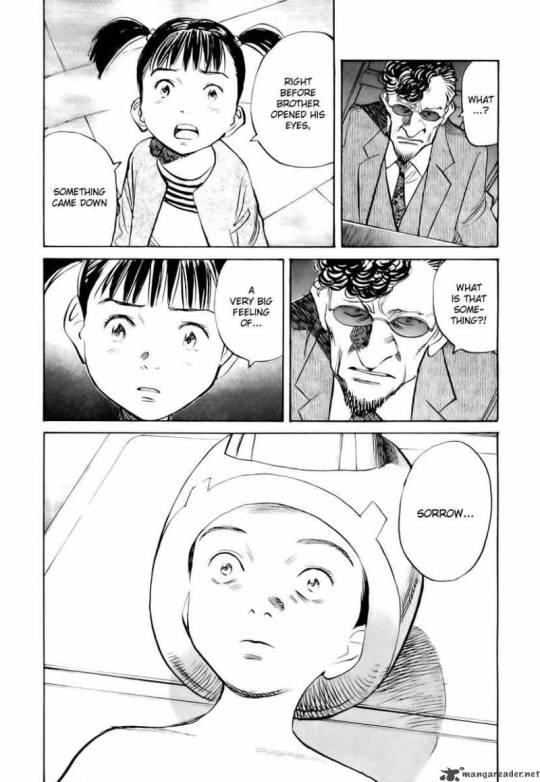
After his awakening he is said to be able to feel hate and this is proven true during his battle against Pluto:
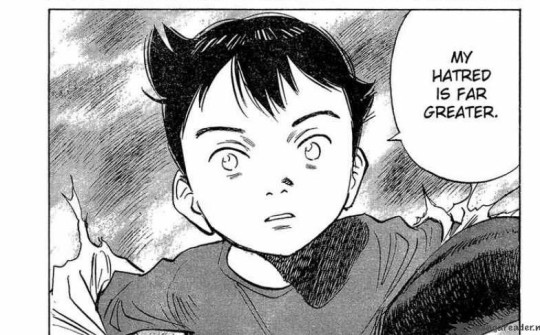
This in itself is important and can be used to make some considerations:
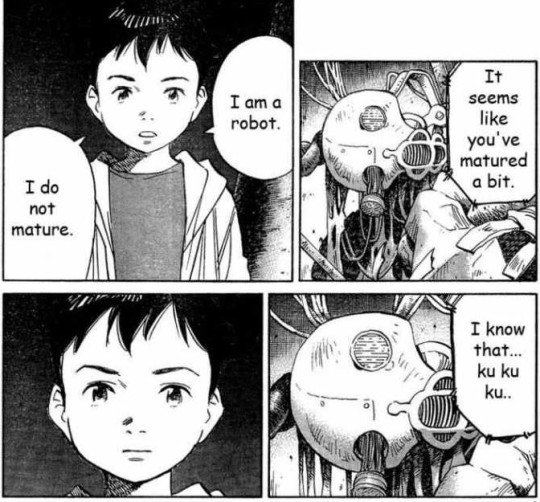
Here Brau claims that Atom has matured to which Atom’s reply is that he can not grow since he is a robot.
This is interesting because the fact that Atom can not grow is one of the reasons why Tenma realized that he was never going to be like Tobio. The other one was Atom’s inability to feel hate. These were the two main reasons why Tenma considered Atom a failure.
However, after his awakening Atom has learnt what hate is and he is said to have matured. What Brau noticed was probably something more similar to a change happened in the inside rather than one happened on the outside.
In other words Atom has grown not because he has matured physically, but because he has now a better understanding of human emotions among which hate.
This is no different than a child growing up and having to learn the complexity of the world and to make sense of their negative feelings.
After all, given Tenma’s description of the perfect AI here:
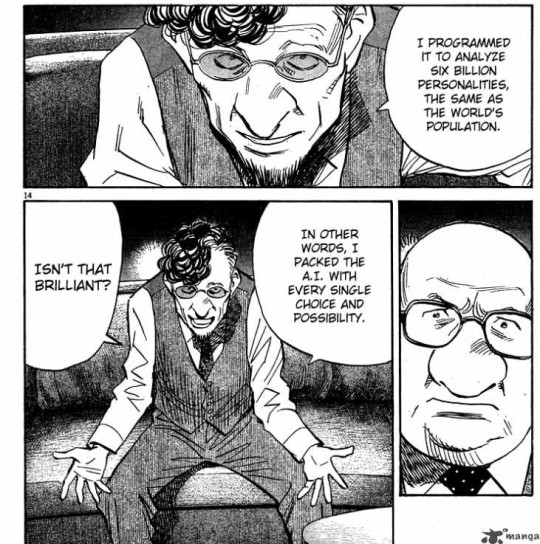
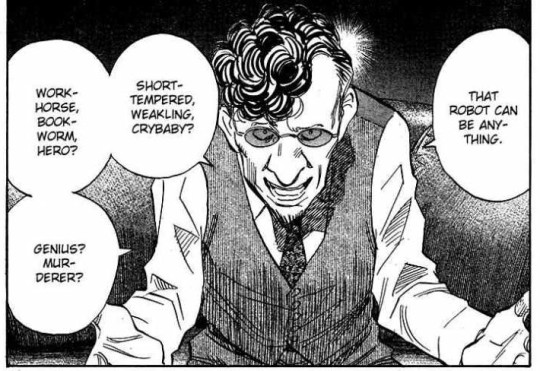
It is difficult not to think of it as a child aka as a being who has in front of themselves all the possibilities and who will grow to become only one of those possibilities.
In a sense this is very similar to what was said in Monster:
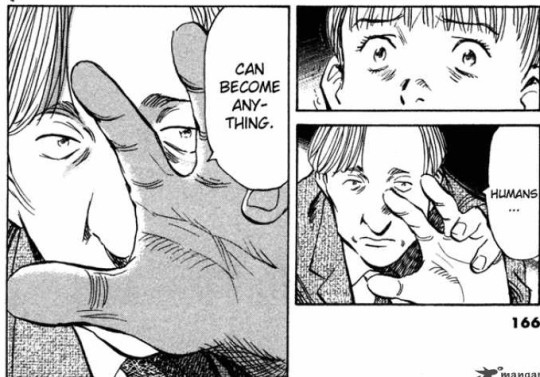
Children can become anything and the parents have a great role in influencing their future developments.
This becomes obvious through Gesicht and Atom’s relationship.
As a matter of fact what Atom learnt from Gesicht is not only what hate is, but also this:
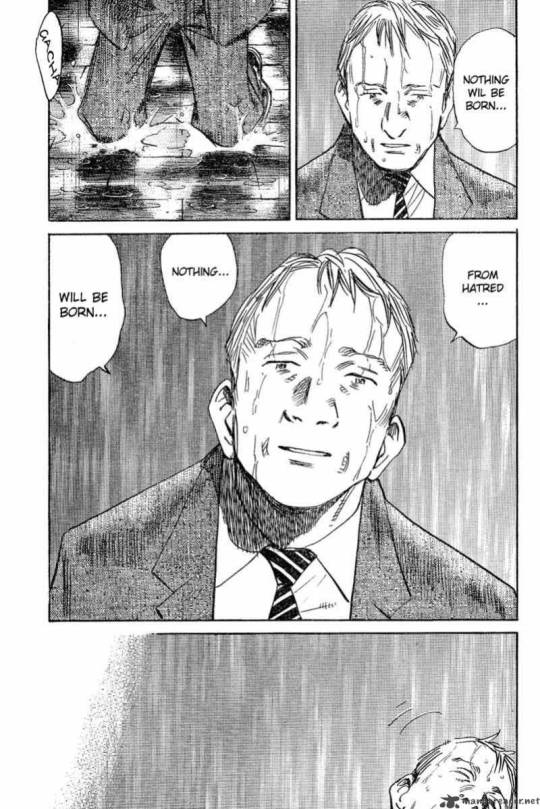
He learnt how to overcome it and that humanity is not just hate, but also hope:
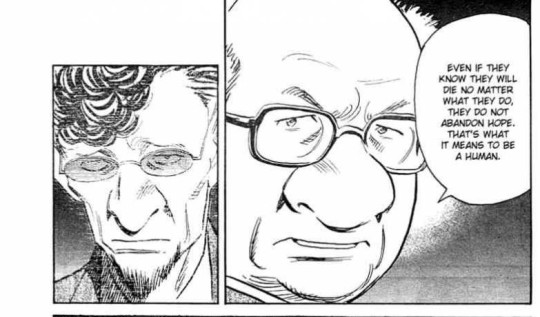
This is why the manga ends with a wish and a prayer which are actions born out of hope:
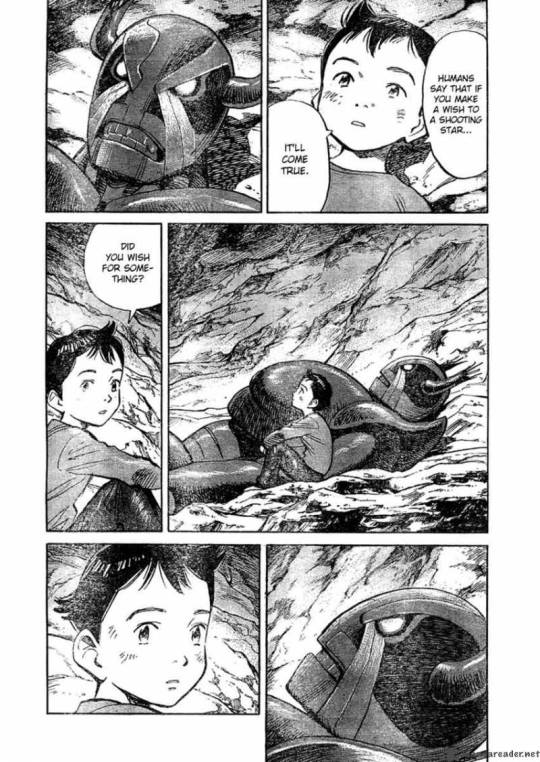
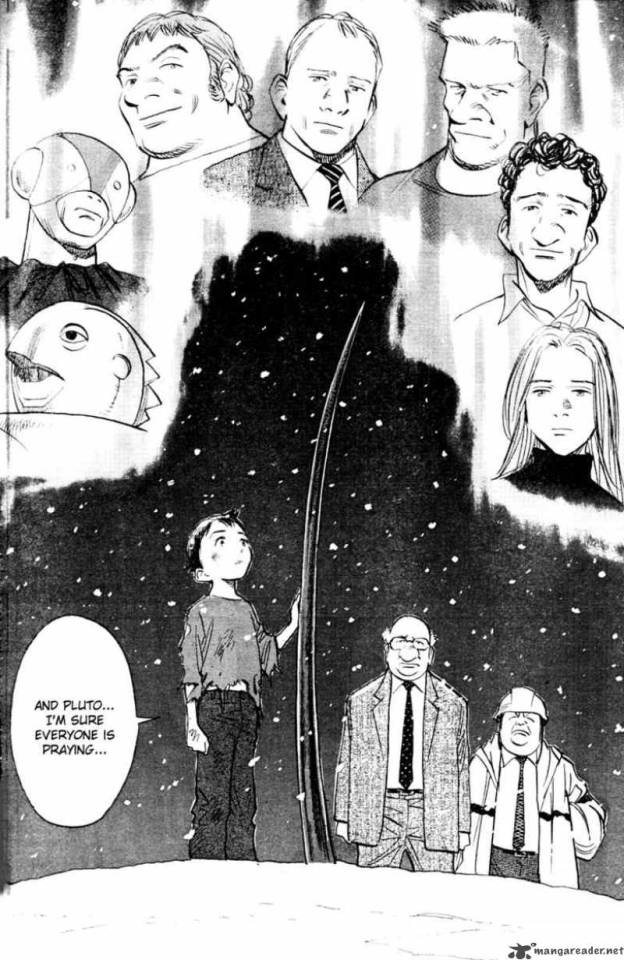
Let’s also underline how the bomb formula Atom writes down after he wakes up is not just something born out of a new found hatred for the world, but it is probably something he learnt thanks to Epsilon who realized that the Earth was in danger just before dying:
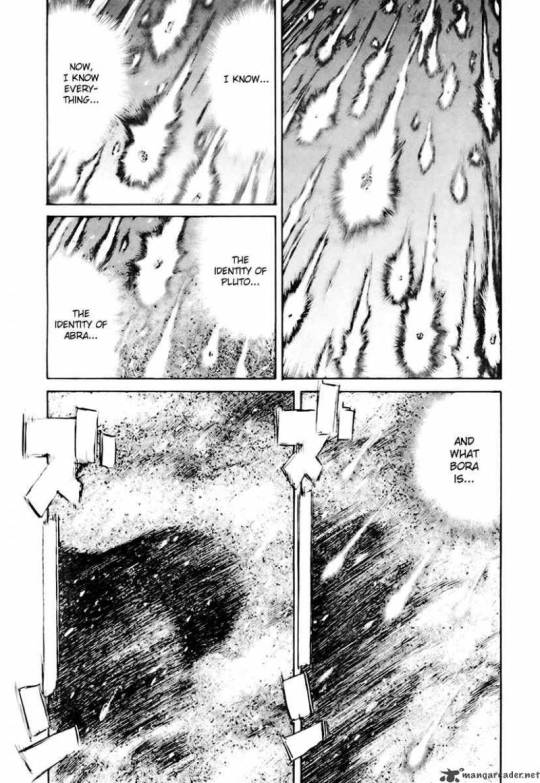
Let us also underline how “sorrow” (aka what Atom learnt from Epsilon) plays a part in the ending just as much as “hate” does. As a matter of fact once Atom overcomes his hatred he starts crying and so does Pluto and the two comment how strange that feeling is. It is also interesting how Epsilon’s death, just like Gesicht’s one is linked to a child. As a matter of fact the two robots both survived a fight against Pluto and gave up the chance to kill him only to then die trying to protect a child.
This is linked to the last point of the analysis i.e. to how Atom surviving is representative of the importance of protecting children and in this way the future itself.
After all, throughout the narrative Atom is paralleled to Gesicht’s child, so it is meaningful that in the end he survives thanks to Gesicht’s sacrifice. At the same time he is the one inheriting Gesicht’s legacy like a child who is taught by a parent. Even if the parent messed up he has still the chance to teach the child to be better. So, Atom is able to put into practice what Gesicht learnt and is able to connect with Pluto.
In conclusion, to answer the question which started this analysis I would say that the Greatest Robot on Earth is not the strongest or the one who exhibits somehow better qualities than humans, but it is a robot who is human and who at the same time is able to learn from humans (like the robots developing emotions by imitating human behaviours), but also to teach humans to be better:
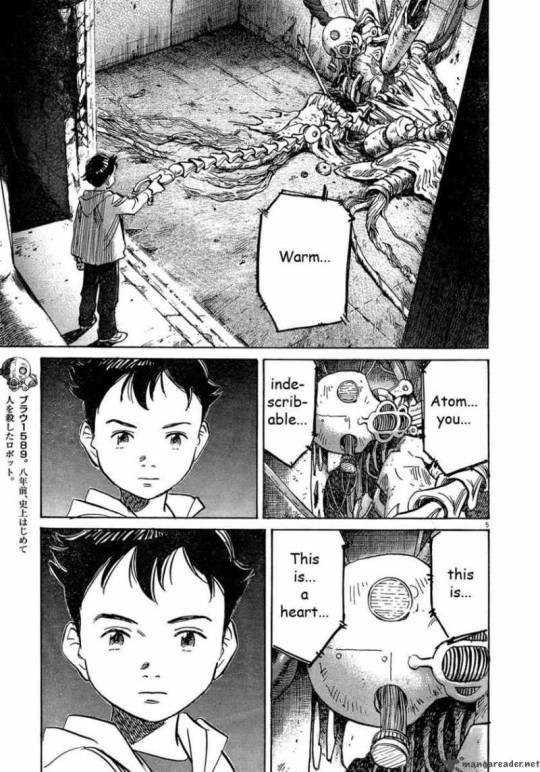
This is evident also in how Brau develops. Brau has always been an AI very similar to humans since he managed to develop hate, but after his meeting with Atom he starts to understand something else. He calls it “a heart” and he is able to feel it both in a person as noble as Atom and in a person as despicable as the President. The fact that in the end he chooses to kill Doctor Roosevelt instead of the President underlines a choice the character makes. Despite how much imperfect humans are Brau still chooses them over an AI who is incredibly advanced and intelligent, but lacks a “heart”.
#naoki urasawa's pluto#naoki urasawa's pluto meta#pluto meta#my meta#gesicht#pluto#tetsuwan atom#uran#professor tenma#umataro tenma#epsilon#naoki urasawa
211 notes
·
View notes
Text
The Sátántangó Experience

How exactly does one prepare to watch a 7.5 hour film? A bit like what you might do in preparation for major surgery: Pack a bag of necessities (in this case, water and protein bars), kiss your loved ones goodbye, and try to make peace with your god. Or, maybe less dramatically, treat it as you would a long train journey, one that takes you through some harrowing terrain on half a rutted track before depositing you to your eventual destination.
Of course, this sort of conception of time is entirely relative: If you have to drive somewhere that takes half an hour, it feels unduly long; but if the trip were normally three hours long, and you somehow found a shortcut that would cut the time down to 30 minutes, you would be flying on dulcet wings for that amount of time, and think you were blessed by angels. In other words, spending an entire standard work day watching one film might seem excessive, but it all has to do with your expectations.
In my case, I was at Philadelphia’s newly renovated Lightbox Theater at the University of the Arts to take in Béla Tarr’s magnum opus Sátántangó, all glorious 450 minutes, in a new 4K restoration (it’s currently playing at select theaters across the country). Armed with my snack survival kit, and safe in the knowledge that we would get intermissions at roughly 2.5 hour intervals, I settled in to watch what has been described as a masterpiece in cinephile circles, and currently resides at number 36 in the most recent Sight & Sound critics’ poll.
Tarr’s beyond-bleak film is broken up into 12 segments, each having to do with a failing farmer’s cooperative in Hungary during the last throes of communism in the late ‘80s. Each section has its own feel and perspective — some of them are more lighthearted, others are desolate beyond measure — but all expertly shot in low-contrast black and white (by Gábor Medvigy), which renders the people and landscape in various tones of drudgery grey.
It originally opened in America as part of the 1994 New York film festival, at a time when Hungary was undergoing a transformation from Communism to shaky democratic capitalism, so it served as a kind of epigraph to the era, a showcase, as it were, as to the imperfections of a political system built on a promise of human egalitarianism that proved to be depressingly difficult to put into practice.
The landscape makes up a lot of Tarr’s vision, the flat, moody farmland upon which the collective has been toiling, and the unceasing rain and wind that constantly pelts the characters as they venture outside for one business or another. As the film opens, the collective — made up of three couples; a curious “doctor” (Peter Berling), who spends his time spying on the others, making copious notes in his stacks of file folders, and daily drinking his considerable body weight in Palinka (Hungarian plum brandy); and the cagey Futaki (Miklos Szekely B.), who has to walk with a cane from an unspecified accident, but seems a bit more shrewd than the others — is anxiously awaiting their annual wages, which come all at once and is meant to get divvied up amongst the members equally.
Early on, there are various halfcocked plans from individuals to try and steal the small fortune for themselves, reflected in much idle talk about meeting that evening and decamping for parts unknown, but that ultimately come to nothing. However, when word reaches the group that the mysterious Irimiás (Mihály Vig, also the film’s composer) is, in fact, not dead as they had been told, but alive, and returning to the collective he started, the group dynamic is thrown akimbo, with various members fretting for their future, and, one, the owner of the local bar (Zoltán Kamondi), furious at the thought his business will be taken from him.
Just why they respond like this remains vague. In ensuing segments, we see Irimiás, along with his associate, Petrina (Dr. Putyi Horvath), navigating through a police interview — where the local Captain informs them they will be working for him now in ways unspecified — though it appears the collective had very actively planned on not having to include their former leader (and his right-hand man) in their financial arrangements. As for the non-collective characters, including the aforementioned barkeep, and various prostitutes sitting idly around, the collective is virtually their only business, such as it is, so they, too, await this potential flood of cash eagerly.
As the segments begin to collect, they also begin to fold upon themselves: Scenes that we see from one vantage point in an earlier segment are revisited later on, from the perspective of a different character, enabling a thrilling moment of realization that the stream of time we’re following has breaks, jumps, and hiccoughs throughout. Never more poignantly than a moment with a young girl peering into a window of the bar — one of the only lit buildings in the otherwise dismally dark countryside — watching the adults inside drunkenly dancing and cavorting.
About that girl. Easily the most emotional moment of the film involves her, but not first without the audience paying a heavy price, depending on your empathy for other creatures. Before the film screened, during its introduction, we were made aware that there was a scene of animal cruelty involving a cat somewhere in the proceedings. The sympathetic presenter, himself a cat lover, suggested looking away for parts of that segment, though a friend of mine in attendance who had seen it before assured me looking away wasn’t really an option. Fortunately, he also told me that the cat in question wasn’t actually hurt, and was still alive at the time of a 2012 interview with Tarr.
Needless to say, my worry about this poor cat dominated my experience in the early going: Every time I saw a feline in the background of a scene, I worried that it was coming up, such that it was almost a relief when it finally happened. The situation is this: Estike (Erica Bók), the young daughter of one of the local prostitutes, caught up in her world of half-fantasies after being sent out of their apartment by her working mother, holes up in an attic with a grey tabby. At first, she pets and cuddles him, but eventually, she desires to control him, bend the cat to her will. To the cat’s increasing discomfort and fury, she grabs him by the front paws and rolls around with him, all the while muttering how she alone can determine its fate. Looping up the poor fellow in a net bag and hanging it from a post, she goes downstairs to mix a batch of milk with some rat poison powder and force feeds him until he dies (though in actuality merely tranquilized).
Wandering around the farm that night with the stiffened body of the cat tucked under her arm (a prosthetic, the director assures us), Estike runs into the doctor, shuffling outside to refill his giant jug of brandy, shortly after peering through the window of the bar. Eventually, she lies down amongst the deserted crumble of a bomb-blasted church and takes the poison herself.
As gruesome as the segment becomes, its haunting evocations permeate the rest of the film (though not immediately: in a jarring juxtaposition, the very next segment takes us back to the bar, where everyone is still dancing wildly about to a loopy accordion refrain — only towards the end of this extended scene do we see the face of the soon-to-be-dead Estike peering inside). Eventually, Irimiás does indeed return, in time to give a moving eulogy for Estike, while at the same time transitioning the group towards his next vision, a new farm some distance away where he assures them they can finally live freely and thrive. All he needs to achieve this goal for them is the money they just received from their previous year’s efforts.
With nowhere else to go, and no other plan on the horizon, the members of the collective dutifully deposit their wages on the table in front of their leader. He sends them out to pack their things so that they may meet with him in a couple of days at the new farm he’s selected.
Gathering their miserable belongings, the group reassemble and trudge down the muddy road on foot, as the rain pelts down on them without ceasing. Distressingly, the members don’t have any proper rain coats — in an earlier soliloquy in the bar, Kráner (János Derszi) laments that his leather coat is so old and stiff he has to bend it in order to sit down — so they wear their woolen winter coats, which do little to keep them from getting soaked in the heavy fall rains.
As they make their way to this new destination, it’s clear that Irimiás is up to something. Most obviously, he could make off with their wages and move on, but it turns out his scheme is less direct than just taking their hard-earned money for himself.
Towards the second half, Tarr’s penchant for long, elegantly composed shots gives gradually away to more adventurous camerawork, including a single steadicam shot in the woods that’s like something out of a Sam Raimi film. There are extensive elliptical shots with the camera spinning slowly on an axis, this particular effect never more effective than when after the group arrives at their new farm, yet another dilapidated series of box-like concrete buildings. Once they dump their belongings and lie on the floor of the unheated, broken-windowed main house, trying to sleep, our narrator makes one of his occasional VO appearances to describe in intimate detail the dreams each character is having.
It’s a shot that could have served as an excellent final salvo, one would imagine. Indeed, by the last hour of this opus, time and again, Tarr arrives at what might be considered a conclusive moment — in this, the confusion is aided by his particular style: It turns out many films end on a superbly composed, static long shot — only to keep the narrative flowing, circling back, eventually to the original farm, where the doctor, having just returned from a stint in a hospital, begins to narrate, again, the original opening lines. Such is the perfection in this device (the segment is titled “The Circle Closes”) that once you finally arrive there, it’s clear there could be no other ending that would have sufficed.
When finally the film ended, it was later in the evening. I met up with my compatriots also in attendance, and the three of us ventured back out into the city, heading to a bar where we could nurse a beer and attempt to articulate the tangled mass of feelings and impressions of the previous nine hours. In one of the very few bars in the city that still allows smoking, appropriately enough, we debated about the film in an atmosphere swirling with the poisonous fumes of an earlier era. It seemed hopeless, but still necessary, somehow; like bidding farewell to someone already in a coma.
#sweet smell of success#ssos#piers marchant#films#movies#satantango#bela tarr#hungary#communism#Mihály Vig#philadelphia lightbox theater
2 notes
·
View notes
Text
Episode 116: Gem Heist
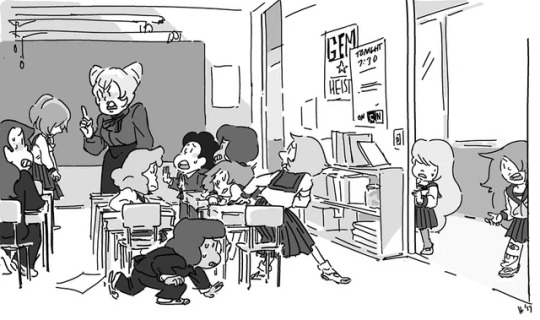
“We won’t stand out if we play the roles we were made for.”
There’s nothing like a good heist. You’d think a plot with such a consistent formula (build a team, go over a plan, execute the plan and adapt to its inevitable failures) would get stale, but consider for a moment that Inception and Fast Five premiered within a year of each other, and are both heists following the same general beats, but they’re fully different experiences. I’m not gonna say which one is better, but only one of them has a car chase where a car is chained to a giant safe and uses it like a wrecking ball, so.
In some ways, Gem Heist drops the ball on what I want from a heist: there’s barely a planning stage, and the team is already together, so it’s all about the execution and the wrenches thrown at our heroes. But while it’s hardly the caper I hoped for from the title, I can’t help but admire how it takes the tropes associated with heists and uses them to comment on Gem society.

A heist is all about specialists with clear jobs. Safecrackers, getaway drivers, demolitions experts, con artists, the whole point is getting a bunch of talented people who are each essential to the group. This element is only briefly touched upon in the traditional sense in Gem Heist, with Steven referring to Pearl as “our hacker,” but in its place, our heroes must succeed by putting themselves into the very roles they escaped by becoming Crystal Gems. Sapphire is a wise advisor and Ruby a disposable bodyguard, and the two must be separated. Amethyst must be huge. Pearl must be lowly servant. And Steven, who can’t exactly take the leadership position of his Gem parent, must play the dumb human.
This conceit drives the episode and makes it unexpectedly solid in terms of characterization, given how bland its plot ends up being. This is basically an episode about walking through a hallway, and instead of a third act we just get two minutes transitioning Steven to the Zoo that could’ve been spent in our next episode (or heavily cut). Even Adventures in Light Distortion feels more meaningful from a sheer plotting standpoint, and that was literally just getting the Crystal Gems from Point A to B. But because of how fascinating the characters are to watch when forced into the positions they’d be stuck in had they not rebelled, I’m able to enjoy what would otherwise be a slog of an episode.
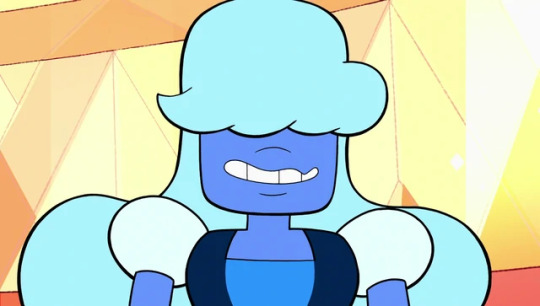
The surprise lead of Gem Heist is Sapphire, who takes charge of the situation right away and finally shines on her own. Ruby got a head start in Jailbreak in terms of screentime, and takes up more room when the two are together thanks to her louder personality, and has a whole squad of counterparts to define herself against, so I love seeing a focus on Garnet’s quiet half.
Sapphire’s serene baseline is portrayed so well by Erica Luttrell that she’s often played comically straight (her casually agreeing to call Steven “Esteban” is a great example here), but we already know from Keystone Motel that she’s more than just her calmness. It’s great to see her lose her cool so early in the episode, putting up a confident front while planning but getting frazzled with its inevitable failure before the team even disembarks. I wouldn’t quite call her a ham in the way Ruby and Peridot can be, but her overacting while narrating her activities to warn her friends of danger is wonderful. And of course, she gifts us with the universe’s cutest wink.
Charlyne Yi always brings a lot to the table as Ruby, and while she’s had more to do than Luttrell after Hit the Diamond, this is the first time since then that she’s voiced our Ruby. The line of the night is her furious declaration that Blue Diamond “hates fusion and love?”—it’s such a horrible thought that Ruby treats it like a question rather than a statement, because how hating something as good as love even possible? Still, Ruby’s bigger highlight is all in the animation as she runs up a locked door, claws at it while screaming, and admits defeat when this doesn’t immediately work.
youtube
Pearl also benefits from the visuals, which portray her humiliations in ways Deedee Magno Hall can’t in the moment due to her needing to be quiet. Which isn’t to say Magno Hall doesn’t do a lot with what she’s given, going from embarrassed and deferential around Holly Blue Agate to pissed off while alone with the Crystal Gems. And while Amethyst is the first Crystal Gem to go, Michaela Dietz picks up the baton from Yi and Magno Hall to play other amethysts; it’s neat to hear her turn down the playfulness for gruffness without completely removing the prankster edge from her voice. And what we do see from Amethyst is a reasonable amount of nervousness around a first encounter with her peers, which pays off wonderfully in That Will Be All (as does the actual sentence “That will be all” that Pearl will soon get the chance to redirect).
Steven is surprisingly low-key here, all things considered, but I suppose with all the focus he gets in the first two episodes of this arc, as well as our next one, it makes sense to look more deeply at the Gems; after all, they’re the ones who were born into an oppressive class structure that they must temporarily return to (give or take an Amethyst, but she still has plenty of issues stemming from societal expectations). He’s got some decent jokes, and dominates the last part of the episode when separated from the Gems, but the last part of the episode is so boring that I don’t really care.
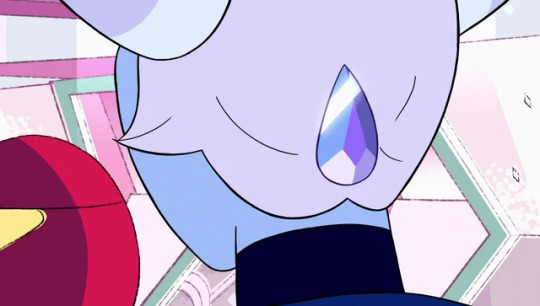
Still, none of these characters would have the chance to shine without Holly Blue Agate, who comes in hot and seems physically incapable of chilling the hell out. Christine Pedi voices Holly in just two episodes of the original series, but boy does she know how to leave a mark. After seeing Homeworld loyalists from the bottom of the totem pole in Peridot and the rubies, a Homeworld loyalist who’s a known hero in Jasper, and two leaders of Homeworld in Yellow and Blue Diamond, we encounter perhaps the worst kind of zealot: middle management.
Holly Blue Agate is the Dolores Umbridge of Steven Universe. She’s not given the stage to become main villain material, but she sure knows how to be the most detestable kind of miniboss we could hope for. She’s a shameless sycophant whose worship of Gems she considers superior is matched only by her disdain for those she sees as beneath her, but because she actually has some authority, she’s able to be far more tyrannical than the likes of Peridot. She’s hardcore lawful evil on the classic alignment chart, but if we allow for variation to the classics, I’d consider her more petty evil than anything.
With one character, we personify the entire toxic class structure that the Crystal Gems were born to defy. And with every word, Holly Blue proves that our heroes were correct to abandon this caste system. She’s flippant in her physical abuse, and wears her bigotry as a point of pride, taking glee in enforcing the inferiority of every Gem around her but Sapphire, who earns the same kind of swooning she applies to Blue Diamond. This is all performed under the thin disguise of politeness, because again, this is Umbridge we’re dealing with. She yells that there’s no yelling allowed, then gets mad when an amethyst corrects herself by being too quiet. She either pretends to not understand human speech or genuinely doesn’t get that Steven is talking (I could get into a whole thing about the necessity of an unrealistic translator for the Gems, but first off they’re magic so unrealistic things are fine, and second off what’s clearly more important here is Holly’s attitude).
It’s almost a shame we don’t get more of Holly Blue, because she may be loathsome, but she’s the compelling kind of loathsome that makes an excellent villain. Aquamarine is similar in feigned sweetness and cruelty, but Holly lacks that Cartman-inspired awareness of how miserable she is, which makes her less extreme and more relatable to real-life monsters in our daily lives who are blind to their own awfulness. At least she gets one more episode to be horrible and receive some decent comeuppance for her behavior in Gem Heist.
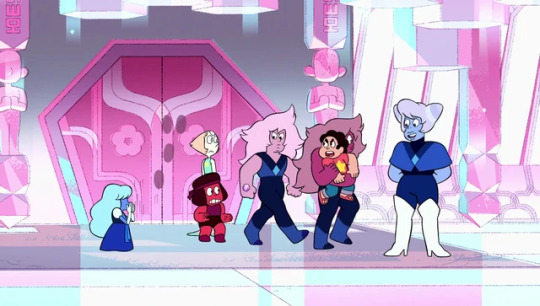
As I’ve said, the actual story here is pretty dull. We get some hints at lore, as it’s now pretty clear that the Era 2 referred to by Peridot was separated from Era 1 by the death of Pink Diamond. We get further indirect characterization of Blue Diamond with Holly Blue Agate’s praise and Ruby and Sapphire’s scorn. And the final sequence, while feeling tacked on, at least gets some neat usage out of what looks like the same tech as Peridot’s gone-but-not-forgotten robofingers. But if not for the stark reminder of why the Crystal Gems’ ability to decide their lives is important, this would be one of the least consequential episodes of the series. Plenty of episodes have great characterization, this is Steven Universe after all, but most of those also bring more to the table.
I’ve never been to this…how do you say…school?
Second episode since Gem Harvest to feature the Floridoverse as the main promo, and while it’s a little unclear whether this is another Floridoverse promo where a new adult character is portrayed as a teacher (Holly’s uniform vaguely resembles Greg’s and Ruby’s) I’m gonna go ahead and hope the intent is for her to be a student because man, that vibe on a peer is in some ways even worse than on a superior.
We’re the one, we’re the ONE! TWO! THREE! FOUR!
Lousy plotting really knocks this one down, considering how great an actual heist could’ve been, but the character work barely scrapes this from an episode I don’t care about to one I enjoy. It straddles the line between Like ‘em and Enh, but I’ll be nice this time.
Top Twenty
Steven and the Stevens
Hit the Diamond
Mirror Gem
Lion 3: Straight to Video
Alone Together
Last One Out of Beach City
The Return
Jailbreak
The Answer
Mindful Education
Sworn to the Sword
Rose’s Scabbard
Earthlings
Mr. Greg
Coach Steven
Giant Woman
Beach City Drift
Winter Forecast
Bismuth
Steven’s Dream
Love ‘em
Laser Light Cannon
Bubble Buddies
Tiger Millionaire
Lion 2: The Movie
Rose’s Room
An Indirect Kiss
Ocean Gem
Space Race
Garnet’s Universe
Warp Tour
The Test
Future Vision
On the Run
Maximum Capacity
Marble Madness
Political Power
Full Disclosure
Joy Ride
Keeping It Together
We Need to Talk
Chille Tid
Cry for Help
Keystone Motel
Catch and Release
When It Rains
Back to the Barn
Steven’s Birthday
It Could’ve Been Great
Message Received
Log Date 7 15 2
Same Old World
The New Lars
Monster Reunion
Alone at Sea
Crack the Whip
Beta
Back to the Moon
Kindergarten Kid
Buddy’s Book
Gem Harvest
Three Gems and a Baby
Like ‘em
Gem Glow
Frybo
Arcade Mania
So Many Birthdays
Lars and the Cool Kids
Onion Trade
Steven the Sword Fighter
Beach Party
Monster Buddies
Keep Beach City Weird
Watermelon Steven
The Message
Open Book
Story for Steven
Shirt Club
Love Letters
Reformed
Rising Tides, Crashing Tides
Onion Friend
Historical Friction
Friend Ship
Nightmare Hospital
Too Far
Barn Mates
Steven Floats
Drop Beat Dad
Too Short to Ride
Restaurant Wars
Kiki’s Pizza Delivery Service
Greg the Babysitter
Gem Hunt
Steven vs. Amethyst
Bubbled
Adventures in Light Distortion
Gem Heist (barely!)
Enh
Cheeseburger Backpack
Together Breakfast
Cat Fingers
Serious Steven
Steven’s Lion
Joking Victim
Secret Team
Say Uncle
Super Watermelon Island
Gem Drill
Know Your Fusion
Future Boy Zoltron
No Thanks!
6. Horror Club
5. Fusion Cuisine
4. House Guest
3. Onion Gang
2. Sadie’s Song
1. Island Adventure
27 notes
·
View notes
Note
Satsuki meta anon here again, apologies, but I was reading some meta that you wrote surrounding Soichiro/Isshin and his relatively necessity to abandon both his daughters, and wanted to contribute my own thoughts on the matter, specifically around the matter of difference of the nature of how alone both of them are. You nailed it completely with Ryuko. Isshin left Ryuko alone, wounded by his severance of their closeness in her early years and making it nearly impossible to bond with others. But-
-my reading of Satsuki’s situation is one of equal isolation, if of a different kind. Soichiro introduced her to a world where she can’t even trust her own mother, usually one of the, if not the most, strongest bonds a child could have at that age. Coupled with the fact that she was likely taught early on that being a child of a family with the wealth and power meant that people would try and use her for a piece of that, and you have a recipe for a grieving child incapable of trust without major investments of time and effort and frankly, some testing.
Soroi is in the employ of the family, paid by the family to serve Satsuki. In the beginning, while she accepted his attempts to comfort her via tea and an introduction of one of her closest friends, its very likely that she didn’t trust him right away even if she desperately wanted to bc of how closely money could play a part in that kind of trust. Yes Soichiro asked Soroi to look after her, but is that something he could have easily conveyed to her at that junction and have her believe it? I think the trust they attained by the time Satsuki went to middle school was very hard earned on Soroi’s part.
When it comes to Nonon, the light novel confirms that she didn’t find Satsuki interesting until she was very deeply troubled, a change that Satsuki very likely noticed the difference in her interest beyond that of two children of powerful families associating together. They may have been friends since preschool, but arguably Satsuki did not trust her until Nonon followed her away from a school that suited Nonon’s tastes and into a rougher one. Iori likely suffered from being placed in a similar boat as Soroi, not to be trusted for the sake of his uncle’s employment until proof otherwise (obviously earned as well, considering just how central Iori was to her plans and inner circle).
While Ryuko was utterly alone because of a broken ability to bond from separation anxiety turned to abandonment issues, Satsuki found herself alone among others who might very well sell her out for power or money, regardless of their true intentions. Both are very isolating situations. And I’d argue that trusting people with plans and secrets and perhaps your life are markedly different than fully entrusting your heart to them, which has been played up by the anime as a large difference between Ryuko and Satsuki. Where Ryuko opens her heart to Mako and Senketsu, Satsuki’s heart remains closed still until far later.
In fact, because of this, Ragyo saying ‘give your heart over to me’ (Netflix subs, I think I’ve seen it translated as ‘entrust your heart to me’ as well) has always stood out to me as understanding Satsuki doesn’t trust like that, which is what separates her from Nui and Rei.
Apologies for the length of this, and that I keep doing this your inbox, but this interpretation has been sitting inside of me since 2014.
Oh my goodness, Anon!
I hope this doesn’t come off wrong, but I think you really ought to be posting these analyses under your own name. You deserve credit for your excellent work! As much as I’m thrilled that someone would want to discuss these topics at such length with me—seriously, you do not have to apologize at all for engaging with my content so much because that is literally my goal—I feel that you should also be getting recognition for what you do. I know how much time and effort goes into writing stuff like this.
Of course, I do understand that there are valid reasons to wish to be anonymous. I just want to say that these are good, detailed posts that could stand very well on their own, without any input from me.
Regarding my input here, these asks remind me of a line from “KILL la KILL Digest -Naked Memories by Aikuro Mikisugi-,” a quick recap “episode” that was included as a DVD/Blu-ray extra. Narrated by Aikuro, the short briefly explains the entire plot of Kill la Kill and then sets up the OVA with its final lines: “As for Satsuki Kiryuin, who led such an intense life ever since she could remember, totally alone… What kind of clothes will she choose to wear from now on? That’s the one thing that intrigues me.”
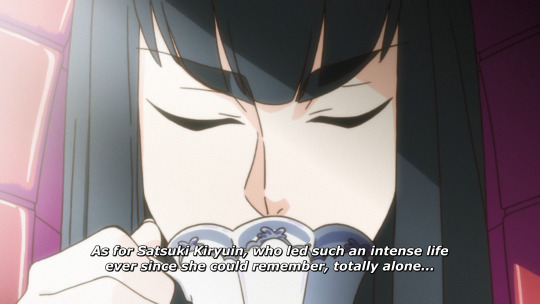
As you might expect, I always disagreed with the sentiment of Satsuki being “totally alone.” In the tags of one post, I even wrote, in response, “Nah man you’re thinking of Ryuko” and, “Satsuki had Soroi and Shiro and her Elite Four.” As I argued in the essay that you’re probably referring to, Isshin/Soichiro left Ryuko alone—and drj2008 even opened me up to the idea that he perhaps very purposely created and utilized Ryuko’s loneliness so that she would be so desperate for love that she’d bond more easily with Senketsu—but Isshin/Soichiro did at least assure that Satsuki would always have someone by her side when he told Soroi to look after her.
And I think that’s the key point of difference here. I’d never before considered that Soroi would need to gain Satsuki’s trust because I assumed he had it from the very start. My interpretation was that Soroi had to be a dear, close friend of Soichiro for Soichiro to ever ask him to look after Satsuki, and Satsuki—who adored her father, arguably to a troubling degree—wouldn’t question her father’s judgment. From the moment Soroi and Satsuki met, I believed that she would know, just by understanding Soroi’s relation to her father, that Soroi was someone to be trusted.
But I see now that my reading makes a lot of assumptions. Who knows when exactly Soroi told Satsuki that Soichiro had asked him to look after her? Satsuki might have been informed that Soroi was her father’s choice in some way (which is… actually quite curious, honestly), and Soroi might have told her that he knew everything early on, but you’re right—we don’t really know. I think your reading is very fair.
Concerning Nonon, I agree completely. I found Nonon’s part in the light novel to be absolutely tragic. Talking about the story, I once said, “It just shows how Satsuki did not trust Nonon at all.” Nonon was head-over-heels infatuated with Satsuki, but Satsuki didn’t even bother to tell Nonon when she was moving schools. That’s the exact opposite of trust.
I swear I don’t normally talk about my fanfiction in my essays as much as I have been in these responses, but I explored Satsuki and Nonon’s dynamic in a short Satsunon Roman Empire AU. In my piece, Nonon learns that Satsuki is going away by hearing some chatter, and to prove to Satsuki that she’s worth trusting, she runs to Satsuki before Satsuki leaves, declaring that she’s coming with no matter what. At the end of the fic—and this is the relevant part here—Satsuki meets with Nonon again after the world has been saved, and Satsuki finally opens her heart up, noting that she wants Nonon by her side, as a friend and equal, and she’s done with being treated as a goddess to be worshipped.
And I think that’s a big thing you’re touching on here, Anon. Satsuki may have had all these people around her, but many of them considered her to be something more than human. And that is lonely. It’s difficult to reveal your insecurities and doubts and fears to someone who sees you as a god. After all, they’re probably not going to listen; they think you’re “above” all that. Satsuki was very much isolated, just like Ryuko.
However, I still disagree with Aikuro’s assertion that Satsuki was “totally alone,” mainly due to Soroi. Regardless of how long Satsuki took to open up to Soroi, I think she most certainly had trusted him with her heart at least by the events of the series. The moment where the two converse about Soroi’s tea in episode 17 is probably the most telling example within the show itself; Satsuki smiles genuinely for Soroi and even reveals her hidden emotions, readily admitting that she may have been more compassionate in the past.
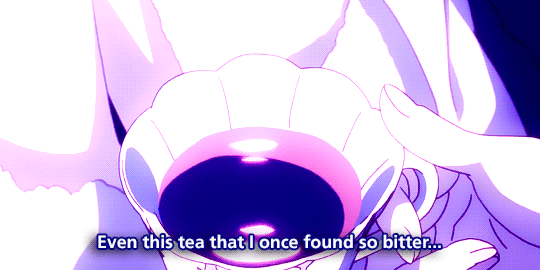
I can’t definitively say how much Satsuki let Shiro or the Elite Four in, but Soroi? There is complete and total trust here. And while I dislike comparing Soroi to Senketsu because I feel this too easily lends itself to the interpretation that Senketsu is a father figure to Ryuko (which is my absolute least favorite reading of Kill la Kill and one that I consider to be a complete and total misreading of the text #PleaseStopSenketsuIsRyuko’sDadTheories2k19), I do have to admit that Soroi is, for the majority of the anime, the one person whom Satsuki seems to truly be herself with, just as Senketsu is for Ryuko.
Concerning the episode 17 scene mentioned above, I think it’s also pretty telling that Satsuki’s moment with Soroi occurs just after an intimate conversation between Ryuko and Senketsu that the script even emphasizes as a heart-to-heart that Ryuko deliberately wanted to have with Senketsu and Senketsu alone. Sure, I’ve argued in the past that the real connection between the scenes comes from Ryuko’s later chat with Aikuro and the fact that both Aikuro and Satsuki are discussing Soichiro/Isshin, but it’s also true that both Ryuko and Satsuki have very vulnerable, humanizing moments here. Soroi knows Satsuki’s heart, and she reveals it to him, just as Ryuko (quite literally!) shares her heart with Senketsu.
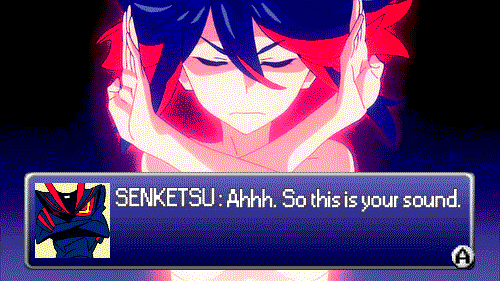
Of course, I think it’s clear that Ryuko’s relationship with Senketsu is one among peers while Soroi takes on a fatherly role for Satsuki in the place of Soichiro, but Soroi is still someone whom Satsuki trusts with her whole heart and soul. As pointed out, it may very well be true that Satsuki didn’t have that kind of trust in Soroi immediately, but I figure it can’t have taken too terribly long for the relationship between them to become close. After all, as noted in the aforementioned episode 17 scene, even young Satsuki smiled for Soroi when she had stopped smiling at school. Satsuki wasn’t being genuine, yes, but she was still breaking her hard guise for Soroi, and 18-year-old Satsuki is even surprised that she wasn’t honest back then, implying that she feels they’ve been as close as they are since practically the beginning.
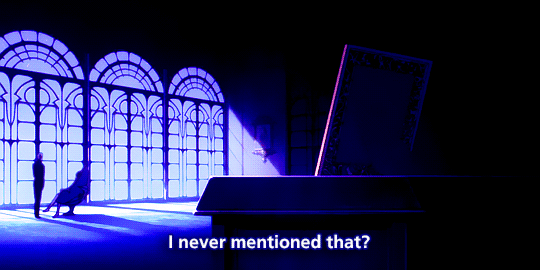
I know this got terribly long, but I don’t at all disagree that Satsuki had also been subjected to an isolating situation. It is lonesome to feel, as outlined in an early advertisement introducing Satsuki’s character, that “humans are clothes-wearing pigs” whom she must “dominate,” “rule over,” and “destroy,” all while “relying on no one.” It is awful to believe that you have to do everything all alone, without sharing your true self with anyone.
And it’s sad, too! Satsuki’s struggles to truly trust others lead her to inadvertently hurt the people she cares about, and there’s something especially tragic about how Satsuki used and manipulated her own sister—whom Satsuki was fighting for all along!—rather than tell the girl the truth and trust her. As I’ve written in the past, “While Satsuki is not truly against Ryuko, her plan prevents them from being close. The thought of Satsuki fills Ryuko with hatred… when they could have been allies and friends. Satsuki’s tired, sad frown as Ryuko returns to normal [after going berserk in episode 12], juxtaposed with the Mankanshoku family’s shock and Nui’s bemusement, does well in hinting that maybe Satsuki wishes she had Mako’s power herself… and she’s sorry that she doesn’t.”
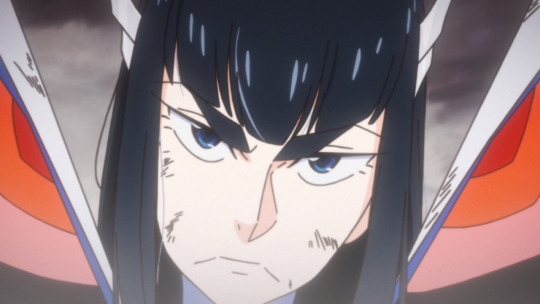
But more than all this, even Ryuko points out how alone Satsuki is after fighting Satsuki to a draw in episode 15. Ryuko only gets as far as she does by putting her complete and utter faith in Senketsu—and notably here, she follows through with his strategy even without knowing exactly what he intends to do—and she recognizes that Satsuki… doesn’t bond like that.
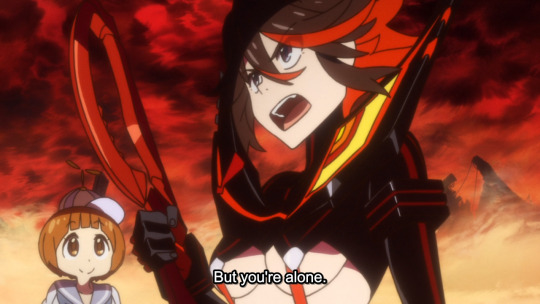
In pushing a point like this, I think the show definitely wants viewers to notice that Satsuki is stuck in a hard, isolating situation where she feels she can’t entrust her heart to anyone.
But I think the show also wants viewers to notice that Satsuki is more than capable of loving and trusting in the same way that Ryuko does. Ryuko doesn’t have a clue about someone like Soroi when she accuses Satsuki of being by herself, and as I’ve emphasized all throughout this monster of a post, I wholeheartedly believe that at least Soroi had fully earned Satsuki’s trust, even if it took a moment. Satsuki just about always had someone she felt safe with, whereas Ryuko… lost all that when her father abandoned her and didn’t find it again until she met the Mankanshokus and Senketsu. There’s a reason that one of Ryuko’s defining features is her loneliness, pointed out in her character introduction with the line, “Ever since I could remember, I was alone,” in her (and Senketsu’s) theme song “Before my body is dry” with lines like, “But I’m all alone,” and, “Don’t wanna be all alone,” in her fantasy world in episodes 20-21, and even by the cast, such as when the Mankanshokus note that Ryuko has to be super lonely to talk to her clothes or when even Ragyo tells Satsuki to go join her “lonely little sister” in death.
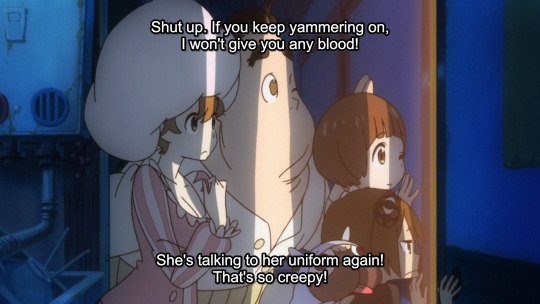
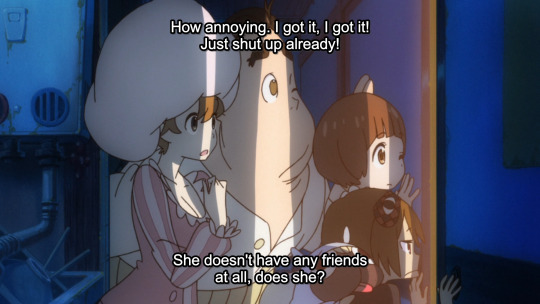
Ryuko gets a lot of heat for not being as strong as Satsuki upon learning her true origins, but I argue that you can’t really blame her. Even if Satsuki closed off her heart to most people, she undoubtedly grew up with a support system that Ryuko did not have until practically adulthood. Satsuki manages to keep her head up and carry on not only because of her immeasurable resolve and ambition, but also because she has a lifetime of love and support. Satsuki is not as alone as Ryuko claims (and I’d really like the Satsuki-centric Kill la Kill the Game: IF to elaborate on Ryuko understanding as much), and I feel that Soroi is genuinely an unsung hero of Kill la Kill. Could Satsuki have been nearly as strong without his influence?
I guess this is maybe a bit off topic, though.
In any case, I definitely agree that Satsuki struggled to open her heart to others, and I definitely agree that this is a hard, sad, awful place to be in. Part of what makes Satsuki’s team-up with Senketsu near the end of the series so sweet to me is that it is here that Satsuki really begins to open up. She doesn’t look down on Senketsu, she acknowledges his feelings, and in a cut moment from the script, she even outright tells him to wear her, thereby fully and completely trusting him to work with her and save Ryuko. Senketsu noting that his and Satsuki’s “hearts are as one” in episode 21 is one of the most heartwarming things in the entire anime when you consider everything that Satsuki has gone through. She’s been afraid to trust and afraid to show her true self to anyone, and yet… to save her sister, she opens up her heart to someone she had once considered evil and incapable of love.
And after this? Satsuki, despite saying in her introduction that she will be “bowing down to no one,” bows down to Ryuko.

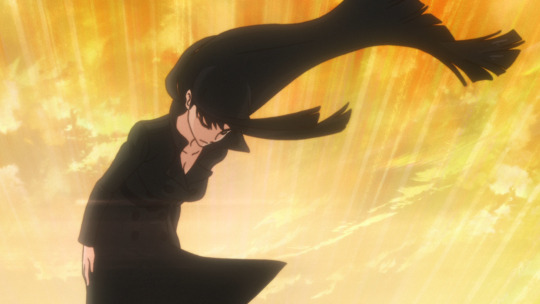
And she smiles openly.
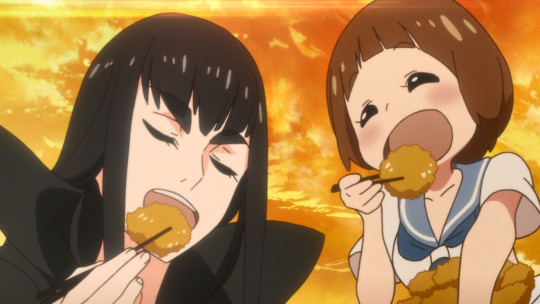
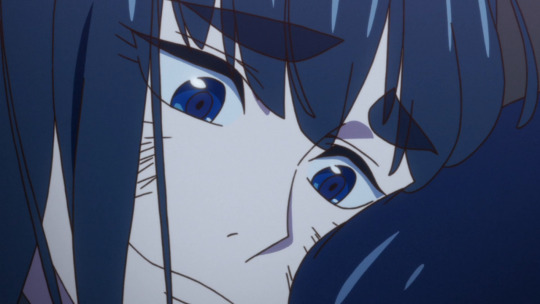
She laughs.
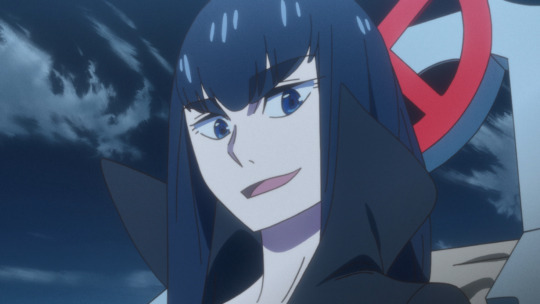
Satsuki was absolutely stuck in this lonesome, isolating position. But just like Ryuko, she gets out of it—and just like Ryuko, it’s so incredibly, incredibly sweet that she does.
#kill la kill#satsuki kiryuin#mitsuzo soroi#ryuko matoi#isshin matoi#soichiro kiryuin#senketsu#Anonymous#replies#ramblings#klk meta#gifs i made#whoops sorry this got way more out of hand than i expected ^^;#also dang i never realized how many 's'-names are in this show
68 notes
·
View notes
Text
EP2 reread notes, Part 1
It’s been a long time, but my Umineko reread has been slowly progressing! Here is a long-overdue update.
My readthrough of Episode 2 has actually been complete for months. This episode is both particularly important to me and covers a lot of particularly sensitive material, and as such I was hesitant to just post my rough notes in mostly unedited form as I did with the first episode; I really wanted to make sure I could properly express a lot of things about this episode in particular, and to that end I’ve been fleshing out my notes into a more substantial commentary this time.
As such, it seems appropriate to split this one into multiple posts. I’d like to hope I can get the others out fairly soon, now that a lot of the draft has been fleshed out! But for now, here’s the first part of this episode, focusing on Shannon’s half of the flashback arc.
Prologue
* The way George's narration in the intro is worded really does emphasise just how much he values his relationship with Shannon primarily as feeding into his own self-worth, making him feel like he can play the part of the "guy teasing the girl he likes" when that's always been something that he's only been able to look at enviously from the outside before. It practically comes across like he's using her to act out his own pre-existing personal script for his "dream romance" a lot of the time. It always bothers me that Ryukishi captures these disturbing nuances so well, but doesn't really seem interested in following through on critically exploring them with George the way he does with his other characters...
* Well, I suppose you could say that Yasu values George for basically the same reason, that he makes her feel like "someone who can know love" when she sees that as an unattainable dream for herself. It's sort of interesting to me in theory to think of the George/Shannon relationship through the (very cynical) lens that it basically amounts to two people both using the other as a piece to achieve happiness for themselves, but it's hard for me to really see that as an equal thing when the whole dynamic is so transparently skewed towards George happily getting to achieve his dreams and play out all his personal fantasies with no worries while Yasu is quietly making all kinds of agonising internal compromises with herself in the background.
* The metaphor that Shannon uses about the huge tank at the aquarium "being no different from an infinite sea to the fish swimming inside" always really gets to me. I think the whole concept of being able to define your own reality and the idea that "if I just believe I'm happy, then I am happy" is one that feels very personally familiar and important to me, so Yasu's particular idea of "magic" and the way Umineko is built around exploring that is a big part of what makes it resonate so much with me. I always have mixed feelings about what Shannon expresses here; I think there's a lot of genuine truth and power in the sentiment (a lot of the value of life really does come down to what you perceive it to be), but at the same time I sort of feel like if you've reached the point of consciously telling yourself "my world is complete to me as long as I don't know what I'm missing" as a coping strategy, then by necessity that means you've already kind of gone past the point of being able to wholeheartedly believe in that illusion. In a way, that's what Beatrice ultimately breaking Shannon down represents. But at the same time, I still sort of find myself wanting to say that consciously struggling to "build a self-contained world for yourself" in that way can still lead to a valid and genuine sense of fulfilment, even so - and in a broad sense I think being able to find peace and satisfaction in something that you know to be imperfect is a skill that everyone has to learn to an extent.
* This idea also pretty much sets the stage for one of the main themes of the episode as a whole. The fish tank metaphor represents Shannon's attitude to her relationship with George that amounts to "This love can obviously never really happen, but I can create an illusion of love that will be real to us", and trying to convince herself that that's fine; much of the conflict between Shannon, Kanon and Beatrice that follows in the rest of the episode is centred around Yasu fighting with herself over whether she really can feel content with that much or not. In contrast, George's immediate thought in response is basically "However big it might be, it still just looks like a tank to me", which...well, it's no surprise that Yasu is so afraid of what might happen if he finds out that his relationship with her isn't really his dream come true, but an attempt to create an indistinguishable illusion of that dream being possible. It's vital for him to remain ignorant of the fact that their "tank" isn't actually an infinite sea.
* God, George is awful. That's all I've got to say about the rest of this sequence. I'm tired of talking about George.
* The whole scene at the shrine is really powerfully written, and possibly the first part of the series where we really hear the unfiltered voice of "Yasu" speaking. The symbol of the shrine mirror as a metaphor for Shannon's unchanging fate and the obstacle to Beatrice's resurrection takes on all kinds of new dimensions given everything that mirrors mean to Yasu; the thing that Yasu needs to destroy in order to become "human" in her eyes is "her self", her own reflection in the mirror. The physical reality of her own body prevents her from being the person she wants to be - a sentiment that goes way back to Yasu's feeling as a child that the reality of her own pitiful face reflected in the mirror was a threat to her image of herself as the great witch Beatrice. The way Yasu translates these pre-established parts of her personal mythology into a new context to convey how she feels about her present situation always feels very authentic to me.
“Furniture”
* And now we flash back to the origins of Shannon's feelings for George. I do find it a little easier this time to understand why George noticing and unobtrusively helping to smooth things over for Shannon when she made mistakes was so touching to her; she's so used to being unnoticed and taken for granted as a servant that it would mean a lot when George showed consideration for her as a person. And I do appreciate that his "humble-bragging" moment afterwards is framed as totally transparent and that he's willing to laugh at himself when Jessica mocks him for it too; I can see why a little flaw like that could seem endearing and humanising to Shannon from her perspective at the time, in the sense that it makes him feel approachably human and not just "admirable".
* Well, like I think yumeta said on Goats, Shannon and George's dynamic actually seems okay when they're allowed to mutually acknowledge and laugh about each other's "childish points" together, but it's when George gets in the creepily patronising role of talking about "rules" and "orders" and gleefully enjoying one-sidedly making her uncomfortable that it gets really gross to me... Unfortunately, George is really specifically invested in feeling like he's "becoming an adult" and "overcoming his childish phase" through this relationship, so it feels like he ends up actively working to stay securely in control of their dynamic as much as he can to prove that he's "a real man" or whatever. Being honest about his immature aspects and letting Shannon poke at his "cute points" too much probably hits too close to his insecurities for him to be willing to keep it up for all that long - which is a shame because I think that's probably the kind of relationship Yasu feels most comfortable with, as you can see from BeaBato.
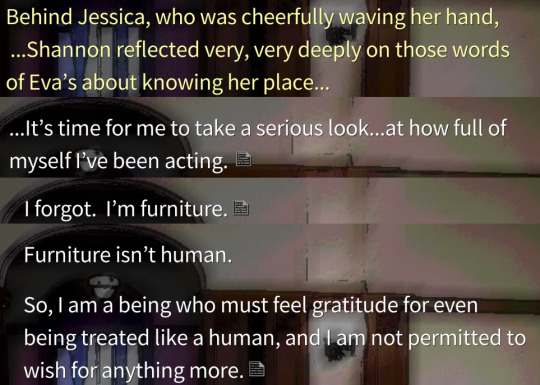
* The way the narrative transitions between these two scenes gives a lot of insight into how things like this must have influenced Yasu's current view of herself. The memory of Eva's whole "you're not worthy of George, know your place you servant" rant in the past becomes a reminder to Yasu in the present, something she uses to reinforce to herself that she was foolish to think she could be anything more than furniture; this scene really makes it easy to see how Yasu finding out the truth about her body would have just fed even deeper into reinforcing these kinds of messages about her "inferior, unworthy, subhuman" position that she'd already been receiving her whole life because of her social status. Those two parallel aspects of her seeing herself as "furniture" definitely feed into each other a lot, and the subsequent scene with Natsuhi abusing her just goes on to further hammer this home; the idea that Yasu is less than human is something that her environment has drilled into her for a very long time, even without taking into account the issue of her body.
* At the same time, though, I think it's important to note the implication that Yasu evidently refused to meekly accept Eva's words at the time and did keep pursuing her relationship with George regardless. It's clear that Yasu's lifelong mistreatment as a servant alone *wasn't* enough to totally crush Yasu's sense of self-worth; continuing to pursue a relationship with someone so "far above her station" shows that despite everything around her reinforcing her inferior position, Yasu was still able to believe strongly enough in her own right to happiness that she was able to actively reject that deeply ingrained impulse to resign herself to her current misery on the grounds that she should just be grateful for what she had. A big part of the tragedy here is that it feels like Yasu having her status as subhuman and unworthy of love physically "confirmed" to her when she solved the epitaph really pushed her straight back into those terrible thought patterns, just as she was starting to cast them off.
* But even after enduring all of that, Yasu still can't bring herself to totally give up and accept that she can do nothing but resign herself to a fate of being furniture - instead she ends up fighting with all she has to overcome that subhuman status in a different way, as portrayed through Shannon's use of "Beatrice's magic" here. Much as it might be easy at first glance to dismiss Yasu's concept of herself as furniture as passive and self-defeating, I think it's important to note that her narrative is specifically centred around her desperately fighting AGAINST that perception of herself and trying to overcome it in whatever way she can, even with everything around her constantly trying to push her back down into the resignation and stagnation that "Shannon" represents. I feel like it's really missing the point to frame Yasu's pessimism about herself as primarily a problem of her own innate personality, rather than a problem of her initially strong hopes for herself being slowly crushed and eroded as an inevitable consequence of her brutal circumstances and the awful environment she's had to adapt to.

* The particular way that Beatrice tempts Shannon into breaking the shrine mirror - in other words, into going through with testing the explosives - is very illuminating in terms of what pushed Yasu over the edge. If love is the all-important "single element" and the only thing that can make a person's life worthwhile, then continuing to live in her "body incapable of love" would be dooming Yasu to a hollow and meaningless life, as far as she's concerned. On the other hand, if Shannon continues to "deceive" George by hiding the truth about her body, using "magic" to make that illusion real, then she can live as if she was a real human for a time - but the further she goes with that, the further she goes past the point of no return and commits herself to having to create the catbox in the end to preserve that love, because it can't last indefinitely. But as Beatrice puts forth, isn't that still better than living a hollow life forever?
* And of course the wonderful Kanon-kun comes to the rescue, driving Beatrice off and telling her to stop trying to lead Shannon astray. But Beatrice isn't concerned, because she knows her words have left their mark - as evidenced by the butterfly marks on Shannon and Kanon's hands. Even the framing of the narrative itself is designed to reinforce that sense of inevitability; at this point we've already witnessed the scene where Shannon breaks the mirror, so we "know" - as Yasu "knows" - that Shannon isn't going to be able to resist in the long run. Yasu just isn't able to resign herself to being unhappy forever; she'll take her chance at happiness even knowing it's likely to lead to ruin.
* And honestly, even though Yasu frames that as Shannon giving into an evil temptation, is it really so evil to want some level of happiness? What Shannon wants is only what any "normal" person would automatically be entitled to. I think Yasu's "Beatrice" in this episode generally becomes a lot more sympathetic when you understand that her anger at Shannon basically comes down to her refusing to accept her assertion that her miserable situation is fine as it is, and that she doesn't need or deserve anything more - because, frankly, Shannon *is* wrong about that. That genuinely is a messed up attitude. But of course, the other side of that is that, in the course of arguing that Shannon isn't fine as she is, she's also putting forth that her current state is truly miserable and pathetic and unfixable without resorting to drastic measures - and there's obviously a ton of unealthy self-loathing in that too, in a different way.
Wonderful Utopia
* Aaand then we flash forward into the future to show that George and Shannon's relationship is going smoothly, and Jessica and Shannon are talking together happily about it. This is a little dark when you consider the implication in light of the preceding scene (because Shannon gave in and accepted Beatrice's "magic", everything is going fine).
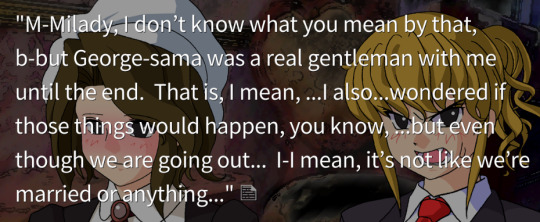
* This is really yet another thing that shows a huge amount of courage from Yasu when you think about it; Yasu was totally aware that going on an overnight trip with George could easily lead to her body being exposed, but she still went along with it. She was willing to risk "breaking the magic", even though that should have been unthinkable if she totally believed Beatrice was right about her relationship with George. Like Ryukishi said in the Answer interview, it must have been a very complicated feeling for Yasu when she found out that George booked separate rooms for them after all; of course she'd be glad not to be exposed in the short term, but in a way, it might have been a relief for her to have been "forced" into confessing the truth and taking the reaction as it came, to have the choice taken away from her. This is pretty much the same mindset on which Yasu ends up building the whole mystery roulette - deep down, she wants someone to stop her and "make her confess", so she gives the survivors all kinds of openings to "expose her", but she still needs someone to corner her into revealing everything. The fear of the consequences makes it impossible for her to step up and do it of her own accord. Even so, taking that kind of gamble with George here at all must have taken a lot of bravery...
* In contrast with Beatrice's mockery and derision of Shannon in the previous scene, now that Shannon has "accepted her" Beatrice is very friendly to her. The whole arc here, with Beatrice acting at first like she's truly happy for Shannon and George and has their best interests at heart and Shannon coming to see her as a friend, but then eventually revealing her true nature as an evil sadistic witch who was deliberately tormenting Shannon by making her know a happiness that she couldn't ever really be allowed to have...it totally works as its own story on the surface level, so nothing seems "off" about it on first read, but it really does hurt so much when you understand that it's Yasu reflecting back on her decision to keep pursuing love despite knowing she's "furniture", and how she tried to pretend to herself that that was a pure and noble thing when it really ended up being just a cruel way to increase her pain and deceive both George and herself with the false promise of a relationship that could never be fulfilled.

* The way Beatrice is so persistent, even while still maintaining her friendly facade, in reminding Shannon not to "get too full of herself" and forget that her love is only possible because of Beatrice's magic - in other words, not to delude herself into thinking that George and Shannon's love might actually go deep enough to survive the revelation about her body - is extremely upsetting. I don't actually think she's wrong about this (that George is really in love with an "illusion" of Shannon rather than Yasu herself), though to me that's more a testament to George being a jerk than to Yasu being fundamentally unlovable - but I think the genuine truth in what she's saying makes it a lot harder for Yasu to shrug it off.

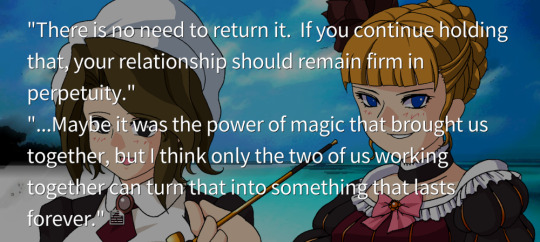
* This part makes it clear that Shannon's attitude has changed quite a bit since we saw her hopelessly lamenting earlier. She concedes to Beatrice that her relationship with George could only have started because of her magic - but she wants to believe that, now that their relationship has progressed this far, she doesn't need that magic any more. She wants to believe that their love has become strong enough that it can survive George finding out the truth. And that “should” be the case, right? If everything George says about the strength of their love is true, it should be able to overcome that kind of barrier easily. That's why Shannon was willing to take that risk of going on an overnight trip with George. Beatrice sort of indulgently agrees for now, but she also insists that Shannon keeps the brooch around just in case she does want to use it again; as much as Yasu would like to totally believe that George would accept her, she can't abandon the catbox as a fall-back option.
* It really hurts to read this because Yasu obviously really, really wanted to believe in what Shannon is saying - it's really easy, and heartbreaking, for me to imagine Yasu originally choosing to keep going with George knowing that she was only constructing an "illusion" and that the magic would have to end some day, but then as things went on, to start to let herself believe that, you know what, maybe love could conquer everything! Maybe there's hope for her to live as a human after all! But it also makes perfect sense to me that Shannon ultimately "loses" to Beatrice on this, because the reality of the signals George was giving her (laughing off and dismissing any tentative attempts Shannon made to bring up her issues or to question his perception of their relationship and the picture he was painting of their future) make it very, very hard to believe he would really react well to hearing the truth.
*Another aspect of this is that...well, from Yasu’s perspective, the longer she goes without revealing the truth to George, the more chance there is for George to become strongly invested in her as a person and to develop the kinds of resilient feelings that could theoretically withstand the revelation about her body - but also, the more devastating the potential fallout becomes when George finds out about her “keeping this secret for so long” and “letting things proceed this far without telling him”. I’m hesitant to talk too firmly about this, but I think that kind of uncomfortable balancing act in terms of considering "when to tell your partner” is probably something a lot of people in similar situations to Yasu can relate to, and it’s remarkable to me that Ryukishi is able to capture the stress of that kind of situation so well.
* The way Shannon reflects on Beatrice's underlying loneliness and how she becomes a lot more approachable when you get to know her is really sweet and endearing! The way Yasu writes Beatrice's character here in her "friendship" with Shannon is very consistent with the image of Beatrice we get from Maria's (and even Natsuhi's) scenes with her later - of someone who seems like an intimidating, all-powerful witch on the surface, but actually has a lot of endearingly cute and childish traits once you get to know her, getting all excited over the sweets Shannon brings her from Okinawa. It really comes across here, just as it does with Maria, that she's really desperate for company and genuinely overjoyed to have someone to talk to since she's been trapped on the island for so long - she may be "all-powerful" in magical terms, but the loneliness of living in an environment where no one else can recognise or acknowledge that power, and the unexpected joy of having someone who can actually see it and be grateful for her use of it, is also evident.
* I really like how those things that Beatrice's character expresses about Yasu still translate so strongly when she's being written into a completely fictional, metaphorical scenario - the person who Beatrice is enjoying being able to help with her magic and receiving gratitude from here is...well, uh, herself, in pure physical terms, but the reaction that Beatrice would theoretically have to Shannon as a separate person in this fictional narrative also expresses important things about her character. Aah, I just really love the unique way Yasu is characterised through these constructs, it's so clever and multilayered and I could gush about it endlessly, ahaha.

* And once again, Kanon comes along to break up this chat and scold Shannon for listening to the witch. God, Kanon and Beatrice's mutual antagonism in this episode is really intense. I'll talk about it a lot more when we get to the more Kanon-centric parts of this episode, but they really do hate each other a lot, and the things that mutual hatred expresses about Yasu's self-loathing always hit me particularly hard.


* It's amazing how easy it is in hindsight to read this scene as Yasu wrestling with herself; it all flows very naturally once you understand what they're really talking about. Yasu really wants to believe she can overcome her being "furniture" by achieving love, but Kanon represents the part of her that remains cynical about that possibility; he believes that she's letting Beatrice delude her into mistaking the illusion of love she's created for something real. He's kind of right, too; though I absolutely don’t believe it’s impossible for a strong love to withstand something like Yasu’s secret in principle, Kanon is right that George and Shannon's relationship isn't really the perfect fairytale love that Shannon would like it to be, and Shannon really has put herself in a very dangerous and precarious position by letting her relationship with George proceed this far. At this point, though, Shannon seems stronger than Kanon; she's optimistic enough about George right now that she wants to believe she doesn't need Beatrice's magic any more.
* It's sort of important to note that Kanon and Beatrice are pretty much aligned on their view of Yasu's situation - yeah, it sucks and it's hopeless, she's totally furniture, George won't accept her at all - but their opinions on how Yasu should respond to that are very different. Again, though, that's probably best saved for when we get more into their interaction...
* Regardless, for now, while Shannon is in this positive frame of mind, she decides to give Kanon a chance at Beatrice's "magic" too, lending him the brooch. And note the implication here - if Yasu is really so happy and optimistic about Shannon's relationship with George, as this scene tries to push so hard, then why does Kanon still need to be given a chance? This sort of implies to me that Yasu's not as confident in George's acceptance as she might want to admit; it's kind of ugly to say that Yasu might have been partly thinking of Jessica as a "backup plan", as Confession puts it, but there is an element of that in here. But I'd also argue that Yasu wants Kanon to try to pursue love because the idea of gaining happiness as Kanon specifically is so important to her that she needs to check out that possibility too.
* Kanon grudgingly decides that "maybe he might learn something if he tries this magic" - in other words, despite his skepticism, maybe if Yasu did seriously try living as Kanon, it could make him happy in a way he didn't foresee. This gains even more weight in light of Confession - we know that hearing Jessica express interest in Kanon gave Yasu a totally unexpected rush of euphoria. This new gambit, to give Kanon a chance of "magic", is informed by that - Yasu has to try to pursue and explore that new sense of happiness she experienced back then, even with Shannon already being in such a committed relationship with George.
* In a way, it's sort of interesting that Yasu's decision to pursue love with Kanon comes at a point when Yasu is feeling more optimistic about herself - at the point where she's able to try to tell herself that "love can overcome being furniture", and where she's willing to take risks like the overnight trip with George on that basis, even though Kanon and Beato's words of warning obviously represent her lingering doubts about that. Kanon normally shows so much pessimism about himself that trying to achieve love himself would be unthinkable - if Yasu's unable to even fully believe in Shannon being able to achieve love, when Shannon is so intentionally designed to be lovable and to compromise Yasu's internal self to that end, then how could Kanon possibly have a chance? But when Shannon momentarily experiences hope through her own relationship and becomes more optimistic about herself for a while, that sort of serves as a stepping stone to letting herself believe that maybe Kanon’s chances might not be so remote either. I guess you could say that's something good that came out of the George/Shannon relationship, although when all was said and done Yasu probably regretted making things even more complicated for herself by opening up this avenue too...
* And that’s as good a stopping point as any. Next time, I get to talk more about Kanon-kun, which is always very exciting!
25 notes
·
View notes
Note
(1) I was thinking about why Archie reacted the way he did to Veronica’s inability to say, ‘I love you.’ I mean, besides the obvious. It sucks when you make yourself vulnerable and the other person isn’t willing or able to allow themselves to be vulnerable with you. It was suggested by Cheryl that his inability to hold down a relationship is linked to his mommy issues back in 1x10. He loves them and leaves them before they could leave him.
(2) For the first time, Archie isn’t in a position where he wants to leave. He wants to stay. And it’s also the first time that Archie is in a position where his feelings are (seemingly) not being returned. This is the first time Archie is getting rejected and he gets a taste of what that feels like. Betty professed her love and he told her he didn’t feel the same way. He was not able to give her what she wanted, and she had to accept that.(3) Now Archie gets to feel how much that hurts. I imagine this is why his thoughts went to Betty. He now understands how she felt and maybe that guilt is getting twisted up with the desire to be in an emotionally safe space where his love is accepted. It’s not a healthy thing in the slightest, but it’s perfectly human(4) If Betty rejects his advances and denies him that safety, he’s going to have to grapple with those feelings and fears of rejection, and hopefully, make him realize that love isn’t a transaction. It’s acceptance of the other person as they are. And if Veronica needs time to process, Archie loving her would be allowing her that time. What are your thoughts?
I mean, are we taking his relationship with Grundy and Valerie into account? Despite the fact that the relationship with Grundy had a power unbalance, Archie, in his naivety, did consider that a relationship. He blamed himself for her getting ran out of town, and probably blames himself for her getting killed. I wonder if Archie’s thoughts about that relationship has changed over time or not (tsk, unanswered questions, ras).
And then there is Valerie. Seeing how … possessive Cheryl is toward the people she has a romantic interest in, I’m 99.9% sure Cheryl had something to do with that break-up. She definitely set a few plays in motion before Valerie dumped Archie (and before others yell at me, I do think Valerie had all the right to dump him if he wasn’t giving her what she wanted).
So I think there has been moments where Archie was the one who got ‘left behind’ before (unless I misunderstood your point). And when he tried to fix things with Valerie in 1.10, she rejected him and he faced public humiliation after she dumped that drink on him. When he asked Veronica out in 1.11, Veronica told him that they had to pretend like nothing between them ever happened. So I would say he’s gotten rejected before too.
But in terms of the pilot, I do think Veronica dumping him by not being able to say the L-word is a glaring parallel to what occurred between him and Betty.
I actually really enjoyed Jughead’s narration this time around, apart from usual pretense that every ambitious 16 y/o novelist has. The metaphor of the snakes and ladders board game, and how in one clean swoop, they all fell down and are now free fallin~~ (*Insert Tom Petty song here* )).
I always aligned Betty and Archie together symbolically. Both are kids next door, “good kids” raised on the right side of the track, kids with promising (comfortable) futures – Meanwhile, Jughead and Veronica are both outsiders but for opposing reasons. Jughead comes from a poor family; Veronica comes from a rich family. Yet they are very similar. Contrary to Betty and Archie, both Veronica and Jughead are considered the ‘bad kids’. Veronica herself called her family (including herself) sinners; Jughead is stuck in this cycle of gang violence. Both are surrounded by darkness; different kinds of darkness, but still dark. (How many times have I said dark?)
I’m about to sound like a nerd right now, but I also look at the core four as Archie and Betty being the ‘home base’. They are the center of a x/y axis graph. Jughead is below them and Veronica is above them (social politically and financially, I guess; lol I was looking at it more poetically than that, but this works too). It’s always been Archie and Betty together in that home base (been next door neighbors since they have been 4 y/o, always been in the same class, best friends) while growing up. They slowly came out of that ‘home base’ when betty started dating Jughead, and when Archie started dating Veronica. Jughead and Veronica both pull Betty and Archie outside of their home base.
So going back to the free~ free fallin’~ metaphor: in this state of falling that Jughead spoke about, Archie and Betty fell right back into that “home base” again and found each other. It’s always been Archie and Betty since they have been four years old. And I think Archie and Betty, both in a state of heart break, find comfort in knowing that at least they have one person there for them (and not in a romantic sense. Just in human connection, sort of way. avoiding loneliness).
Note how Betty asked Jughead how many more times will they keep pushing each other away, and Jughead’s answer “until it sticks.” And parallel that with Veronica’s words, “I’m sorry but I can’t let myself go there with you.” And the entire blocking of the scene too: both Jughead and Veronica walking away from them while Archie and Betty stay behind, just standing there, watching them as they go. The formula for these breaks up were pretty similar, just with different variables at play.
But … I don’t think I responded to your comment yet. Lol. I do think Archie has a very fragmented idea of love. He’s too eager, too readily earnest to love. So when that wasn’t reciprocated, I think Archie probably did sympathize with Betty from 1.01, and I think he might try to place his friendship w/ Betty as a band-aid for his own heart break. Almost like a placeholder.
I think that final scene at the window was them recalling a time when it was just them two without Jughead and without Veronica, back to “simpler” times. It’s almost like, “Even at my lowest point, I know I can always count on you.” And I think if they do explore b/rchie romantically, it’s gonna be like Archie and Betty trying to go back in time before Jughead/Veronica, back when everyone thought “b/rchie was endgame,” and try to reset themselves to that trajectory.
Of course this is assuming b/rchie is explored w/ both of them reciprocating, which is not a guarantee. But I think my point still hands and can be applied to either Archie and betty individually as a one-sided thing, regardless.
Betty already had those feelings of “b/rchie is endgame” and “taking things to the next level” with Archie back in 1.01. She had fantasies of being the power couple, the football player dating the cheerleader. She already did her time in that mindset. And I think what the writers are gunning for with this narrative is for Archie to explore that mindset now, but contrary to Betty’s innocent fantasies back in 1.01, Archie’s will be born out of fear of loneliness and rejection.
And to be honest, I think the set up for Varchie’s break up was weak and sloppy. I didn’t think varchie had enough history together on screen for them to had broken up that way. it definitely felt forced and done out of necessity for the plot instead of allowing that to develop naturally, but I’m gonna accept it (begrudgingly). But yes, Archie being patient and waiting for her will definitely repair Archie’s fractured idea of love.
And let me add this quickly before this goes any longer than it is, I think Archie sees love as a measure of self-worth. He asked Veronica “why do I keep doing this?” and “I’m messed up” the night of the party after Valerie told him that they are over for good. He called himself stupid and selfish the night Alice ran Grundy out of town. He called Betty perfect and he not being deserving of her in 1.01; and even in 2.01, he told Veronica that he doesn’t deserve her. So I do think he sees love as a measure of self-worth, and he already has low self-esteem as it is so he craves love in order to feel full-filled? Not sure if thats the right word but it works?
That being said, he still isn’t arrogant about it. He’s not flaunting the fact that people find him attractive. He rejected Betty because he couldn’t give her what she wanted. So even when he does want to feel love, he is still cautious when navigating those love connections.
i rambled. let me know if i don’t make sense. lol
25 notes
·
View notes
Photo

BEAUTIFUL QUALITIES of Muslim WOMEN 10 beautiful aspects of a Muslimah 1. Her Obedience to the Creator: A practicing Muslim man loves to have a practicing Muslim wife; who knows that the life of this world is nothing but a test from her Lord; giving her an opportunity to come closer and closer to Allah, doing more and more good deeds to please Him Azza wa jal, restricting herself from the desires of her inner self that go against the will of her Creator. But as for him who feared standing before his Lord, and restrained himself from impure evil desires, and lusts. Verily, Paradise will be his abode. (Surah An- Naaziyaat: 40-41) 2. Her Haya (Modesty/Shyness): Haya is one of the most significant factors of a woman’s personality. Haya according to a believer's nature refers to a bad and uneasy feeling accompanied by embarrassment, caused by one's fear of being exposed or censured for some unworthy or indecent conduct.[1] Prophet Sallallahu alaihiwasallam said: "Haya comes from Eman; Eman leads to Paradise. Obscenity comes from antipathy; and antipathy leads to the fire." (Sahih Al-Bukhari) A Muslim woman feels shy to do anything that would displease her Lord in any aspect. She has haya in her talk, she has haya in her gaze, she has haya in her clothing, she has haya in her walk. Her haya in her talk is that she is not soft in her speech but speaks honorably. Allah subhanahu wa ta’ala says (interpretation of the meaning): “O wives of the Prophet! You are not like any other women. If you keep your duty (to Allah), then be not soft in speech, lest he in whose heart is a disease (of hypocrisy, or evil desire for adultery) should be moved with desire, but speak in an honorable manner” (Surah Al-Ahzaab:32) Her haya in her gaze is that she does not look at what Allah subhanahu wa ta’ala has prohibited for her to look. Allah subhanahu wa ta’ala says (interpretation of the meaning): And tell the believing women to lower their gaze (from looking at forbidden things), and protect their private parts (from illegal sexual acts)… (Verse continues) (Surah An-Nur: 31) Her haya in her clothing is that she does not reveal to others what Allah subhanahu wa ta’ala has forbidden for her to reveal. Allah subhanahu wa ta’ala says (interpretation of the meaning): ...And not to show off their adornment except only that which is apparent (like both eyes for necessity to see the way or outer dress like veil, gloves, head-cover, apron, etc.), and to draw their veils all over Juyubihinna (i.e. their bodies, faces, necks and bosoms,) and not to reveal their adornment except to their husbands, or their fathers, or their husband's fathers, or their sons, or their husband's sons, or their brothers or their brother's sons, or their sister's sons, or their (Muslim) women (i.e. their sisters in Islâm), or the (female) slaves whom their right hands possess, or old male servants who lack vigor, or small children who have no sense of the feminine sex.. (Verse Continues) (Surah An-Nur: 31) Her haya in her walk is that she walks modestly without attracting others attention towards herself. Allah subhanahu wa ta’ala says (interpretation of the meaning): . ..And let them not stamp their feet so as to reveal what they hide of their adornment. And all of you beg Allâh to forgive you all, O believers, that you may be successful. (Surah An-Nur: 31) Abu Usayd al-Ansari narrated that he heard Allah’s Messenger Sallallahu alaihiwasallam say to the women on his way out of the mosque when he saw men and women mixing together on their way home: ‘Give way (i.e., walk to the sides) as it is not appropriate for you to walk in the middle of the road.’ Thereafter, women would walk so close to the wall that their dresses would get caught on it. (Narrated by Abu Dawood in "Kitab al-Adab min Sunanihi, Chapter: Mashyu an-Nisa Ma’ ar-Rijal fi at-Tariq) A woman who has the knowledge of Allah’s commandment to preserve her modesty, submitting herself to the will of her creator, even after having the desire to be praised for her beauty, is without doubt beloved to Allah subhanahu wa ta’ala and as well as to all good believing men. 3. Her Beauty: Allah subhanahu wa ta’ala made women beautiful in the sight of men. It’s just that some human beings are more attracted towards some than others. Aishah RadhiyAllahu anha said: “I heard the Prophet Sallallahu alaihiwasallam saying: ‘Souls are like conscripted soldiers; those whom they recognize, they get along with, and those whom they do not recognize, they will not get along with.’” (Sahih Al-Bukhari) Al-Qurtubi said: “Although they are all souls, they differ in different ways, so a person will feel an affinity with souls of one kind, and will get along with them because of the special quality that they have in common. So we notice that people of all types will get along with those with whom they share an affinity, and will keep away from those who are of other types. [This is like the old saying goes, “Birds of a feather flock together”] For a believing man, a Muslim woman’s beauty is not just how her nose looks or how big her eyes are, but her modesty, purity of heart, and innocence make her look beautiful as well. Also Allah subhanahu wa ta’ala makes people whom He loves, pleasing to others. “When Allah loves someone he calls to Jibreel Alaihissalaam saying, ‘O Jibreel, I love such and such a person, so love him.’ Then Jibreel will call to the (angels) of the heavens, ‘Allah loves such and such a person so love him.’ And the angels will love [that person]. And then Allah will place the pleasure in the hearts of the people towards this person.” (Sahih Al-Bukhari and Muslim) 4. Her Intellect/playfulness: Intellect and playfulness are two qualities of women highly liked by men. Every man likes to have an intelligent wife who can advise and support him in day to day matters. Khadija bint Khuwaylid RadhiyAllahu anha was one of the most beloved wives of Prophet (peace and blessings of Allah be upon him). She supported Allah’s messenger (peace and blessings of Allah be upon him) at the very beginning of his Prophethood when Jibreel alaihissalaam brought the first revelation to him. Prophet (peace and blessings of Allah be upon him) always admired her and remembered her even long after her death. A playful wife is a joy and pleasure to a man’s heart. Prophet Sallallahu alaihiwasallam recommended Jabir bin 'Abdullah to marry a virgin so that the two could play with each other and amuse each other. Narrated Jabir bin 'Abdullah: "My father died and left seven or nine girls and I married a matron. Allah's Apostle said to me, "O Jabir! Have you married?" I said, "Yes." He said, "A virgin or a matron?" I replied, "A matron." he said, "Why not a virgin, so that you might play with her and she with you, and you might amuse her and she amuse you." (Hadith continued) (Sahih Al- Bukhari) 5. Her Truthfulness: Being truthful and honest is an essential quality of a believer. ‘Abdullah ibn Mas’ood RadhiyAllahu anh said: The Messenger of Allah Sallallahu alaihiwasallam said: “I urge you to be truthful, for truthfulness leads to righteousness, and righteousness leads to Paradise. A man will continue to be truthful and seek to speak the truth until he is recorded with Allah as speaker of truth (Siddeeq). And beware of lying, for lying leads to immorality and immorality leads to Hell; a man will continue to tell lies until he is recorded with Allah as a liar.” (Sahih Al-Bukhari and Muslim) A person who is known to lie repeatedly loses his trust. And if that happens in case of a marital relationship the whole relationship falls apart. A woman who is known to be a “Siddeeqah” certainly has a higher status in a Muslim man’s heart. 6. Her Obedience: Allah Subhanahu wa ta’ala made man protector and maintainer of the woman and enjoined upon her to obey him in all the matters that do not go against Quran and Sunnah. Allah subhanahu wa ta’ala says (interpretation of the meaning): “Men are the protectors and maintainers of women, because Allah has made one of them to excel the other, and because they spend (to support them) from their means” (Surah An-Nisa’: 34) The Messenger of Allah Sallallahu alaihiwasallam said, “The best women is she who when you look at her, she pleases you, when you command her she obeys you, and when you are absent, she protects her honor and your property.” (At-Tabarani, Ibn Majah) 7. Her Patience: Patience is a characteristic that can never be praised enough. A woman who remains patient at the times of hardship and relies on the help and mercy of Allah is without a doubt a beloved servant of Allah subhanahu wa ta’ala. Allah says (interpretation of the meaning): “And Allah loves As-Saabiroon (the patient)” (Surah Aal Imran: 146) 8. Her Cooking: Delicious food is without a doubt weakness of men. It’s an old saying that “The Way to a Man's Heart is through his Stomach”. We also know that one of Prophet’s (Sallallahu alaihiwasallam) wives used to cook food that he liked a lot and due to that Aishah radhiyAllahu anha would get jealous, because she didn’t know how to cook that. 9. Her Contentment with Rizq: No man likes to have a woman who is always complaining about how less her husband earns or how rich her other friends are. A good Muslimah is the one who thank Allah for what He has blessed her with and she is thankful to her husband for what he provides her with. Abu Hurairah RadhiyAllahu anh reported: The Prophet Sallallahu alaihiwasallam said, "Richness is not the abundance of wealth, rather it is self-sufficiency.'' (Sahih Al-Bukhari and Muslim) 10. Good Manners: A woman of good manners is a blessing from Allah subhanahu wa ta’ala. When she speaks, she speaks honorably, why she deals with others she deals with them kindly. She is polite with elders, loving to children, and good to her fellow folks. It is related by 'Abdullah bin Amr that the Prophet Sallallahu alaihiwasallam said: "The best of you are those who possess the best of manners." (Sahih Al-Bukhari and Muslim)
3 notes
·
View notes
Text
INTERVIEW: Mia Alvar

If you do anything this month, let it be Mia Alvar’s In the Country (Vintage, 2015). The book’s a transformative experience and recipient of the PEN/Robert W. Bingham Prize for Debut Fiction, the Janet Heidinger Kafka Prize and the Barnes & Noble Discover Great New Writers Award. As NPR’s Maureen Corrigan put it, Alvar is “the kind of writer whose imagination seems inexhaustible, and who stirs up an answering desire in her readers for more and more.”
Lucky for us, Mia brought her sparkling brain to Ace Hotel New York, where she was recently a writer-in-residence. As a Dear Reader author, she penned a letter to an imagined audience of hotel guests, to be placed bedside in all guest rooms at a later date. To mark the occasion, we caught up with Mia to talk about the importance of false directions, why everyone should read Carlos Bulosan, and the necessity of fingerless gloves.
If you could correspond with any fictional character or literary figure via letters, who would it be? And why?
MIA ALVAR: A character whose mind I’d live in if I could is Linnet Muir, the semi-autobiographical narrator in several of Mavis Gallant’s short stories. I’d be the insecure and dumb half of this sadly lopsided correspondence, but it would be worth it to soak in all her rich and clever insights on family and art, human nature and politics, travel and life. Inspired as Linnet is by her author, I guess this is my way of wishing I could know Mavis Gallant herself as a girl and young woman, whose fiction I would come to connect with so powerfully but whose early life story—as a child in Montreal and then a journalist on the eve of the Second World War, plotting her escape to Europe to become a full-time writer—remains exotic to me from where I sit in 2018 California.
Do you map out your writing, or do you discover your path as you go? How often does your work go in directions you never expected?
I like to have a map in mind, because writing with no destination is so anxiety-inducing for me I’ve never gotten a word down that way. The map might include milestones I want to hit in the life of a character, or a set of images and ideas I feel are connected but don’t yet know how, or even a general sense of where I want a story to end. These almost always turn out to be false directions: plotlines don’t work, characters I’ve spent pages on turn out to be nonessential, the map goes out the window. Surprises and discoveries are my favorite part, but at least in the beginning, some kind of skeleton gets me going.
Dear Reader tasks you with writing for an imagined audience of strangers. How much do you think about your audience when you write? Have you ever been surprised by who is drawn to your work?
At my desk, I tend to be obsessed on a micro level with just getting a story to work, a task that takes up way too much mind space to allow thoughts of who will read it. Also, when I feel skittish about certain material (like a heinous character, an event from recent history that feels raw, or anything I’m not sure I have the right to write about), it’s helpful in the early stages to pretend that there will never be an audience. But when I’m away from my notebook or laptop and not physically writing, I do have a sense of the effect I’d like my work to have, which is generally to appeal to both head and heart in some way. So my ideal reader is someone who reads from both those places.
Because I spent so many years in classrooms and writing workshops, I honestly forgot the possibility of being read by non-writers, who probably read more than I do but don’t necessarily spend their waking hours thinking about Writing with a capital W. I’m pleasantly surprised when my work lands for someone who is purely a reader first and foremost, who looks to books not to take them apart in an academic or technical way but in the hopes of being entertained or swept along.
What's a book that you wish more people knew about?
For people like me—Philippine-American writers who spent their adolescences searching the shelves for role models—America is in the Heart by Carlos Bulosan is a huge and not at all obscure book, but outside of that circle I believe it could use more love. It’s a first-person, autobiographical novel about a Filipino migrant worker in California and the Pacific Northwest in the 1930s and 40s. It speeds from farm to cannery to fishery throughout the states where the protagonist seeks work, and it describes in painful detail the racism and inhumane conditions he meets along the way. It’s as moving a coming-of-age story as I’ve found anywhere, not so much from child- to adulthood but from peon to activist and artist: Bulosan became a leader in the movement for migrant farm workers’ rights as well as a prolific reader and writer, mostly after illness shut down his body and made manual labor impossible.
Do you have any rituals, ceremonies or requirements that accompany your writing process?
I’m always cold, so my ritual usually involves bundling up: scarves, hoodies, blankets, socks, and gloves (fingerless, to allow typing) are essential. Otherwise my process consists pretty simply of reading with a notebook handy. I take lots of longhand notes while reading up on a time period or place for research, or reading stories that employ some craft thing (an unusual structure or point of view) that I’m hoping to pull off myself, or reading poetry. As deadlines approach, I switch to the laptop to try and shape my jumbled notes into something that resembles a story.
Dear Reader is a collaboration between Tin House and Ace Hotel New York. Read this interview, along with other wonderful things, at Tin House’s website.
2 notes
·
View notes
Text
Garbage Language. Why Do Corporations Speak The Way They Do.
I worked at various start-ups for eight years beginning in 2010, when I was in my early 20s. Then I quit and went freelance for a while. A year later, I returned to office life, this time at a different start-up. During my gap year, I had missed and yearned for a bunch of things, like health care and free knockoff Post-its and luxurious people-watching opportunities. (In 2016, I saw a co-worker pour herself a bowl of cornflakes, add milk, and microwave it for 90 seconds. I’ll think about this until the day I die.) One thing I did not miss about office life was the language. The language warped and mutated at a dizzying rate, so it was no surprise that a new term of art had emerged during the year I spent between jobs. The term was parallel path, and I first heard it in this sentence: “We’re waiting on specs for the San Francisco installation. Can you parallel-path two versions?”
Translated, this means: “We’re waiting on specs for the San Francisco installation. Can you make two versions?” In other words, to “parallel-path” is to do two things at once. That’s all. I thought there was something gorgeously and inadvertently candid about the phrase’s assumption that a person would ever not be doing more than one thing at a time in an office — its denial that the whole point of having an office job is to multitask ineffectively instead of single-tasking effectively. Why invent a term for what people were already forced to do? It was, in its fakery and puffery and lack of a reason to exist, the perfect corporate neologism.
The expected response to the above question would be something like “Great, I’ll go ahead and parallel-path that and route it back to you.” An equally acceptable response would be “Yes” or a simple nod. But the point of these phrases is to fill space. No matter where I’ve worked, it has always been obvious that if everyone agreed to use language in the way that it is normally used, which is to communicate, the workday would be two hours shorter.
In theory, a person could have fun with the system by introducing random terms and insisting on their validity (“We’re gonna have to banana-boat the marketing budget”). But in fact the only beauty, if you could call it that, of terms like parallel path is their arrival from nowhere and their seemingly immediate adoption by all. If workplaces are full of communal irritation and communal pride, they are less often considered to be places of communal mysticism. Yet when I started that job and began picking up on the new vocabulary, I felt like a Mayan circa 1600 BCE surrounded by other Mayans in the face of an unstoppable weather event that we didn’t understand and had no choice but to survive, yielding our lives and verbal expressions to a higher authority.
Get unlimited access to Vulture and everything else New York
LEARN MORE »
Anyhow, I left the parallel-path job after six months — unrelated to the standard operating language, although I used a wad of it in my resignation.
Photo: Sam Edwards/Getty Images
In January, a very good memoir called Uncanny Valley was published. The author, Anna Wiener, moved to San Francisco from Brooklyn around 2014 to work at a mobile-analytics start-up, and one of the book’s many pleasures is how neatly it bottles the scent of moneyed Bay Area in the mid-2010s: kombucha, office dog, freshly unwrapped USB cable. Wiener talks about the lofty ambitions of her company, its cushy amenities, the casual misogyny that surrounds her like a cloud of gnats. The book hit me in two places. One of them was a tender, heart-adjacent place that remembered growing up in San Francisco, with its fog-ladled neighborhoods and football fields of fleece. The other was closer to my liver, where bile is manufactured. This was the part of me that remembered working at places much like the one Wiener describes — jobs that provided money to pay rent in a major urban area while I freelanced for magazines and websites that did not. Writing, it turns out, is an economically awkward skill. Despite the fact that it can’t yet be outsourced or performed cheaply by robots, it isn’t worth much. In the case of Anna Wiener (and maybe only Anna Wiener), this is a good thing, because it forced her to embed in a landscape that cried out for narration and commentary.
The status pyramid at most start-ups is roughly this: The C-suite sits at the pinnacle, followed by senior data and tech people, followed by non-senior data and tech people, followed by everyone else except customer service, and then, at the very bottom, customer service. Which, by the way, has been rechristened “customer support” or “customer experience” at most companies — as though the word service might remind the college graduates recruited for these roles that they will in fact spend their days pacifying irritable consumers over phone, chat, text, and email. Wiener worked in customer support.
Being the lowliest worm at a company offers observational advantages in that it renders a person invisible. Wiener describes watching her peers attend silent-meditation retreats, take LSD, discuss Stoicism, and practice Reiki at parties. She tries ecstatic dance, gulps nootropics, and accepts a “cautious, fully-clothed back massage” from her company’s in-house masseuse. She encounters a man who self-identifies as a Japanese raccoon dog. She’s a participant and an ethnologist; she’s impressed and revulsed.
Wiener writes especially well — with both fluency and astonishment — about the verbal habits of her peers: “People used a sort of nonlanguage, which was neither beautiful nor especially efficient: a mash-up of business-speak with athletic and wartime metaphors, inflated with self-importance. Calls to action; front lines and trenches; blitzscaling. Companies didn’t fail, they died.” She describes a man who wheels around her office on a scooter barking into a wireless headset about growth hacking, proactive technology, parallelization, and the first-mover advantage. “It was garbage language,” Wiener writes, “but customers loved him.”
I know that man, except he didn’t ride a scooter and was actually a woman named Megan at yet another of my former jobs. What did Megan do? Mostly she set meetings, or “syncs,” as she called them. They were the worst kind of meeting — the kind where attendees circle the concept of work without wading into the substance of it. Megan’s syncs were filled with discussions of cadences and connectivity and upleveling as well as the necessity to refine and iterate moving forward. The primary unit of meaning was the abstract metaphor. I don’t think anyone knew what anyone was saying, but I also think we were all convinced that we were the only ones who didn’t know while everyone else was on the same page. (A common reference, this elusive page.)
The hideous nature of these words — their facility to warp and impede communication — is also their purpose.
In Megan’s syncs, I found myself becoming almost psychedelically disembodied, floating above the conference room and gazing at the dozen or so people within as we slumped, bit and chewed extremities, furtively manipulated phones, cracked knuckles, examined split ends, scratched elbows, jiggled feet, palpated stomach rolls, disemboweled pens, and gnawed on shirt collars. The sheer volume of apathy formed an energy of its own, like a mudslide. At the half-hour mark of each hour-long meeting, our bodies began to list perceptibly toward the door. It was like the whole room had to pee. When I tried to translate Megan’s monologues in real time, I could feel my brain aching in a physical manner, the way it does when I attempt to understand blockchain technology or do my taxes.
I like Anna Wiener’s term for this kind of talk: garbage language. It’s more descriptive than corporatespeak or buzzwords or jargon. Corporatespeak is dated; buzzword is autological, since it is arguably an example of what it describes; and jargon conflates stupid usages with specialist languages that are actually purposeful, like those of law or science or medicine. Wiener’s garbage language works because garbage is what we produce mindlessly in the course of our days and because it smells horrible and looks ugly and we don’t think about it except when we’re saying that it’s bad, as I am right now.
But unlike garbage, which we contain in wastebaskets and landfills, the hideous nature of these words — their facility to warp and impede communication — is also their purpose. Garbage language permeates the ways we think of our jobs and shapes our identities as workers. It is obvious that the point is concealment; it is less obvious what so many of us are trying to hide.
Another thing this language has in common with garbage is that we can’t stop generating it. Garbage language isn’t unique to start-ups; it’s endemic to business itself, and the form it takes tends to reflect the operating economic metaphors of its day. A 1911 book by Frederick Winslow Taylor called The Principles of Scientific Management borrows its language from manufacturing; men, like machines, are useful for their output and productive capacity. The conglomeration of companies in the 1950s and ’60s required organizations to address alienated employees who felt faceless amid a sea of identical gray-suited toilers, and managers were encouraged to create a climate conducive to human growth and to focus on the self-actualization needs of their employees. In the 1980s, garbage language smelled strongly of Wall Street: leverage, stakeholder, value-add. The rise of big tech brought us computing and gaming metaphors: bandwidth, hack, the concept of double-clicking on something, the concept of talking off-line, the concept of leveling up.
Empowerment language is a self-marketing asset as much as anything else: a way of selling our jobs back to ourselves.
One of the most influential business books of the 1990s was Clayton Christensen’s The Innovator’s Dilemma. Christensen is responsible for the popularity of the word disruptive. (The term has since been diluted and tortured, but his initial definition was narrow: Disruption happens when a small company, such as a start-up, targets a limited segment of an incumbent’s audience and then uses that foothold to attract a bigger segment, by which point it’s too late for the incumbent to catch up.) The metaphors in that book had a militaristic strain: Firms won or lost battles. Business units were killed. A disk drive was revolutionary. The market was a radar screen. The missilelike attack of the desktop computer wounded minicomputer-makers. Over the next decade and a half, the language fully migrated from combative to New Agey: “I am now a true believer in bringing our whole selves to work,” wrote Sheryl Sandberg in Lean In, urging readers to seek their truth and find personal fulfillment. In Delivering Happiness, Zappos CEO Tony Hsieh described making conscious choices and evolving organically. In The Lean Startup, Eric Ries pitched his method as a movement to unlock a vast storehouse of human potential. You can always track the assimilation of garbage language by its shedding of scare quotes; in 1911, “initiative” and “incentive” were still cloaked in speculative punctuation.
At my own workplaces, the New Age–speak mingled recklessly with aviation metaphors (holding pattern, the concept of discussing something at the 30,000-foot level), verbs and adjectives shoved into nounhood (ask, win, fail, refresh, regroup, creative, sync, touchbase), nouns shoved into verbhood (whiteboard, bucket), and a heap of nonwords that, through force of repetition, became wordlike (complexify, co-execute, replatform, shareability, directionality). There were acronyms like RACI, which I learned about in this way:
CO-WORKER: Going forward, we’ll be using a RACI for all projects.
MOLLY: What’s a RACI?
CO-WORKER: RACI stands for “Responsible, Accountable, Consulted, and Informed.” The RACI will be distributed around so that we’re all aligned and on the same page.
ME: But what is this thing, like, physically? Is it a chart?
CO-WORKER: It’s hard to explain.
I never found out what a RACI was because we never ended up using one, but according to its Wikipedia page, it’s a “matrix” with over a dozen popular variations, including RATSI. I can imagine a world in which all these competing references might combine into a jaggedly interesting verbal landscape, but instead they only negated each other, the way 20 songs would if you played them at the same time.
And yet it should be possible to gaze into this alphabet soup and divine patterns. Our attraction to certain words surely reflects an inner yearning. Computer metaphors appeal to us because they imply futurism and hyperefficiency, while the language of self-empowerment hides a deeper anxiety about our relationship to work — a sense that what we’re doing may actually be trivial, that the reward of “free” snacks for cultural fealty is not an exchange that benefits us, that none of this was worth going into student debt for, and that we could be fired instantly for complaining on Slack about it. When we adopt words that connect us to a larger project — that simultaneously fold us into an institutional organism and insist on that institution’s worthiness — it is easier to pretend that our jobs are more interesting than they seem. Empowerment language is a self-marketing asset as much as anything else: a way of selling our jobs back to ourselves.
In August, WeWork — recently rebranded as the We Company — submitted its prospectus to the Securities and Exchange Commission. The document is just under 200,000 words long, or nearly the length of Moby-Dick, and it reads like something a person wrote in the middle of an Adderall overdose with a gun to his head. Here’s how the company describes itself on page one:
We are a community company committed to maximum global impact. Our mission is to elevate the world’s consciousness. We have built a worldwide platform that supports growth, shared experiences and true success.
You can probably imagine the rest. In the words of a lecturer at Harvard Business School, the prospectus “reads like a Marianne Williamson self-help book,” which might be insulting to Marianne Williamson. As with any public-facing statement issued by a company, the prospectus maps the distance between what the company is and how it sees itself. What is beautiful — almost spiritual in its grandeur! — about WeWork is not the vastness of the distance but how easy it is to measure. WeWork’s real-estate arbitrage can be summarized in plain English, yet the prospectus is so baroquely worded that it requires a kind of medieval exegesis — a willingness to pore over the text, assess its truth claims, elaborate on its explanations, and unmask its hidden values. In its fidelity to incoherence, WeWork’s majestic PDF revealed a now-obvious truth about the organization, which is that its ratio of ingenuity to bullshit — a ratio present in every organization and, indeed, every human — was tipped too far in the wrong direction.
The collision of corporate self-actualization with business realities was at the center of a story about the luggage company Away that came out in December. (Disclosure: I worked with both of the Away founders in the early 2010s, before the company existed, at a different company. They seemed nice.) A piece in The Verge by Zoe Schiffer reported on Away’s work environment, which looked like a mixture of punishing hours, dangled career opportunities, and an “until morale improves, the beatings will continue” theory of management cloaked in wretchedly obtuse language. A 9 a.m. message from the company’s CEO, Steph Korey, to customer-experience employees went like this:
I know this group is hungry for career development opportunities, and in an effort to support you in developing your skills, I am going to help you learn the career skill of accountability … To hold you accountable — which is a very important business skill that is translatable to many different work settings — no new [paid time off] or [work from home] requests will be considered from the 6 of you … I hope everyone in this group appreciates the thoughtfulness I’ve put into creating this career development opportunity and that you’re all excited to operate consistently with our core values to solve this problem and pave the way for the [customer experience] team being best-in-class when it comes to being Customer Obsessed. Thank you!
You could run down Korey’s leaked messages — this and others — with a checklist. Did she revert to the passive voice in a way that seemed to divest herself of responsibility? Yes. Did she Capitalize words Arbitrarily? Yes. Did she type phrases like “utilize your empowerment”? She did.
The internet went nuts. Here, finally, was proof of a maddening experience that many people had undergone: the weaponization of language by a person in power that bewildered, embarrassed, and penalized the people beneath her. Did Korey really believe that withholding paid time off from lower-level employees counted as a career opportunity? Was her mind a ticker tape of sentences like this, or had she run it through an internal executive-translation plug-in?
There’s an early Edith Wharton story where a character observes the constraints of speaking a foreign tongue: “Don’t you know how, in talking a foreign language, even fluently, one says half the time, not what one wants to, but what one can?” To put it another way: Do CEOs act like jerks because they are jerks, or because the language of management will create a jerk of anyone eventually? If garbage language is a form of self-marketing, then a CEO must find it especially tempting to conceal the unpleasant parts of his or her job — the necessary whip-cracking — in a pile of verbal fluff. Korey wouldn’t have sounded any nicer if she’d said exactly what she likely meant (“I am disappointed in your work, and there will be consequences, fair or not”), but I doubt she would have gotten in trouble for saying it. Meanness doesn’t inflame people as much as hypocrisy does.
As the leaked Slacks make clear, Korey, as well as her employees, were working under the new conditions of surveillance-state capitalism (or, from the company’s perspective, a culture of “inclusion and transparency”). One reason for the uptick in garbage language is exactly this sense of nonstop supervision. Employers can read emails and track keystrokes and monitor locations and clock the amount of time their employees spend noodling on Twitter. In an environment of constant auditing, it’s safer to use words that signify nothing and can be stretched to mean anything, just in case you’re caught and required to defend yourself.
And so Korey’s problem was less her strategy than her execution. Away was founded by two women who saw, in a climate where Glossier was thriving and a book called #GIRLBOSS was a best-seller, that the language of empowerment could be a terrific brand asset for, of all things, a suitcase manufacturer. It made sense that Korey spoke to her employees in terms of opportunity and growth. Her mistake was in trying to extract their gratitude for it. I hope everyone in this group appreciates the thoughtfulness I’ve put into creating this career-development opportunity.
Language had gotten other people in trouble at Away, too. About a year earlier, a handful of employees started a private Slack channel to talk candidly about being marginalized at the company — using, presumably, indefensible non–garbage language. The channel was reported, and six people were fired. For Korey’s misdeeds, she resigned as CEO, suffered a few weeks of embarrassment, then changed her mind and reclaimed her old job. Nobody observing the two outcomes could mistake the lesson here.
In 2011, I was dropping printouts on a co-worker’s desk when I spotted something colorful near his laptop. It was a small foil packet with a fetching plaid design.
My co-worker’s assistant was sitting nearby. “Caroline,” I said, “do you know what this is?”
“Yeah,” she said. “Jim belongs to some kind of runners’ club that sends him a box of competitive running gear every month.”
The front of the plaid packet said UPTAPPED: ALL NATURAL ENERGY. The marketing copy said, “For too long athletic nutrition has been sweetened with cheap synthetic sugars. The simplicity of endurance sports deserves a simple ingredient — 100% pure, unadulterated, organic Vermont maple syrup, the all-natural, low glycemic-index sports fuel.”
It was a packet of maple syrup. Nothing more. Whenever I hear a word like operationalize or touchpoint, I think of that packet — of some anonymous individual, probably with a Stanford degree and a net worth many multiples of my own, funneling maple syrup into tubelets and calling it low-glycemic-index sports fuel. It’s not a crime to try to convince people that their favorite pancake accessory is a viable biohack, but the words have a scammy flavor. And that’s the closest I can come to a definition of garbage language that accounts for its eternal mutability: words with a scammy flavor. As with any scam, the effectiveness lies in the delivery. Thousands of companies have tricked us into believing that a mattress or lip-gloss order is an ideological position.
In 2016, Jessica Helfand, an author and a founder of the website Design Observer, was invited to teach at Yale School of Management. The idea was that Helfand could instruct grad students in the art of creative thinking, which they could then use to start companies and make money. She immediately developed a contact allergy to the way her students spoke. “It started the first week I was there. After the lecture, a student said, ‘Well, my takeaway is …,’ and I thought, ‘Takeaway’ is what you do with food in London. Maybe instead of a takeaway, you could sit with the ideas for a while and just … think.” Helfand compiled a list of commonly bandied-about words and divided them into categories like Hyphenated Mash-ups (omni-channel, level-setting, business-critical), Compound Phrases (email blast, integrated deck, pain point, deep dive) and Conceptual Hybrids (“shooting” someone an email, “looping” someone in). All of these were phrases with “aspirational authority,” she told me. “If you’re in a meeting and you’re a 20-something and you want to sound in the know, you’re going to use those words.” It drove Helfand nuts. This wasn’t a teaching position; it was a deprogramming job. She left before the contract was up.
The problem with these words isn’t only their floating capacity to enrage but their contaminating quality. Once you hear a word, it’s “in” you. It has penetrated your ears and entered your brain, from which it can’t be selectively removed. Sometimes a phrase will pop into my head that I haven’t heard in years — holistic road map — and I will feel as if someone just told me that in July 2016, I ate a bowl of soup that contained a booger. I’m overcome with aversion; I’m too late to do anything.
This hints at the futility of writing about irritating words. Usage peeves are always arbitrary and often depend as much on who is saying something as on what is being said. When Megan spoke about “business-critical asks” and “high-level integrated decks,” I heard “I am using meaningless words and forcing you to act like you understand them.” When an intern said the same thing, I heard someone heroically struggling to communicate in the local dialect. I hate certain words partly because of the people who use them; I can’t help but equate linguistic misdemeanors with crimes of the soul. Nietzsche’s On Truth and Lie in an Extra-Moral Sense makes swift, excoriating work of language as a whole, but it exactly predicts the extravagant inanity of garbage language:
A mobile army of metaphors, metonyms, and anthropomorphisms — in short, a sum of human relations which have been enhanced, transposed, and embellished poetically and rhetorically, and which after long use seem firm, canonical, and obligatory to a people: truths are illusions about which one has forgotten that this is what they are; metaphors which are worn out and without sensuous power; coins which have lost their pictures and now matter only as metal, no longer as coins.
He proposed (I’d argue) that we just give up on functional speech altogether — drop the charade that our personal realities share a common language. Choosing to speak poetically (by which he meant intentionally calling things what they are not) was his ironic solution. Language is always a matter of intention. No two people could have less in common than when they are saying the same thing, one sincerely and one with snark. And so with every exchange, you have to acknowledge a reality where words like optionality and deliverable could be just as solid as blimp and pretzel. What happens if you ask a Megan or a Steph Korey or an Adam Neumann what they mean? I imagine a box with a series of false bottoms; you just keep falling deeper and deeper into gibberish. The meaningful threat of garbage language — the reason it is not just annoying but malevolent — is that it confirms delusion as an asset in the workplace.
By Molly Young at Vulture
0 notes
Text
Acceptance | Chapter 7

Previously: PROLOGUE - CHAPTER 1 - CHAPTER 2 - CHAPTER 3 - CHAPTER 4 - CHAPTER 5 - CHAPTER 6
CHAPTER 7
Jurina leaned her back against the wall and slipped her hand into her vest’s pocket to retrieve her phone, letting out a resigned sigh when the screen revealed it was 1PM, way past the meeting time. This Sunday, she had gladly agreed to meet Mayu and her girlfriend outside for lunch at the restaurant, and they were already more than thirty minutes late. If there was one person who valued punctuality above all, it was definitely her best friend, yet things had changed categorically when a certain popular college girl named Yuki Kashiwagi had entered her life.
Yuki was a pretty, coquettish girl who took great pride in her looks, not afraid to hog the bathroom for hours until she deemed herself plenty satisfied, applying the same treatment when it came to the clothes and accessories she chose scrupulously. Aside from her visible obsession with her physical appearance, Jurina had to admit she appreciated her human qualities and approved Mayu’s choice of a girlfriend. Yuki was kind, friendly and caring, and – even though she proved sometimes to be terribly chatty – surprised her often by her great sense of humor.
However, if there was one personality trait she still had difficulty adapting to, it was her pronounced issue with regularity.
When there was still no sign of the two girls, Jurina pondered seriously calling her best friend to check when they were planning on arriving. This area of Tokyo was not too crowded and the new ramen restaurant they had chosen for the occasion still filled with empty seats, yet the great number of clients that had passed the front door this last half hour began to worry her. Why didn’t she think of making a reservation? She should have anticipated Yuki’s tardiness; it’s not as if she hadn’t been confronted to it in the past.
“We’re so, so sorry!” A loud, panicked voice that could only belong to the one and only Yuki Kashiwagi jolted her out of her musing and she tilted her head left, noticing the couple approaching. “I hope you haven’t been waiting for too long. Please tell me you haven’t.”
“Don’t worry about it,” Jurina brushed it off with a smile. “I barely arrived.”
It was a shameful lie, one she knew her best friend was not buying one bit when she shared a glance with Mayu, and the latter gave her an apologetic smile. What could she say? She simply couldn’t help it. Somehow, she didn’t wish to make Yuki feel too bad about it, and the small relief spreading across her face told her that - not only she had totally fell for it - she could also afford a white lie once in a while.
“It’s my fault…” Yuki conceded, guilt filling her voice. “I couldn’t find my favorite bracelet; the one Mayuyu offered me for Christmas,” she extended her arm, Jurina recognizing the familiar silver bracelet around Yuki’s left wrist. “It had slipped between the wall and the bedside lamp. Thank God, Mayuyu miraculously found it,” Her expression changed drastically as she beamed with happiness, placing a spontaneous kiss on her girlfriend’s cheek. “I don’t know what I would have done without her.”
A few minutes later, the three friends occupied a table in the restaurant’s back room, Yuki not wasting time to engage a conversation. While checking the menu – astonished by the great number of spicy dishes - Jurina listened as she narrated with overflowing enthusiasm both girls’ Saturday evening, from their dinner at a romantic Italian restaurant to their one-hour stay at a karaoke, without forgetting the obligatory stop at Mayu’s all-time favorite activity, the arcade games. At the mention of the latest, Jurina didn’t fail to notice the disappointment in Yuki’s voice, as it appeared Mayu had remained faithful to her reputation, and beaten her at every single game machine.
The thought made her inevitably smile and, as she heard her best friend mumbling a semblance of an apology – it was common knowledge no one was more competitive than Mayu Watanabe - diverted her attention from the menu to observe the couple. Even if it had taken her a little while to fully accept Yuki’s new presence in their circle, there was no denying both girls loved each other deeply. As she watched them engaging in an amusing banter – Yuki arguing that she could at least let her win once - Jurina’s mood darkened when she reflected upon her blatant lack of love life.
Would she ever one day be lucky enough to experience such similar happiness? Or was her physical difference unavoidably promising her to a miserable life of solitude?
“What about you, Jurina?” Jurina got extracted from her depressing thoughts when Yuki addressed her, and gazed at her in genuine interest. “Did you have a nice evening?”
“Well, hum…” Jurina trailed off in discomfort. Now, she wished she had anticipated that trivial question and prepared a good story to tell, as it was obviously out of the question to mention her nocturnal, feminine visitor. “Yes. It was… fine.”
Unfortunately, her evasive answer only served to trigger Mayu’s curiosity. “What did you do? Did anything happen at the strip club in particular?”
“No,” she glared at her, “nothing happened at the strip club.” She carefully lowered her voice on the last part, astounded her best friend was daring bringing this up here and to top it all in front of her girlfriend.
Yes, Yuki was aware of her weekly visits to The Blue Moon – as Mayu had accidentally mentioned it during a previous conversation - but it didn’t mean she felt utterly at ease talking about it in front of her. Yuki seemed to be a trustworthy and open-minded person, yet there were certain things about herself she refused to divulge. The fact that she was attracted to girls never was a secret, but Mayu’s girlfriend remained completely clueless about her physical difference.
“Alright, then,” Yuki smiled innocently, oblivious to the heavy tension in the air. “I’ll be right back. I need to go to the bathroom to freshen up.”
Jurina nodded awkwardly and followed her retreating form as she left, before gazing back at the culprit. A reprimand was threatening to fall from her lips at any minute, but she was caught off guard by the strange mischievous glint in her eyes. “Don’t give me that look,” Mayu chuckled, unfazed by her accusatory look. “If I asked that question, it’s because you seem more relaxed and calmer than usual. So, I thought maybe something interesting had happened at the club? Something with a certain attractive long dark-haired stripper?”
“No, I actually came back home early,” Jurina tried to sound as nonchalant as possible to avoid arousing suspicion, but could tell her explanation was not satisfying her interlocutor in the slightest when she arched an eyebrow in skepticism.
Somehow, a little voice inside her head was telling her that her obstinate roommate wouldn’t let it go so easily. A theory that got confirmed when she kept staring at her as if she was expecting her to elaborate, something she had clearly no intention of doing. It wasn’t that she felt ashamed for calling Nana and succumbing to her basics needs; she just simply didn’t see the necessity to inform her best friend about it.
Feeling a little disturbed by Mayu’s intense scrutiny, she brought her attention back on the menu. God; she really would have to look hard to find something not spicy.
“There’s something you’re not telling me,” Mayu stated with a brazen assurance. “What are you hiding, Jurina?”
“I’m not hiding anything,” Jurina protested, beginning to feel a little annoyed by her friend’s insistence. From her peripheral vision, she noted the waiter approaching and welcomed the interruption, thanked him when he placed the drinks they had ordered at their arrival. “Why are you so persuaded something special happened?” she poured herself a glass of beer. “I had an extremely boring evening at the club. I’m not lying.”
“Alright, but…” Mayu studied her at length. “I’m sure something else happened. Wait.” Her eyes widened as if she just had the biggest epiphany. “I know exactly what happened yesterday,” Her lips twisted into a wry smile. “I’m so stupid. How could I not see it straight away?” she leaned closer to her. “You had sex with someone, right?”
Jurina, who had brought her glass to her lips, almost chocked on it. “W-What?” she stared back at her in shock. “Where… Where is this coming from?”
“Oh, come on, I know you by heart,” Mayu grinned. “Each time you slept with Akane, you had that glow surrounding you and that look on your face the next morning that screamed: I just had sex and enjoyed every second of it.”
Jurina cast a nervous glance around the room, a wave of relief passing over her when the other clients of the restaurant were thankfully too immerged in their own discussions or too far away to have overhead. “What are you blabbering about,” she defended herself. “I don’t have a look.”
“Yes, you do. And right now, you have it again,” Mayu suppressed a laugh. “I had no idea Akane was back in Tokyo. Why didn’t you tell me?”
“Because she’s not,” Jurina retorted. “Akane is still in Osaka.”
“So, who was it then?” Mayu asked, perplexed. “Did you finally take the next step with Gekikara?” Her mouth tugged into an impish smile. “She’s the one you slept with?”
“No, nothing happened with Gekikara,” Jurina grumbled. “Can we drop the subject? It doesn’t matter who it was; it was a one-time thing.”
“You don’t do one-time things,” Mayu scoffed. “The only person you slept with was Akane, and it would still be going on if she hadn’t left the city. Now that you mention it,” Mayu pondered thoughtfully. “There was also this random girl two years ago. What was her name again? Anna?”
“N-Nana…” Jurina’s voice unintentionally quivered.
“What is it?” Mayu frowned in confusion. “Wait, don’t tell me it was her? You contacted her again? Why?”
Jurina sent a hopeful look in the direction of the bathroom. What on earth was taking Yuki so long? She surely wouldn’t mind if Mayu’s girlfriend appeared out of nowhere, and rescued her from that tremendously embarrassing conversation. “Yes, it was Nana,” she let out, grasping she would never get that providential help. “Now, can we please move on? As I said, it was only a one-time thing.”
“If you say so,” Mayu didn’t look so convinced. “But what about Gekikara? You liked her, didn’t you? You went out to a bar, and you kissed.”
“We’re not dating,” she reminded her. “I like being with her, but she has no idea about me. What do you think will happen if I let her get too close, and she doesn’t like what she sees?” she stammered, apprehension fluttering through her. “I wouldn’t bear seeing the look of disgust on her face.”
Silence enveloped them, and they quietly looked at each other.
Eventually, after what felt like an eternity, Mayu was the one to speak up.
“I know you’re afraid,” Her tone softened. “Don’t forget I’ve been by your side all these years. I’ve seen the culpability eating you alive when you broke up with those nice girls, for fear they would end up rejecting you after discovering the truth. But, one day, you’ll have to accept to take some risk and let someone in.”
“Mayu…” Jurina released a deep breath. “You don’t under-”
“I understand,” Mayu interrupted her gently. “I understand it’s a difficult step to take, and that there’s no turning back once it’s done. However, I really believe you should give Gekikara a chance. She wouldn’t have invited you out and kissed you if she didn’t have feelings for you. Why don’t you have more faith in her?” Mayu sent her a small, encouraging smile. “Go back there and talk to her. Who knows? She could pleasantly surprise you.”
Jurina opened her mouth to reply, but not a single word managed to leave her lips. Processing what her best friend had uttered, it progressively occurred to her that she had some sort of misconception regarding Mayu’s motivations. Until now, she was convinced the latter only viewed the new employee as a potential replacement for Akane - or at the very best a temporary fling - yet it appeared she had it all wrong.
For some strange reason she couldn’t decipher, Mayu seemed to believe Gekikara could be the right person capable of breaking her out of her shell.
The following weekend, Jurina decided to make an exception to her weekly routine and stay at the apartment instead of going to The Blue Moon. The goal was to study for an upcoming exam, yet her resilience was tested as soon as she entered her bedroom and settled down at her office. Having a great deal of trouble concentrating, her thoughts drifted - far too frequently to her dismay - towards a certain charming girl awaiting her at the strip club.
Maybe it was true after all, that she didn’t have the necessary mental strength to resist the formidable temptation that Gekikara represented.
Between the turning of two pages, her image would pop up in her head with great ease, torturing her deliciously. Her last inviting words and hopeful wish to see her again were vividly engrained in her mind, and almost succeeded in overcoming in resistance. On a few occasions, her eyes flickered towards the door, conflicted, and it took her all the restrain in the world not to change her plans at the last minute and storm out of the room to join her.
The next Saturday, finally free from any obligation, her compulsion to meet Gekikara got the best of her, and her steps lead her naturally back to The Blue Moon. When she pushed the front door and entered the club, she immediately glanced around the main room in search of the dancer, yet was greatly disappointed when she was nowhere to be found. According to her habitual work schedule, she should have begun her shift half an hour ago, and Jurina deduced she might be unfortunately busy upstairs in one of the VIP rooms.
The reassuring words Mayu had uttered at the restaurant came back to the forefront of her mind as soon as she took a seat at her usual table, and she fell deep in her thoughts. Her best friend was acting optimistic, yet she had difficulty sharing her faith on the subject. Would she at last have the courage to confess the truth to Gekikara? And, if she did succeed in opening up to her, how would she react to the shocking revelation?
Nevermind how many times she mulled it over in her head, Jurina remained awfully insecure about the unfolding of this particular evening.
Spotting the familiar waitress taking a client’s order, she waved to her when she turned in her direction. “Hi, Anna. Is Gekikara upstairs?” she inquired at her approach. “I’m not seeing her in the main room.”
“She is,” Anna nodded, confirming her predictions. “She has been in there for a while, so it shouldn’t take too long. Do you want me to warn her of your arrival?”
“Yes,” Jurina stated resolutely. “Thank you.”
“Can I get you anything else in the meantime?” Anna kindly offered.
“No, I only want to see Gekikara,” Jurina replied without thinking, before grasping her omission when the waitress shot her a small, amused look. “Oh,” she cleared her throat, a little embarrassed. “A Kirin, of course.”
Anna let out a soft chuckle. “I’ll be right back.”
After she was gone, Jurina scanned the club in curiosity, noting how it was bustling with people tonight. On the main stage, the 20 years old long, brow-haired Moripo was dancing in rhythm on a loud upbeat music, while waitresses were running all over the place, actively taking orders and demands. As of strippers, not a single one was available, all entertaining clients at their tables. Jurina grew apprehensive, dreading she was going to relive the events occurred two weeks ago when Gekikara had been so highly requested, they had barely been able to talk more than ten, very short minutes.
As she continued looking around the place, her attention was unexpectedly caught by a long, dark-haired stripper flirting with a young, male Japanese client. Despite the distance and partial darkness, her silhouette seemed vaguely familiar and she squinted, trying to distinguish her features better. The longer she stared at her, the more she was persuaded they had already met. When she finally managed to put a name on her face, she gasped.
Not, it wasn’t possible.
It couldn’t be…
I couldn’t be Nana.
Jurina blinked rapidly. She had to be imagining things; it was the sole explanation possible. Nana couldn’t be that girl, for the mere reason that she wasn’t an employee of the club. Jurina got distracted by a presence approaching and tilted her head, absently thanking Anna when she placed her ordered beer. Once she left, she glanced back towards the stripper, but was only granted with the sight of the client now sitting completely alone at his table, no sign of any girl whatsoever by his side.
Confusion washed over her.
What had just happened?
Had she mistaken a random stripper for Nana, or had she purely and simply imagined the whole scene? But why on earth would she come to her mind in the first place? No, she hadn’t lied when she had assured Mayu this night with Nana was only a one-time thing. Regretting was the last thing on her mind, not after she girl had fulfilled so skillfully her physical needs. Yet, she was resolute not to call her again.
She had no real interest in Nana.
At not a single moment, she had formed even the slightest emotional connection with her, and felt no inclination to do so. During six months, there was no denying her relationship with Akane had developed into something more profound; that went beyond than the simple physical experience, but she had no intention of choosing a replacement in Nana. If Gekikara hadn’t provoked all those strong feelings within her, then it would have been another matter, and maybe she would have been prone to reconsider.
But Gekikara had entered her life… and there was no turning back anymore.
“Gekikara finished with her client,” Jurina was still trying to process the inexplicable vision she just had when Anna addressed once more. “She asked if you could join her upstairs.”
“What?” Jurina exclaimed, taken aback by the odd demand. “Why can’t she meet me here?”
“I have no idea,” Anna admitted. “She didn’t explain. I’m simply repeating what she told me. She’s waiting for you in room 2.”
Before she had time to ask more questions, the waitress’s presence was already requested by another client, and she let the revelation progressively sink in as she watched Anna drawing away. It didn’t make sense in the least. Why would Gekikara ask to see her upstairs, when they had constantly met in the main room until now?
For some reason she couldn’t exactly pinpoint, Jurina felt a little apprehensive about this unexpected turn of events, but was conscious she would never get answers if she didn’t go straight to the source. Emptying her glass in one shot, she retrieved her vest and glanced in the direction of the upper floor, hesitation pausing her steps for a split second, before moving towards the staircase.
Jurina entered the private room, the first thing she noticed being the characteristic blue dim light falling upon her, and the matching colored walls surrounding her. When Akane worked at the club, she had the opportunity to test every single VIP room the strip club had to offer, and the room n°2 – relevantly called The Blue Room - was probably one of her favorites. Spacious, with a massive U shaped eight seats black sofa and a white square table at the center, the room had all the necessary comfort to enjoy a pleasant evening.
It also had the particularity to be amazingly modern and filled with technology, from its unmistakable gigantic LCD TV screen, to its trendy large stereo system, the sound reverberating proficiently through the room thanks to the five Bose loudspeakers hanging from the walls in different strategic places. All this sophistication explained - not only why the room needed to be extremely well soundproofed - but also its expensive price.
If you entered the club and choose to spend some quality time with a stripper in that specific room, you better make every second worth it.
“You came. I was afraid you wouldn’t.”
At the sound of a delicate, feminine voice, Jurina looked towards the far left of the room, taking in a fully-dressed Gekikara stepping out of the changing room and approaching, entering progressively into the blue light. When she was close enough and their eyes met, Jurina didn’t miss the pleased expression plastering her beautiful face, and she followed her every move attentively as she extended her arm to push a button on the stereo system. Shortly after, a soft tune filled the air and enveloped them.
“Why did you want to meet me here?” Jurina asked hesitantly. Now that they were face to face, nothing was preventing her anymore from asking the question burning her lips. “We could have talked downstairs as usual.”
“There are too many people tonight,” Gekikara shook her head in light protest. “I feared we would be interrupted again. Besides, I like it better here. It’s private and quiet, and much more comfortable. Don’t you think?”
“I…” Jurina didn’t know what to say. Gekikara had raised some valid points, yet she didn’t feel utterly at ease standing here. Glancing around the place in uncertainty, the thought of insisting and suggesting the other girl to go back to the main room crossed her mind. Gekikara’s intentions seemed at first glance innocent, yet she couldn’t ignore the initial purpose for those private rooms. If clients agreed to spend a great deal of money to enter one of those places, it rarely was for the sole purpose of talking.
“Sit down?” Jurina still felt a little unsure about this, yet accepted and took a seat when Gekikara motioned the sofa behind her. “There are so many things I wanted to tell you, but first,” she came to join her side. “Where have you been?” she asked, her voice laced with concern. “I was afraid I would never see you again.”
Gekikara hadn’t hesitated to invade her personal space and was sitting so close that, if she had leaned forward even a little, she could with ease have captured her exquisite lips into a kiss, and tasted again their impossible sweetness. Jurina swallowed hard as the alarming thought invaded her head, forcing herself to resist the temptation. Their proximity reminded her how much she had terribly missed seeing her and she couldn’t help admiring every detail of her face, her eyes falling dangerously and far too frequently down those inviting lips.
“I missed you,” Jurina snapped out of her daze when a hand cupped her chin, and soft fingers caressed her cheek. “I don’t know why you didn’t come last week but, it doesn’t matter anymore. You’re here now, and I’m not letting you leave until I obtained what I wanted.”
A red light switched inside her head at her suggestive tone, but she didn’t have to react when she leaned in without warning to claim her lips. Shivers run down her spine at the contact, the feeling too pleasurable to stay idle very long. As she responded to the kiss with equal longing, savoring every inch of Gekikara’s addictive lips, a little voice emerged gradually inside her head, warning her to quickly put an urgent end to all this.
The last time she had given in to her advances, she had barely been able to keep herself under control, only the public space preventing her from surrendering to her urges, and putting her hands all over Gekikara’s gorgeous body. So why wasn’t she listening to that voice of reason, and pushing the stripper away? If she didn’t stop her right now, there was a serious risk of seeing the situation escalate.
Her breathing was in disorder.
Gekikara was sucking on her lips with an unmistakable greed, begging for more, asking for entrance, and she didn’t have the mental strength to refuse her. Parting her lips, Gekikara’s tongue entered between them, exploring her mouth thoroughly and claiming it as hers. There was such ferocity in the movements of their entwined tongues, that Jurina was overwhelmed by their mutual burning desire.
Could Gekikara truly want her as much as she did? But she was completely clueless; she had no idea what she was getting herself into.
“W-Wait,” Jurina broke the kiss, catching her breath. “I thought you wanted to tell me something,” her voice was unconsciously shaky after such an intense moment. “I think we should talk.”
“Do you really want to talk now?” Gekikara questioned with a hint of challenge. “We can talk after,” Her lips kissed her cheek then her jaw, before moving to her ear. “Later.”
“Geki-”
“No,” she interrupted quickly and drew back. “I don’t want you to call me that anymore, not when it’s only the two of us. My name is Rena. Call me by my name; my real name.”
Jurina sensed that she had upset her and looked away, reluctant to accept her request. Until now, she had scrupulously kept calling her by her stage name, even after the stripper had divulged her real name at The Furukawa Lounge Bar. It was her vain attempt of keeping a professional distance between them. If she submitted, they would be entering a private sphere.
It was a dangerous line; one she was terrified of crossing.
Jurina was silent for a while, unsure what to say, until the stripper placed her hand on her cheek and turned her head gently to face her. “I know you’re attracted to me. I became aware of it the second time we met, when you asked to see me.”
“W-What?” A look of incredulity crossed Jurina’s features.
Amusement danced in Gekikara’s eyes. “Even the first time, when I was giving you a lap dance and you left right in the middle, I could tell you were more than interested. When you didn’t make a move on me after that, I thought maybe you believed the feeling wasn’t mutual, and were keeping your distance because of it.”
“It’s true…” Jurina admitted hesitantly. “I was convinced you were only doing your job by being nice with me and attentive. I had no idea that…”
“That’s why I invited you out at the bar, and said what I did,” Gekikara nodded in understanding. “I wanted you to see that my interest was genuine, and we both were looking for the same thing.”
Jurina fidgeted in her seat.
The stripper’s confident tone should have put her at ease, yet it did the opposite. Now, she was indeed conscious her feelings were not one-sided and the attraction mutual, but she couldn’t ignore one simple fact. Gekikara was mistaken about herself; she was convinced to be facing a simple, normal girl. And, as such, didn’t truly realize the full extent of what she was asking.
“Now, I don’t want you to move from that sofa,” Jurina raised an eyebrow at her calm, commanding voice. “I’m going to finish what I started months ago, and I won’t let you interrupt me this time.”
Puzzled by her last strange and enigmatic words, Jurina’s eyes followed her in curiosity as she left her side and moved towards the stereo system, stopping the pleasant, slow melody that had been playing in the room until now. When it was replaced by a much more sensual music and the stripper began dancing lasciviously and undressing in front of her eyes, realization dawned on her.
Gekikara was going to perform a lap dance.
If I had it my way, I would take you down
If I had it my way, I would turn you out
And if my body had a say, I would come again
Scared of what I might say, 'cause I'm at the edge
And our eyes are crossing paths across the room
There's only one thing left for us to do
Heart beating wildly, Jurina watched in fascination the stripper swaying her hips sensually and dancing along with the sexy, powerful music. The dim light was creating an intoxicating erotic atmosphere, turning the situation even more arousing. When the beat of the song sped up a little at the refrain, the stripper was left in only her red underwear, Jurina marveling at her flawless body and stunning curves.
She struggled to breath.
Gekikara danced her way towards the sofa, not waiting for her approval nor wasting time to open her legs and straddle her. As she kept rocking against her, every fiber of Jurina’s being was on fire, her fingers itching to touch her skin, the strong urge to ravish her breathtaking body painful to battle against. Yet, she managed to gather her last strength to avoid the temptation, aware a simple touch would only serve to fuel her growing hunger.
For both their sakes, she couldn’t let her proceed.
She desperately needed to stop her before it was too late.
Already, she could feel the bulge pushing in her pants against her boxers, begging for attention, and she was more than grateful for the dim light of the room, preventing the other girl from noticing her excitement. It was a risky situation, especially when Gekikara kept on provoking her again and again with her titillating dance, oblivious of what her teasing was unleashing deep within her.
After a little while, she ceased her movements and took a seat on her lap, surprising her with a hungry, demanding kiss. “Why are you not touching me?” she lamented, catching her immovable left hand, and guiding it deftly to her hip. “You are allowed to touch me. I want you to.”
At the contact of her smooth skin, Jurina tried to pull her fingers away but Gekikara maintained them firmly in place and, as she stared lengthily into her alluring small brown orbs, distinguished easily the unmistakable lust mixed with determination dancing in them. Tonight, it was more than evident the stripper had every intention of having it her way. Jurina could feel her resolve faltering when her lips were assaulted in a fierce kiss, Gekikara keeping her hand inside hers and guiding it with assurance behind her back.
At a familiar click, Jurina’s eyes fluttered open, grasping that the clever stripper had taken advantage of her daze to lead her exactly where she wanted, hearing the faint sound of Gekikara’s bra falling carelessly on the carpet. Her fingers stilled on her naked back and she stared at her exposed chest, realization dawning on her that she was utterly at Gekikara’s mercy, and in the end unable to refuse her slightest desires.
“J-Jurina?” When she pushed the stripper off her lap, she received a small confused look in return, but didn’t let her time to ask questions.
Acting swiftly, she gave free rein to her dominant side and pinned her down on the sofa, crawling on top of her the next moment. Gekikara’s surprise at the unforeseen switch of power didn’t last, moans of pleasure soon escaping her trembling lips when she succumbed to her animalistic desires, and ravished her body. She latched her lips onto hers, having been separated from them for far too long, while running her fingers from her chest to her thigh, mapping with greed every inch of skin at her disposal.
As the slender body trapped beneath her began squirming under her touch, she could almost feel the heat of Gekikara’s want radiating from her skin. Jurina was aware that she was losing control and should temper her fervor, yet found simply impossible to detach herself from the exquisite body. Motivated by the progressive intensification of her lover’s moans, she continued her exploration further and left a trail of kisses down her body, her fingers meeting Gekikara’s G-string when she reached her nether regions.
A flicker of hesitation made her pause in her actions and she looked back to her, silently asking for her permission to go further.
“D-Don’t stop now,” Gekikara whined, her desperate pleas reached her ears.
Jurina didn’t need to be repeated twice. Venturing her fingers between her legs, a new wave of arousal exploded inside her when she discovered through the fabric the incredible moisture. With haste, she removed her last piece of clothing and disregarded it aside without the slightest care, taking a moment to appreciate the erotic view offered. A light groan of protest soon informed her of Gekikara’s impatient longing and, not wishing to make her wait any longer, slipped a finger inside her.
Gekikara let out a gasp at the intrusion.
Carefully penetrating her slippery folds, she slowly began to slide in and out. The finger continued its movement up and down at a slow pace, attentive to every reaction the stimulation provoked. The wet sounds were drowned completely by Gekikara’s uncontrollable moans and she risked a glance at her, witnessing in pride the ecstasy plastering her flushed features.
Without hesitation, she added another digit and delved deeper, her fingers rubbing with great ease against her walls and sensitive flesh. Her exploration caused Gekikara’s hips to buck up from the sofa, and it wasn’t hard to guess by her slightly erratic breathing that she was getting closer and closer to her climax. Jurina accelerated the pace, thrusting her fingers faster and deeper inside her.
Joining her thumb to the equation and pressing it against her sensitive bud, it was all she needed to bring Gekikara over the edge.
Without warning, the walls contracted her fingers and the body beneath her violently convulsed, spasming and bucking as a powerful orgasm hit her. Jurina held herself above her and watched her chest rising and falling rapidly, Gekikara still panting from the impassioned sex when she progressively came back to her senses and fluttered her eyes open to gaze back at her.
For a little while, she didn’t say anything, but the tired, smile of content moving to her lips spoke louder than words, telling her the experience had definitely been pleasurable for her. Giving her time to recover, Jurina pressed a few light kisses against her skin, until feeling a hand moving behind her head, and pushing her upwards. Obliging to the silent request, she faced her again, their lips connecting in a gentle, lingering kiss.
The feeling of Gekikara’s fingers moving towards the hem of her shirt alerted her and she broke the kiss hurriedly, capturing the wandering hand.
The interruption was received with disappointment. “Why did you stop me? We still have plenty of time… I want to touch you and make love to you.”
The admission sparkled a new flame of desire, reminding her that her own needs remained unfulfilled. However, she knew precisely where this was heading to if she let Gekikara proceed with her actions. Refusing to take a single risk of ruining such a beautiful memory, she stopped her hand when she attempted again to remove her clothes. “No,” she replied seriously, but knew she couldn’t simply leave it like that when she faced her incomprehension. “You’re tired, Rena,” she added as an excuse, this time more gently. “You need to rest. Alright?”
Jurina could see a protest forming on her lips yet she didn’t give her time to voice it, placing a kiss against her lips. “Another time,” she murmured, brushing tenderly her fringe to the side. “Just not tonight.”
As she pronounced those final words - relieved when she managed to overcome her resistance and received a warm smile and a nod of agreement - she wondered deep down who she was truly trying to convince between the two of them.
#Acceptance#wmatsui#matsui jurina#matsui rena#wmatsui fanfic#fujita nana#JuriNana#takayanagi akane#jurichuri#SKE48#AKB48#chapter 7
51 notes
·
View notes
Text

Women Rights in Islam
Before Islam, the birth of a daughter in the family was no occasion for rejoicing but was regarded with humiliation. The practice of killing female children was common and uncontrolled. Women were treated
Like a slave or property. They were used for one purpose and then discarded. They had no independence as they could own no property and were not allowed to inherit. Their personal consent
Concerning anything related to their well-being was considered unimportant to the extent that they were never even treated as a party to a marriage contract.
With the advent of Islam, more than the 1400 years ago, many rights were granted to women by Allah on of that right is that Islam considered women to be equal to a man as a human being and as his partner in his life. The Quran makes it clear that the woman has been created with a soul of the same nature as man.
In Islamic law a woman is an independent, unique individual in her own rights she has the same responsibility toward herself, towards Allah and towards other human beings as a man, she will be rewarded or punished hereafter without discrimination towards her female gender. In Islam, the rights and responsibilities of a woman is equal to the woman.
Islam treats women in various dimensions: as a daughter, as a wife, a mother, and as divorcee as widows as give them rights accordingly
women always belong to the paternal family and marriage does not break this bond. Change of name after marriage is a borrowed culture.
Women As Daughter
Before 14 years Arabs people was burry their daughter or burn them
But Islam gave him all rights
Daughter is a Blessing by Allah. About the education, Expenses, and Sponsorship of daughter the some Hadith are as follows:
1: Hazrat Auf bin Malik Asghayi said that the Prophet (peace and blessings of Allah be upon him) said: A Muslim who has three daughters willingly accepts the burden of their expenses educates them, marries them, the hell Will become a hijab for this. One of the women said, “Ya Rasool Allah(S.A.W.W) if one has two daughters, the Prophet (peace and blessings of Allah be upon him) said that hell will become a hijab for this too.
2: Anas bin Malik narrates that the Prophet (peace and blessings of Allah be upon him) said: If a person brings something to his children from the market, then he is like a person who does something for charity. When it comes to distributing it, he should start with the daughters. Indeed, Allah Almighty blesses the daughters. He who is kind to his daughters is like the one who cries out to him, and the tears of those who cry out to God cause his forgiveness, and the person who is happy with the daughters of Allah, on the day of his sorrow, will make him happy. Allah will make rich.
3: The man is Lucky that the first child is a daughter.
4: The Holy Prophet (S.A.W.W) said, “should I not tell you what is the best charity”
That you should show kindness to that daughter who (becoming a widow or having been divorced) has been returned to you, and who has no other maintainer or support.”
Females got a status in not just society but an inheritance too.
They came under the protection of their fathers, brothers, and husbands.
Although Islam has brought a great revival still females, especially daughters become a victim of prejudice.
However, according to Islam, daughters are considered to be mercy from Allah.
In case a daughter is born in someone’s house, that person should not get sad, instead, he should rejoice because it is a Mercy from Allah.
Even our Prophet Muhammad P.B.U.H said that do not curse those who have daughters because I am the father of daughters of too.
People today think that daughters can be a big burden for them because they have to make arrangements for their wedding.
They have a narrow view that daughters will be working for the person whom she will live with so why should they provide them with the best education or
Brought up, daughters are mostly abandoned because of this reason.
Woman as Mother
in the Quran, Allah said about the rights of Mother and father
“and your Lord decreed that not worshipped except him and to parents, good treatment whether one of them reach old age (while) with you, say not to them (so much as) “uff” , and do not repel them speak to them a noble word. And lower them to the wing of humility out of mercy and says “my Lord, have mercy upon them as they brought me up when I was small”
The Holy Prophet Hazrat Muhammad (peace be upon him) said that
“Heaven is under the feet of mother”
Mother is a great entity. There is no great relation except Mother in the world. Mother always looks after us and cares about over health. Mother teaches us the right way of life. A mother is an angle a kinda gentlewoman. Mother gives birth to us. She takes good care of us. She gives us every all the facilities that we need. She gets up early and sleeps very late for us. She works very hard yet, without complaining. Mother is a thrifty and industrious woman. Mother gives us good advice that needs in real life.
Mother is the most important person in our life. She taught us how to feel well. She shows us how to handle these feelings of anger, fear, guilt, joy, sadness, excitement, hate and anxiety. She also shows us how to give and take. In short, the mother is a great blessing of Allah. Mother always keeps us alive. We should respect mom and we should accept every mother that’s she wants and needs. if somebody saw the face of her mom in haply then its equal to one hajj. If we will respect parents then over the new generation respect us if will not respect parents then over the new generation did not respect us.
Do not abuse each other of the mother. Every mom is the gift of God. And it’s so precious so gift. Mother is the model for his child. That’s why a child growing up in the company of mother as per child growth the mother teaches him the lesson of life. You know the first school of the child is the own house. Why because his mother teaches him everything about life. A mom is a great friend for his children, especially for her daughter.
Allah says in Surah Luqman
And we have stressed on man concerning his parents, his mother bore him undergoing weakness upon weakness and his weaning takes two years that give thanks to Me and to your parents. Lastly, the return is towards me.
According to Ayat, we on over self that we should respect parents and look after them when they become old as they look after us .according to hadith a Muslim is that who obedience Allah and obedience the Prophet and his parents.
Woman as Wife
40 Centuries ago, when Islam came on the world, it gave the rights to the women which included also
Rights of wife’s
About the rights of wives the Prophets Hazrat Muhammad Muhammad (S.A.W.W) said that “ The most perfect in faith among you in one who is good and lenient to his wife and the best among you is one who is the best for his wife, and I am most perfect in faith among you as I treat my women (wives) with great kindness.” [ Trimzi]
“And treat them with virtuous goodness.” [Muslim]
“if the woman demands a cook as a necessity, the man should provide the made for her service if the woman is such as unused to do household chores or is unable to do it”
Our prophet Hazrat Muhammad (S.A.W.W) said: “how could they beat their women in daytime as slaves and sleep with them in the night?
When husband and wife look at each other with love, Allah looks at both of them with his mercy.
The relationship between a husband and his wife should be like the relationship of hand and an Eye. If the eye cries, the hand should always be there to wipe its tears. Just like the husband wipes the wife’s Tears.
Allah is pleased when the husband play with his wife. Due to this, he fixes his (good reward) for them or he established halal Provision for them.
Equal Pay For Equal Work For Women
Women are struggling for their rights for equal pay to equal works. This paper will explore some of the
Causes of wage differences between women and men as well as acts that have been put in places to deal with the issue. The article will also analyze the reasons why for many years now, there was a disparity in wages.
It is now illegal to pay women and men different wages for the same. This follows the implementation of the Equal pay Act of 1963. There is no solid argument against payment equality for the same work between both genders. It is also evident that men do some jobs better than women and in many cases, equal work is not solely considered a pay determinant (E. laws.gov.on.ca, 2014.p.1).
Traditionally in American society, a woman was entitled with the responsibility of being a homemaker or being a caretaker. Even when they went against this kind of stereotype to do other jobs, they are given the same opportunity when it comes to set for a specific job. Women are supposed to receive equal pay just like men based on the fact that they are sole providers of their families.
In 1940s men were also fully responsible for their families. The roles were however interrupted following World War 2 when men went fighting. This forced many women to take up labor forced duties and even though many of them did the same jobs as men, the pays were different when determining pays rates, there are two factors that are considered. The supply of labor for a particular job is one of the factors.
For instance, if skilled labors are few, the pay will be high (Levine, 2002, p.1). Secondly, the employers, government for trader unions can decide salaries and wages for their employers. It is a fact that women are paid low wages and salaries in many parts Of the globe despite the fact that they did the same jobs as men. This is an indication that unions do not focus more on the duties carried out by women.
Similarly, the number of women is high and can comfortably work for a short period.
Several arguments have also been raised against women\s equal pay. Single women, for instance, are not supposed to earn similar salaries like married men.
About E-Quran Online School
We are a team of Muslims. Our aims are to spread the message of Islam in all Over World. We Teach the Quran Online in UK, USA, Canada, and Australia.
We have a highly qualified and well Experienced Teacher.
Our featured courses
1: Basic Quran Reading
2: Quran Memorization
3: Custom Courses
4: Quran Translation
5: Quran Reading With Tajweed
6: Basic Islamic Knowledge
7: Haj and Umrah
8: Hadith
https://equranonlineschool.com/women-rights-in-islam/
0 notes